A first-timer's guide to Georgia, gateway to the Caucasus
Feb 17, 2022 • 9 min read

Georgia is a serene playground for hikers, but there's plenty here for city slickers too © Feng Wei Photography / Getty Images
At the boundary between Europe and Asia, Georgia has a growing reputation as the place to go for travelers who love exploring the fringes of the travel map. The oldest wine-producing nation in the world has a timeless quality that permeates its thriving cities, its bucolic mountain villages and its rugged mountain terrain.
The South Caucasus region spans Georgia, Armenia and Azerbaijan – nations still marked by the shadows of past conflicts and the long reach of their vast Russian neighbor to the north. But Georgia is emerging as the most popular and most accessible gateway to the Caucusus, helped by the growing buzz surrounding its energetic capital city, Tbilisi .
To help ease you into this fascinating corner of Europe, here's a guide for first-time visitors to Georgia.

Visa requirements for Georgia
Visiting Georgia is usually easy for travelers from most countries. Citizens of 98 nations – including the member states of the EU, Australia , New Zealand , USA , Canada , South Africa , Turkey , Russia and many nations in the Middle East, Central America and Central and Southeast Asia – can visit and stay in Georgia visa-free for 365 days. The Georgia Ministry of Foreign Affairs website has more details. Citizens of many other nations can apply for an e-visa before departure , which requires five working days to process. Check the latest Covid regulations before booking your trip.
The best time to visit Georgia
Despite its mountainous topography, Georgia is a year-round destination. Late spring and early autumn are ideal times to visit Georgia's cities, the central plains and the low ridges of the Lesser Caucasus Mountains in the south. Summer (July and August) can get uncomfortably hot and humid in the major cities but this is the peak holiday season on the Black Sea coast. With rising temperatures at higher elevations, summer is also the perfect time to visit the remote valleys and ridges of the Greater Caucasus Mountains in the north.
November to April is the low season in Georgia, with temperatures dropping to below freezing, particularly at higher elevations. However, the chilly weather can start as early as October and last until mid-March. The winter months see heavy snow, particularly in the north of the country, attracting both on-piste skiers and free-riders to the slopes of ski resorts such as Gudauri , a two-hour drive north from Tbilisi.
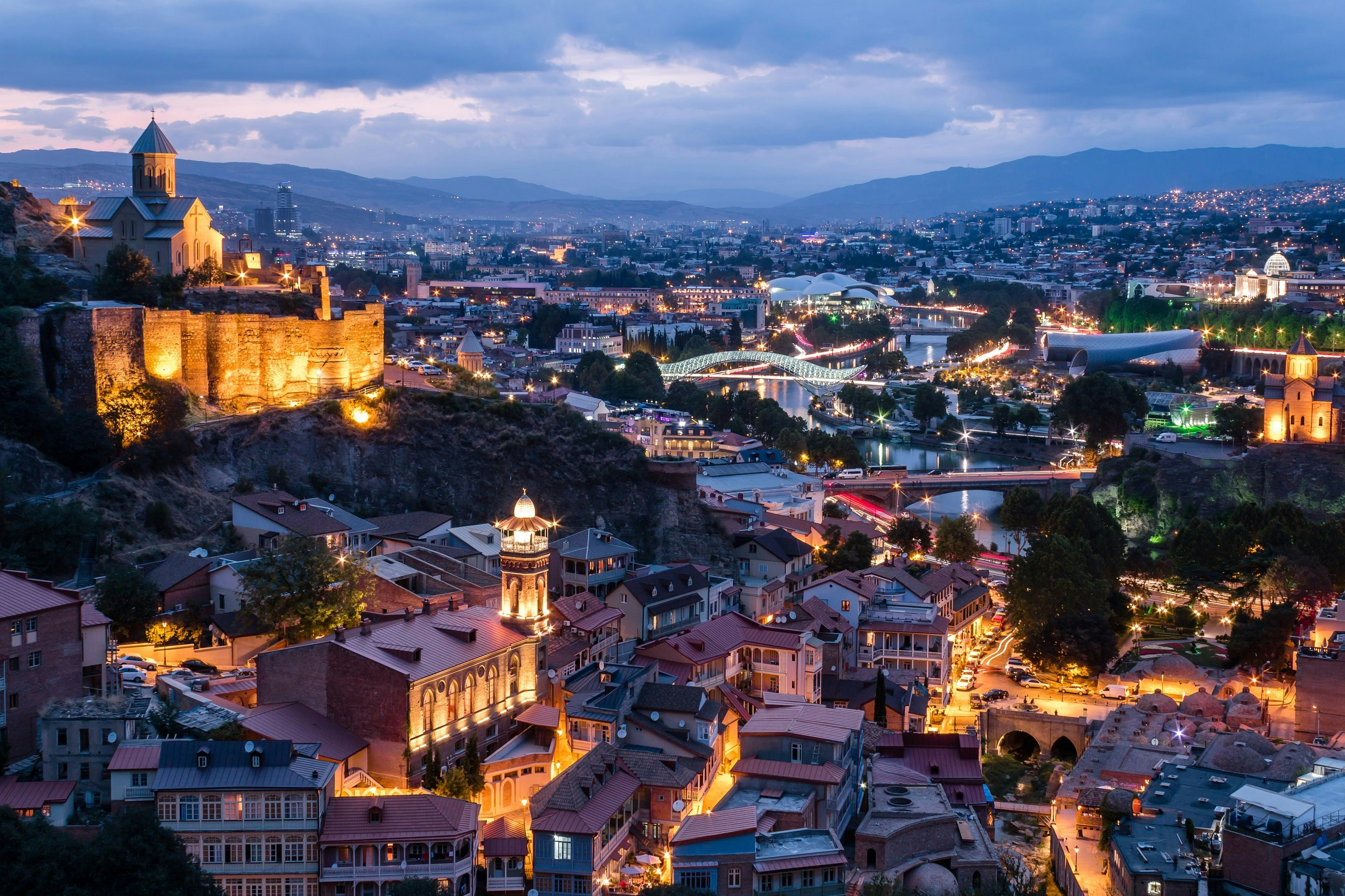
How to get to Georgia by plane
Despite being on the fringes of Europe, Georgia is relatively accessible from most parts of the world. The international airports at Tbilisi , Kutaisi and Batumi are served by numerous carriers – including the national airline, Georgian Airways . The most frequent flights are from Turkey and the Gulf States.
The easiest place to fly into is Tbilisi International Airport , which receives regular flights from cities in Western Europe and the Middle East. The list of budget airlines serving Georgia changes regularly, but Tbilisi and Kutaisi are the main budget hubs. The seaside resort town of Batumi is served by a handful of airlines, with regular flights to Turkey, Ukraine and the Middle East.
How to get to Georgia by land and sea
Georgia has one land border with Russia, close to Stepantsminda (Kazbegi) , with road transport on to the Russian town of Vladikavkaz. Turkey and Georgia share three land borders, of which Sarpi–Hopa near Batumi is the most frequently used, with easy onward travel along the Black Sea coast to Trabzon . Frequent passenger and cargo ferries transport visitors to Georgia's main ports at Poti and Batumi from destinations around the Black Sea.
Borders to Armenia (Sadakhlo–Bagratashen) and Azerbaijan (Red Bridge–Shikhli) are within an hour's drive of Tbilisi, allowing easy onward travel deeper into the Caucasus by bus, marshrutka (minibus) or rail. Night trains run daily to Baku , while overnight sleepers to Yerevan run daily from June to September, then every second day for the rest of the year. A rail link from Tbilisi to Istanbul in Turkey is under development, but currently, the section between Kars and Batumi must be completed by bus.
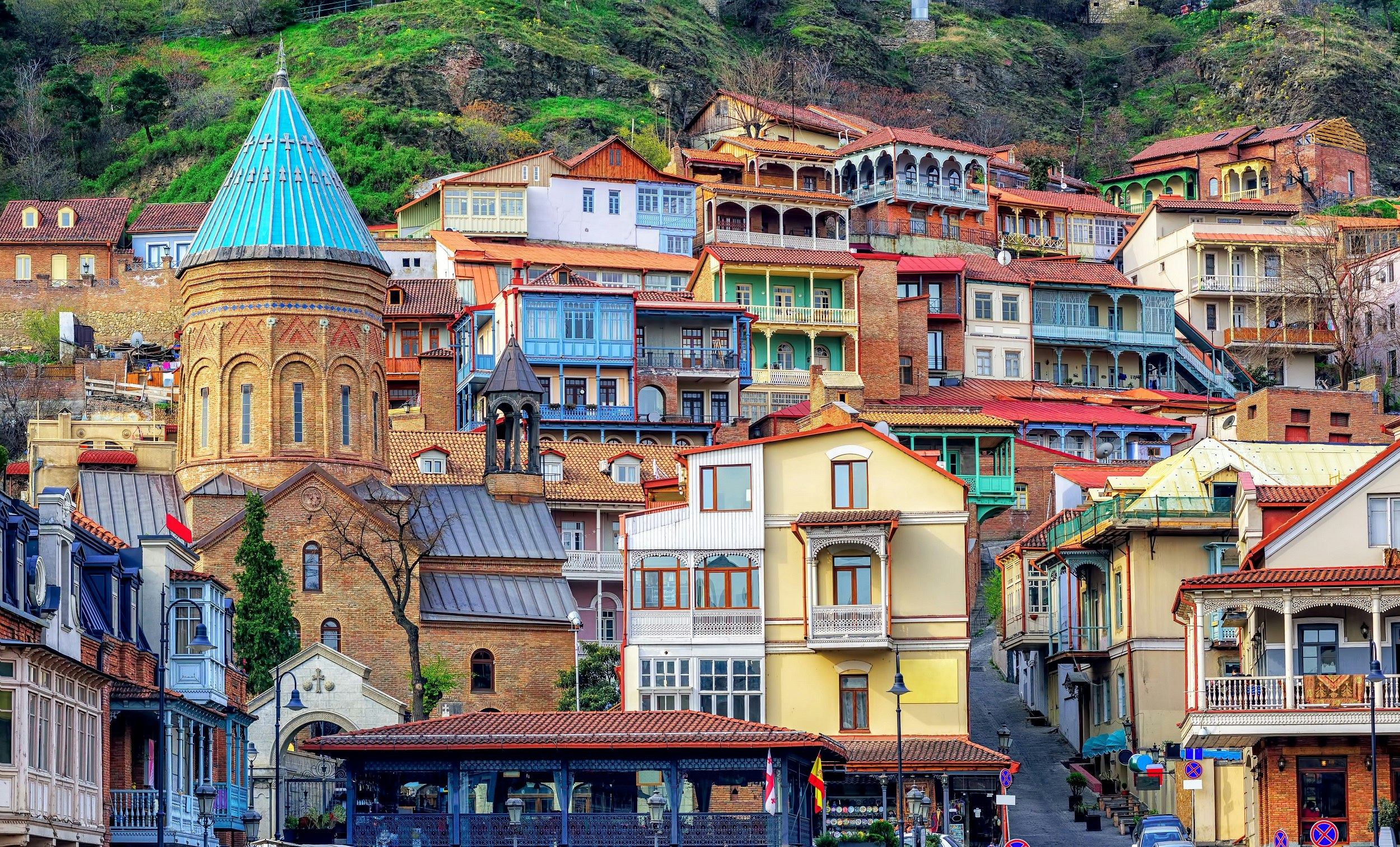
Getting around in Georgia's cities
Georgia's major cities have relatively well-organized public transport systems, though not much in the way of integrated public transport. Tbilisi is the only city with a metro; in the rest of Georgia, the primary means of transportation are buses and Russian-style marshrutky (minibuses).
Tbilisi's metro has just two lines, making it very easy to navigate. To explore the city, buy a Metromoney card from a metro-station ticket office and use it to pay for metro trips, city buses and marshrutky . City buses run on schedules displayed on digital boards at the bus stops, but m arshrutky run more often than buses, making them a favored means of transport for locals.
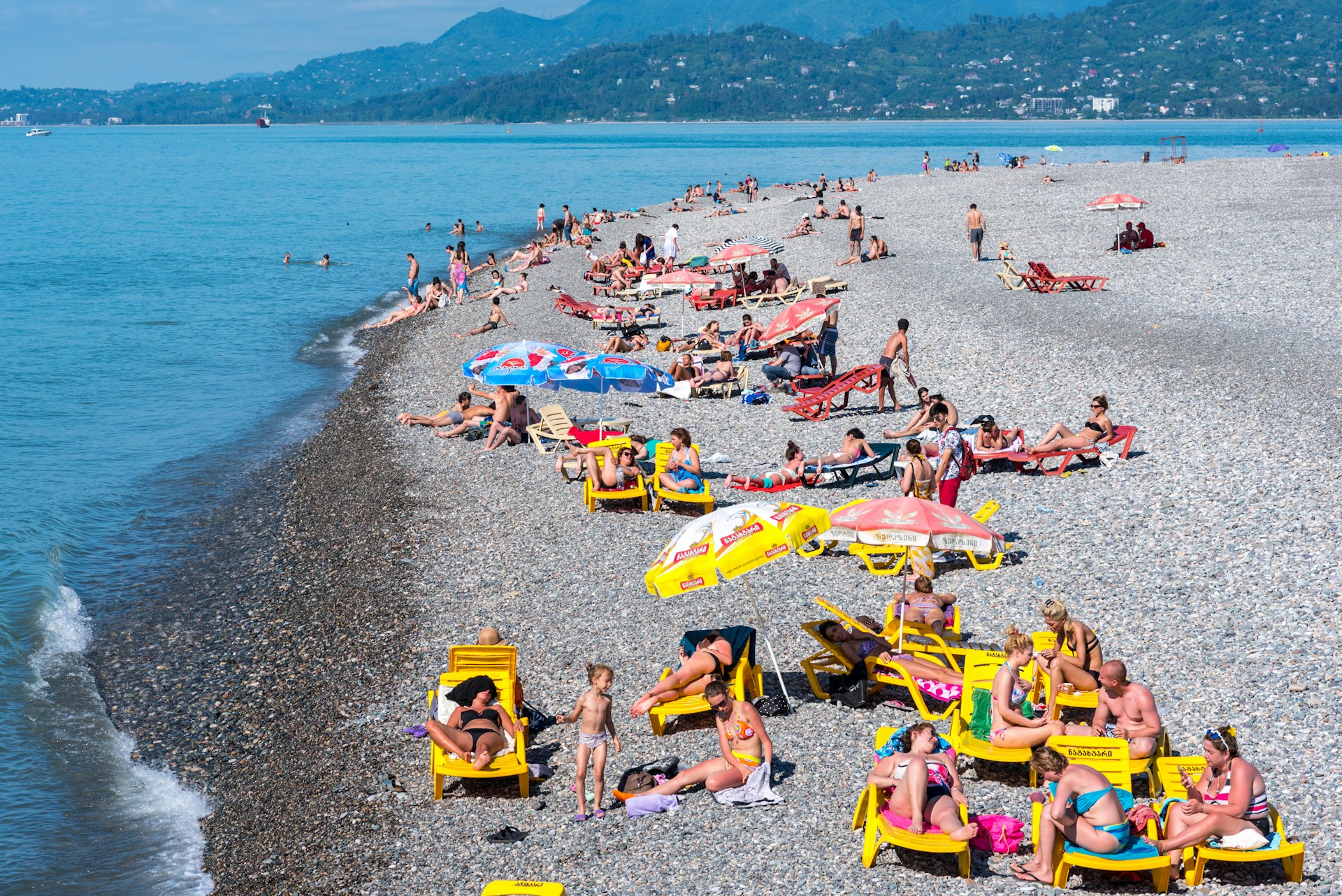
Traveling around Georgia
As well as being the backbone of public transport in cities, marshrutky are the most-used form of transport when traveling around the country. Services between major hubs run approximately every hour, depending on the destination. However, minibuses are the least comfortable option, with little legroom or space for luggage. In Tbilisi, Didube Bus Station has marshrutky going west, while vehicles going east depart from Navtlughi Bus Station.
Georgia also has a fairly well-organized train system, run by Georgian Railway . However, the network is only slowly being upgraded from Soviet times, and trains take longer to get to their destinations than marshrutky or buses. The only moderately fast train runs on the Tbilisi–Batumi route; book well ahead on this line in summer.

Money tips for Georgia
ATMs are widely available, easy to access and safe to use in cities and small towns in Georgia. The majority of businesses accept card payments, including hotels, convenience shops, restaurants, and pharmacies. However, if you're heading into the mountains or remote villages, be sure to take cash with you. US dollars and euros are the most useful currencies to carry as backup cash.
Travel costs in Georgia
Depending on how you choose to travel, Georgia can be either expensive or very budget-friendly. There are comfortable international hotel chains for those willing to spend a little more, but Georgia also has plenty of small boutique hotels, inexpensive guesthouses and apartments for rent. Tbilisi, Kutaisi and Batumi are particularly well stocked with accommodation. Renting a central apartment from Airbnb can cost as little as 100 GEL (US$35) a night, while a mid-range hotel room will cost from 40 GEL (US$15) upwards.
Georgia doesn't have any Michelin-star restaurants, but the national cuisine is feted as the best in the Caucasus, and there are plenty of opportunities to feast at all price ranges. For luxurious dinners, check out the best restaurants in Tbilisi or Batumi – dinner often comes with a spectacular panoramic city view. A meal in a high-end restaurant with a bottle of premium Georgian wine can set you back 100 GEL (US$35) or more, but eating at local restaurants will rarely set you back more than 20 GEL (US$7) for two courses.
The price of public transport in major cities can be as little as 1 GEL (US$0.34) for a local marshrutka ride. Tickets to travel around the country by marshrutka and bus vary depending on the destination; the ride between Tbilisi and Batumi costs around 30 GEL (US$10). Sightseeing is moderately priced as well – museum entry fees range from 3 GEL (US$1) to 15 GEL (US$5).

What to eat in Georgia
Georgian food is the original fusion cuisine , influenced by flavors from both Europe and Asia. The Georgian kitchen makes extensive use of local beef, lamb, pork and poultry, fresh fruits and vegetables, many kinds of bread, walnuts, cheeses and various spices that show the influence of neighboring Turkey and Russia. Vegetarians will find plenty of plant-based meals as well, though vegans may struggle with the widespread use of cheese.
Khinkali , boiled meat dumplings, are one of the national dishes of Georgia and a firm favorite meal for locals and visitors. Another must-try treat is khachapuri , a pizza-like cheese pie that is similar to a Turkish pide ; every region has its own version. Another staple is mtsvadi – grilled pork or beef chunks on a skewer – which plays an obvious nod to Russian shashlik , Turkish shish kebabs and Greek souvlaki .
To lighten your lunch or dinner, order pkhali, a simple but healthy tomato and cucumber salad with a walnut and vegetable paste. Spinach, eggplant, beetroot leaves and cabbage are also common ingredients in pkhali . As a snack to munch while exploring, seek out churchkhela , nuts preserved in a chewy confection made from grape juice.
Georgian wine is famous across the region, and it's well worth sampling local vintages from the Kakheti region when you come. Be sure to try qvevri wines, which are generally organic and unfiltered and have a very distinctive taste. For something stronger, chacha is a traditional Georgian spirit made from fermented grape skins, and it makes a nice break from the ubiquitous vodka. Last but not least, try Borjomi, a salty mineral water that was the beverage of choice for every Soviet leader from Lenin onwards.

Get to know Georgian culture
When traveling to a new country, it's always helpful to know a few words in the local language, and Georgia is no exception. The Georgian language has only around 4 million speakers, and knowing essential words such as gamarjoba (hello) and madloba (thank you) will get you a warm smile of appreciation from the locals.
Georgians are known for their hospitality. A guest for Georgians is "a gift from God," so don't be surprised if a stranger you met an hour ago invites you home for dinner with their family. If you choose to go, go hungry; the host will insist you eat every dish on the table and drink as much wine as you possibly can.
Georgia is still a traditional country when it comes to social mores. Very short skirts or dresses, off-the-shoulder tops, and skimpy or see-through clothes are likely to attract a stare. When entering churches, women should cover their heads and shoulders (some churches will provide scarves for this, but it's better to bring your own). Skirts and shorts (for men and women) should cover the knee. Men should also ensure shoulders are covered and ideally wear trousers rather than shorts.
You might also like: Tower-house trails: trekking in Georgia Tbilisi's top 10 experiences A guide to food in Georgia, the original fusion cuisine
This article was first published March 2020 and updated February 2022
Explore related stories
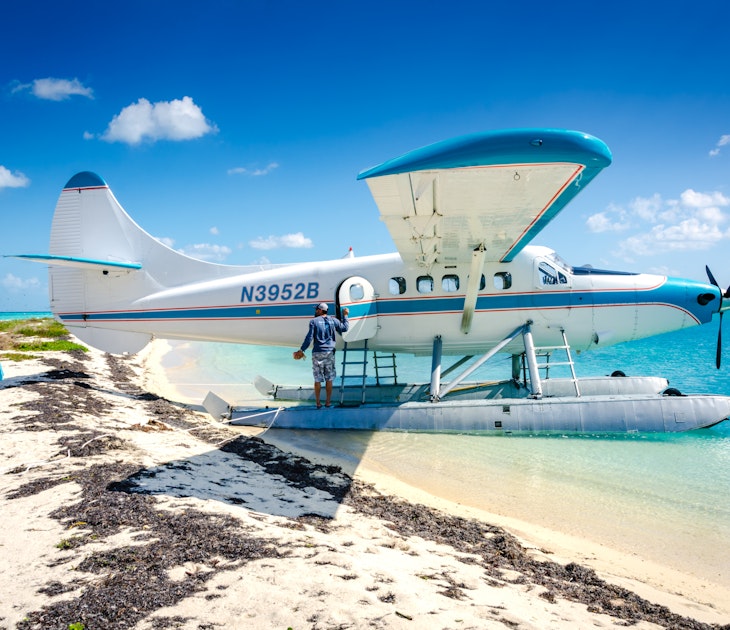
Destination Practicalities
Apr 7, 2024 • 6 min read
Whether you crisscross the state by plane, hop on a train along the southwest coast or Key-hop via water taxi, there are many ways to get around Florida.

Apr 5, 2024 • 6 min read

Apr 4, 2024 • 5 min read

Apr 2, 2024 • 8 min read

Mar 30, 2024 • 4 min read

Mar 30, 2024 • 5 min read

Mar 27, 2024 • 6 min read

Mar 25, 2024 • 8 min read

Mar 24, 2024 • 7 min read

Mar 22, 2024 • 4 min read
- Why Georgia
- Destinations
- Things To Do
- Nature & Adventure
- Useful Info
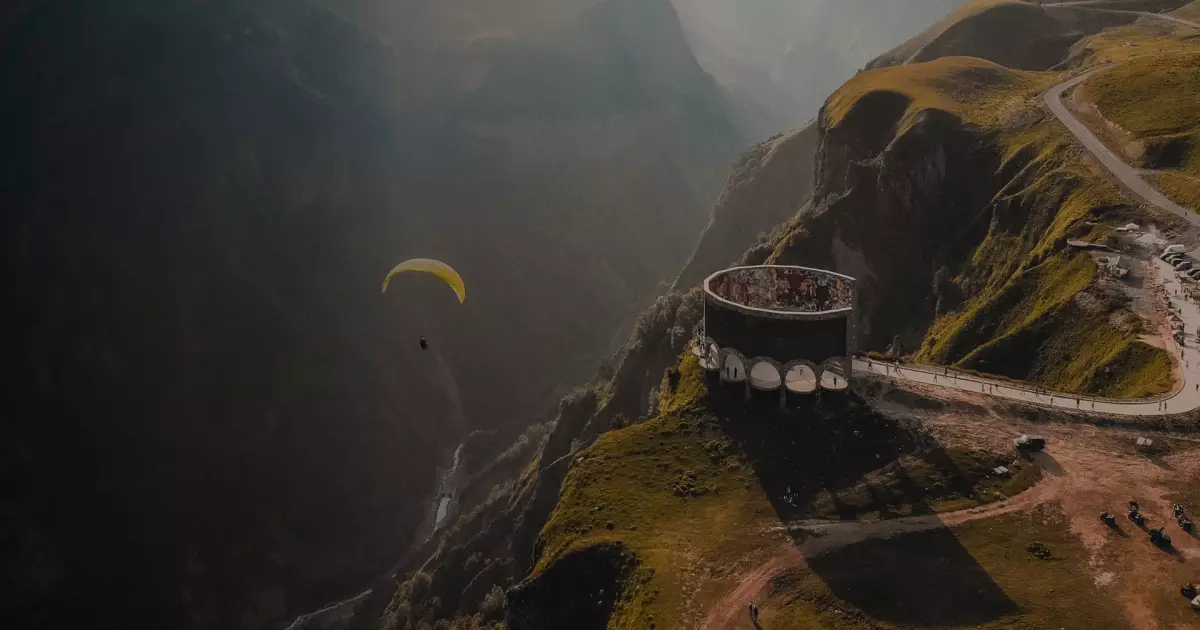
Discover Unique Georgia
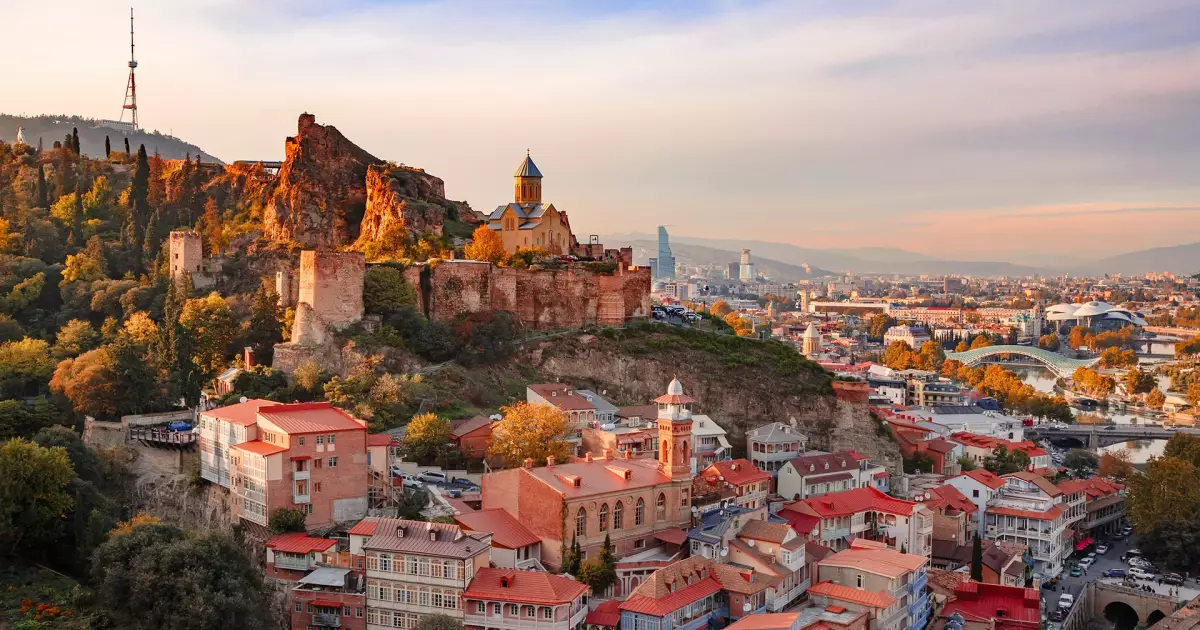
Tbilisi - The Capital of Georgia

Kakheti - Region in Eastern Georgia

Sea, mountains, resorts and culture in one place . We’ve got you covered.
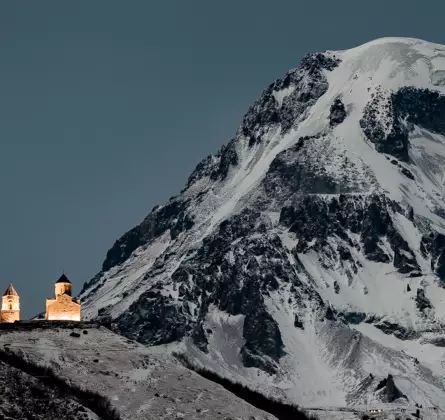
A Taste of Georgia, Literally...

Wander-Lush
How to Visit Georgia the Country in 2024: The Ultimate Georgia Travel Guide
- The Caucasus
Everything you need to know to visit Georgia in 2024, including up-to-date city and regional guides, insider tips, and a wealth of resources collected from my Georgia travel blog.
Last updated: January 2024
If Georgia (the country) features on your travel wish list, then I have good news for you: There has never been a better time to visit Georgia!
This small but mighty nation in the South Caucasus strikes an almost perfect balance between convenience and a sense of adventure. You can get around Georgia with relative ease while still feeling (at times) like you’re well and truly off the beaten path and experiencing something few other travellers before you have.
If there’s one thing I’ve learned during my time travelling Georgia and living in Tbilisi, it’s that everyone has their own experience of Georgia. Many people (myself included) fall in love and end up moving here.
I love Georgia to bits, but I also have a realistic understanding of the ups and downs involved with travelling here. Since I started writing my Georgia travel blog back in 2017, I’ve always tried to paint a full and honest picture.
This Georgia Travel Guide brings together all my knowledge and experience. I cover everything from transport logistics, safety and budgeting to cultural etiquette and responsible travel tips.
Please note: This page contains affiliate links, meaning I may earn a commission if you make a purchase by clicking a link (at no extra cost to you). Learn more .
Visiting Georgia in 2024
Georgia is open to tourists . There are no longer any special restrictions or entry requirements for Georgia.
This Ministry of Foreign Affairs page is updated regularly to reflect any developments and should be your first point of reference for official advice.
If you have questions about Georgia, please don’t hesitate to leave a comment or email me directly. If you’d like some feedback on your Georgia itinerary or you need assistance planning your trip, please see my Itinerary Planning Page .
Georgia travel blogs
All my 100+ Georgia travel blogs, stories and guides, organised by theme/geography. Each link opens in a new tab so you can bookmark the pages you want to come back to later.
Featured Georgia guides
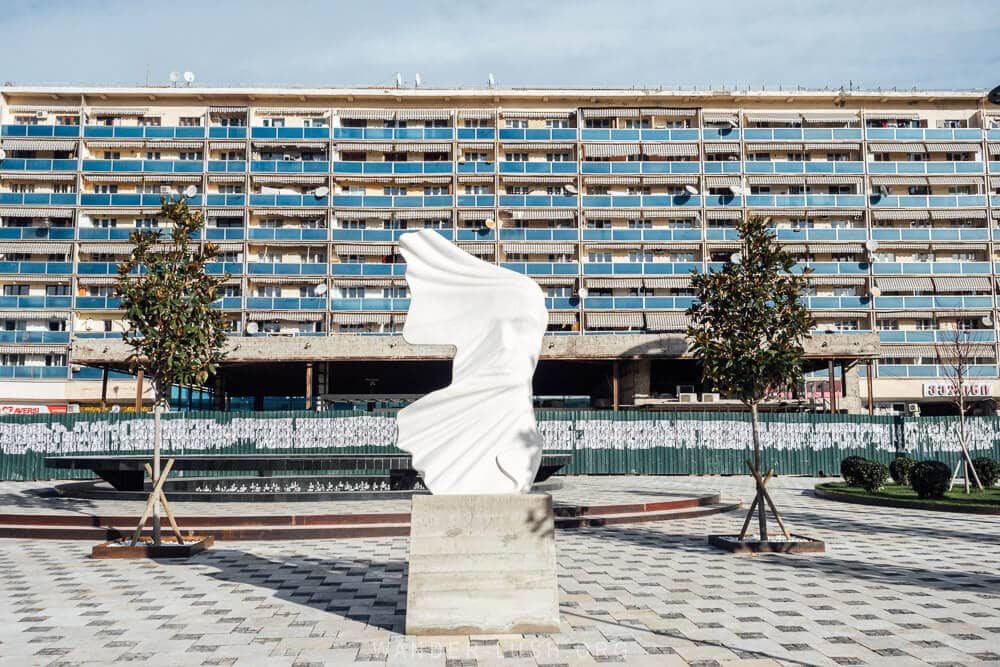
What’s New in Georgia in 2024: New Openings, Trending Destinations & Travel Predictions
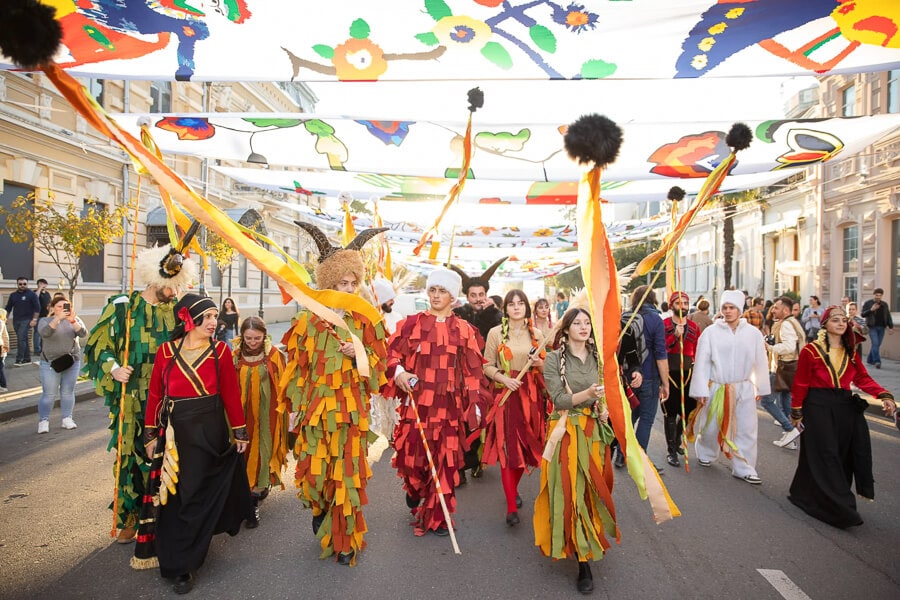
2024 Georgia Calendar: Festivals, Holidays & Milestones to Plan Your Trip Around
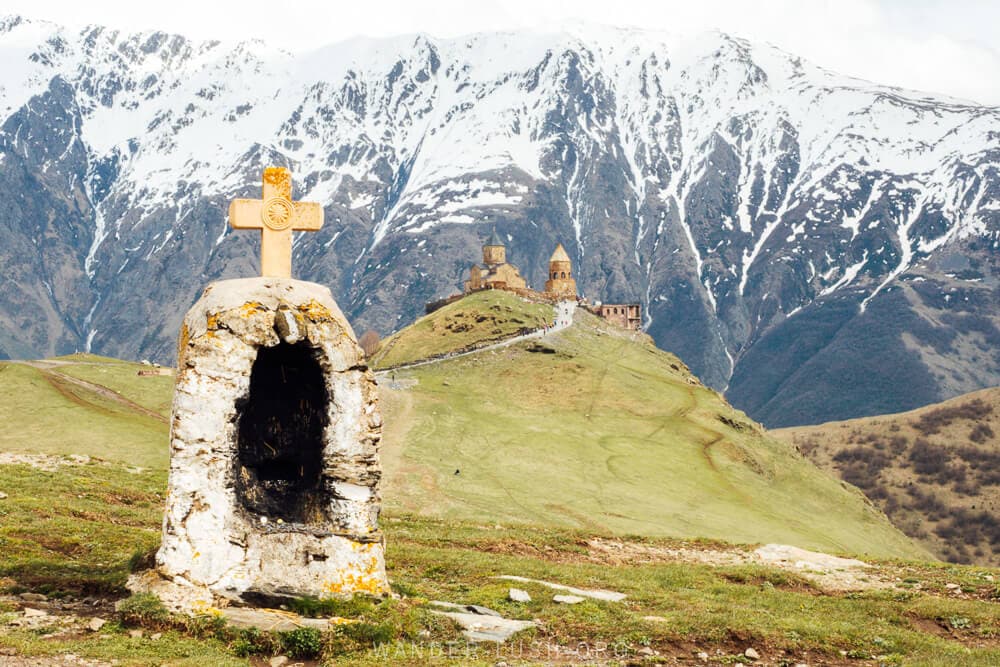
The Ultimate Georgia Itinerary for 2024: How to Spend 1-4 Weeks in Georgia
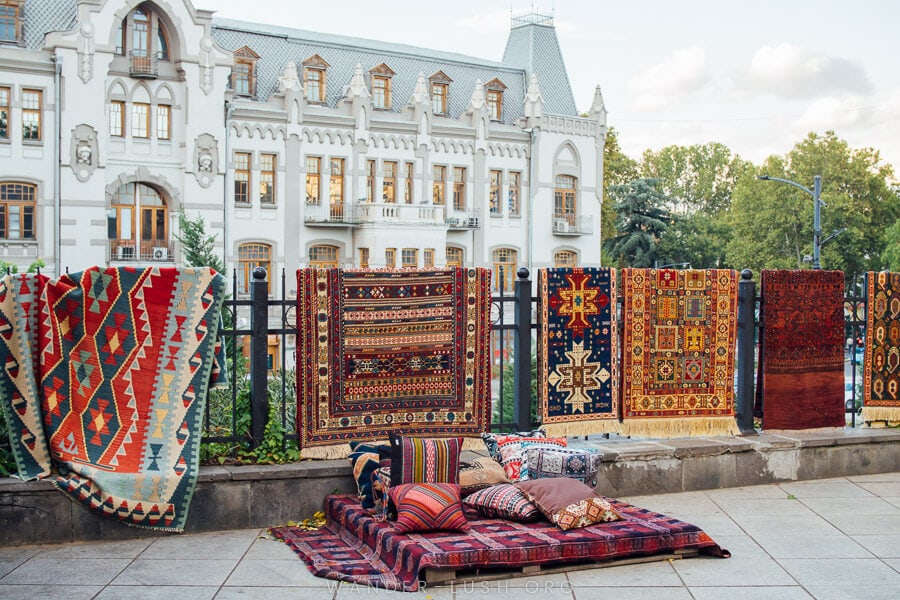
52 Unique Things to Do in Tbilisi: The Ultimate Guide
Popular destinations.

- Unique things to do in Tbilisi
- Best restaurants in Tbilisi
- Best bars in Tbilisi
- Where to stay in Tbilisi
- Detailed guide to visiting the Tbilisi Sulfur Baths
- Where to see live folk music & dance in Tbilisi
- How to visit the Chronicles of Georgia monument

- Kutaisi city guide & 3-day itinerary
- Hidden gems in Kutaisi
- Where to stay in Kutaisi
- Best restaurants in Kutaisi
- How to travel between Kutaisi and Tbilisi
- Chiatura day trip
- Tskaltubo day trip
- Canyons & caves day trip
- Vani Sulfur Pool day trip
- Tskhrajvari day trip
- See all Kutaisi Guides →

- Batumi city guide
- How to get to Batumi from Tbilisi
- How to get to Batumi from Kutaisi
- Batumi Botanical Garden
- Batumi street art guide
- Staying at Kartuli, Batumi’s best hotel
- See all Batumi Guides →

Kakheti Wine Region
- Detailed Kakheti Wine Region guide & itinerary
- How to get to Kakheti from Tbilisi
- Best Kakheti day tours from Tbilisi
- Telavi city guide
- Best hotels & wine chateaux in Kakheti
- Where to celebrate the Rtveli wine harvest in Kakheti
- Visiting Vashlovani National Park
- Guide to Big Shiraki, abandoned Soviet airbase
- Things to do in Dedoplistskaro
- See all Kakheti Guides →
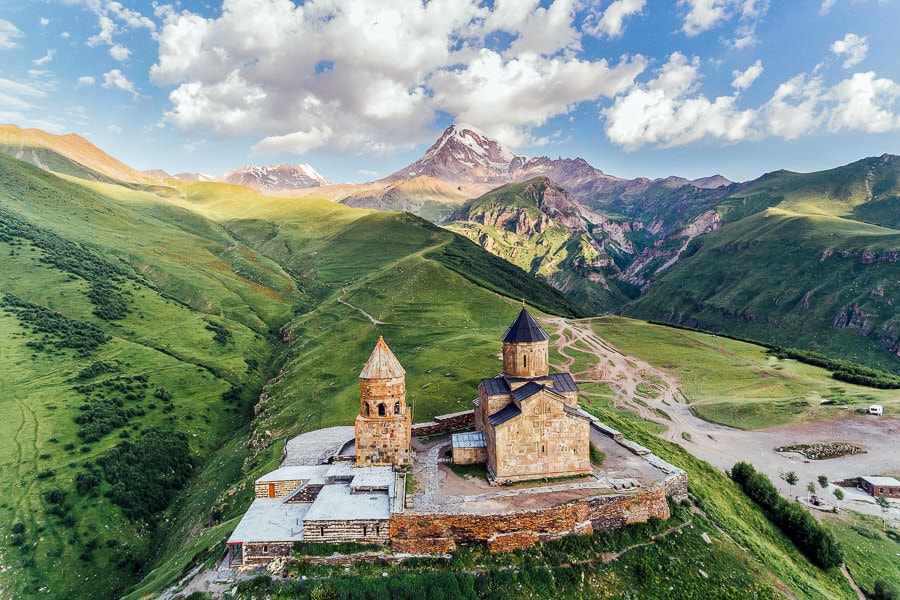
- Detailed Kazbegi travel guide
- How to get to Kazbegi from Tbilisi
- Where to stay in Kazbegi
- Gergeti Trinity Church Hike
- Where to stop on the Georgian Military Highway
- Visit the the Giant Head Sculptures in Sno village
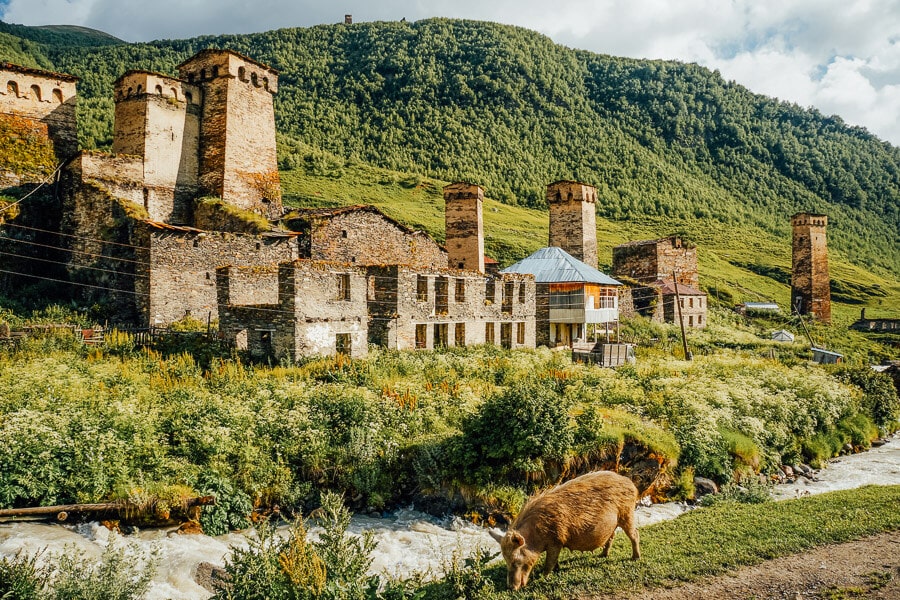
Caucasus mountains
- Kazbegi, Svaneti & Tusheti regions compared
- How to get to Mestia (Svaneti)
- Guide to Tusheti, Georgia’s most remote mountain region
- How to get to Tusheti
- Guide to Racha, Georgia’s alternative mountain region
- Where to go skiing in Georgia
- How to get to Gudauri from Tbilisi
Explore Georgia by region
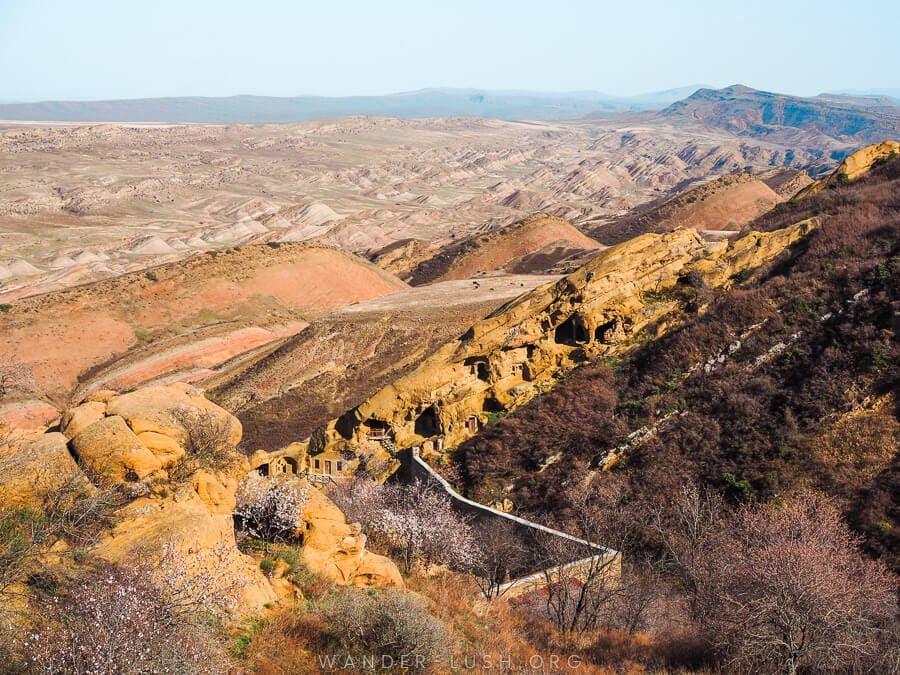
Eastern Georgia
- Mtskheta day trip guide
- What to expect from the Stalin Museum in Gori
- Gori city guide
- Uplistsikhe Cave City
- David Gareja Cave Monastery
- Homestays & Kist culture in Pankisi Valley
- Nazy’s Guest House
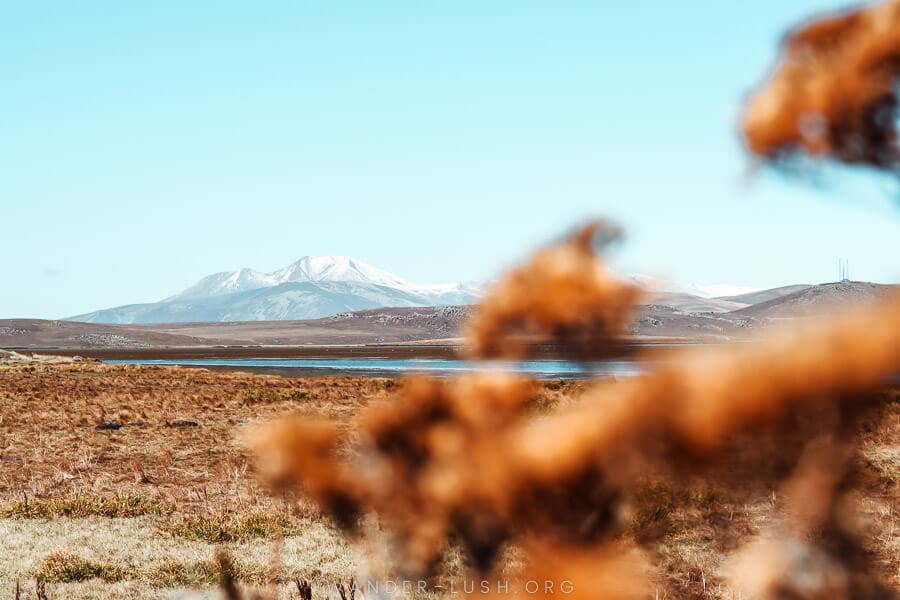
Southern Georgia
- Complete guide to Borjomi
- Vardzia Cave City
- Rabati Castle
- Akhaltsikhe city guide
- How to get to Vardzia
- Guide to Abastumani
- Guide to Meskheti region
- Guide to Tsalka & Javakheti
- Shaori Fortress hike
- Guide to Kvemo Kartli region
- Didgori Battle Memorial
- How to get to Bakuriani from Tbilisi

Western Georgia
- Zugdidi city guide
- Guide to Ozurgeti & Guria, Georgia’s tea region
- Things to do in Zestafoni
- Guide to visiting Martvili Canyon
- Guide to visiting Sairme
- Guide to visiting Sachkhere
- Guide to visiting Kobuleti
- Guide to visiting Poti
- Kolkheti National Park
- Nokalakevi Fortress & hot springs
- Machakhela Protected Areas
- Glamping Tago in Upper Adjara
- Sarpi & the Turkish border
- Guide to the Gonio Cross hike
Plan your trip to Georgia
Here are a few of my favourite resources for travel planning in Georgia.
Georgia travel resources
My best Georgia travel tips and trip planning resources.
Where to go in Georgia
- 40+ places to visit in Georgia
- 15 best day trips from Tbilisi
- 10 best day trips from Batumi
- 6 best day trips from Kazbegi
- 7 best day trips from Borjomi
Itinerary ideas
- Georgia itinerary for 1-4 weeks
- Adventurous Georgia road trip itinerary
- Georgia Azerbaijan itinerary
- Caucasus itinerary
Seasonal guides
- Best time to visit Georgia: month-by-month comparison
- Where to go in Georgia in spring
- Where to go in Georgia in autumn
- Where to go in Georgia in winter
- Tbilisi in summer
- Tbilisi in autumn
- Tbilisi in winter
- Tbilisi in spring
- Where to see wildflowers in Georgia
- Snow in Tbilisi
- Christmas & New Year in Tbilisi
- Orthodox Easter in Georgia
- Kutaisi in winter
Essential travel tips
- 23 travel tips for Georgia
- Georgia safety advice
Responsible travel in Georgia
- Georgia travel budget tips
- Georgia packing list
- Where to buy a SIM card
- Where to store luggage in Tbilisi
Getting around
- How to get from Tbilisi airport to the city
- How to get from Kutaisi airport to the city centre
- How to get from Batumi airport to the city centre
- Tips for using taxis in Tbilisi
- Using GoTrip for budget-friendly transfers around Georgia
- Beginner’s guide to using marshrutka vans in Georgia
- Tips for hiring a car & driving in Georgia
- How to use the trains in Georgia
Special accommodations
- Best guesthouses in Georgia
- Best nature cabins in Georgia
- Glamping tents in Georgia
- Best boutique hotels in Tbilisi
- Best hostels in Tbilisi
- Fabrika Tbilisi
- Karma Hostel Martvili
- Lost Ridge Inn Sighnaghi
- Radisson Tsinandali (Kakheti)
- Tskaltubo Spa Resort
Georgian food
- 50 best restaurants in Tbilisi – the ultimate Tbilisi foodie guide!
- Top 10 Khinkali restaurants in Tbilisi →
- Where to eat breakfast in Tbilisi
- Bets cafes & coffee in Tbilisi
- Tbilisi restaurant etiquette
- Traditional Georgian desserts
- Traditional Georgian drinks
- Vegetarian Georgian dishes
- Meskhetian regional cuisine
Georgian wine
- Tbilisi wine guide – best bars, shops & degustations
- Best wineries in Kakheti
- Best wineries in Imereti
- Visiting Baia’s Wine near Kutaisi
Nature & outdoors
- Hiking in Tbilisi
- Best national parks in Georgia
- Hot springs in Georgia
Handicrafts & culture
- Best Georgian souvenirs & Tbilisi shopping guide
- Georgian designers & labels
- Live music & folk dance in Tbilisi
- Lelo Burti festival in Guria
- Textile lover’s guide to Georgia & the Caucasus
- Visit carpet & felt-makers in Kakheti region
- Visit a clay Qvevri workshop in Imereti
- Visit a pottery studio in Zugdidi
Georgia Travel Guide
This comprehensive travel guide will show you how to plan a trip to Georgia from start to finish. Structured around commonly asked questions, it offers stacks of practical tips and advice – including plenty of insider information you won’t find in any guidebook.
This guide is long and in-depth, so get ready! If you make it all the way to the end I promise you’ll come out the other side feeling more than fully prepared for your trip.
If you don’t have time to read everything or you’re already part-way through your planning, feel free to skip ahead using the links below.
Table of contents
Use these itineraries to start planning your adventure:.

Where is the country of Georgia? Is Georgia in Europe or Asia?
Georgia is located in the South Caucasus or Trans-Caucasus region between the Greater and Lesser Caucasus mountains. It borders Russia to the north, Turkey to the south-west, Armenia to the south, Azerbaijan to the south-east, and the Black Sea to the west.
That’s the easy part. The second question, ‘Is Georgia in Europe, or is Georgia in Asia?’, is a little more complicated. The response you get depends on who you ask. Georgia is technically part of the Asian continent but to me, it feels more like Europe than Asia. For the most part anyway.
Georgia’s connection to Western Europe goes back to Hellenistic and Roman influences. After the fall of Constantinople, Georgia was seen as ‘the last outpost’ of the Christian world. Today, the country’s gaze is fixed even more resolutely westward, and Georgia aspires to join NATO and the EU. One of my favourite anecdotes on this topic is when Georgian politician Zurab Zhvania famously uttered, “I am Georgian, therefore I am European” when addressing the European Council in 1999.
Georgia is a crossroads country and has always toed the line. As one historian explained it to me, Georgians were humble and knew they needed to understand both worlds in order to thrive. Shota Rustaveli, the country’s literary hero, was well versed in both Christian literature and Sufi mysticism, for example. On a broader level, these forces combined to produce a unique worldview that influenced everything from Georgian poetry to the electric architecture in Tbilisi Old Town.
As an outpost on the Silk Road trading route , it benefited from centuries of cross-pollination – of religions, cultures, traditions and foods. Georgia took this heady broth of influences and added a pinch of something else to make it its own. The language, cuisine, architecture and spiritual traditions are distinctly, unmistakably Georgian.
One of the joys of getting to know Georgia is grappling with these beautiful contradictions and complexities. Not quite Asia, not quite Europe, Georgia doesn’t fit neatly into either category but rather makes its own rules.
Interesting facts about Georgia
- The country’s official name is Georgia, but to locals it’s known by its Georgian name, Sakartvelo .
- By area, the country of Georgia is almost half the size of the US state of Georgia . With a population approaching 4 million (more than a quarter of whom live in Tbilisi), Georgia has less than half the number of people than the state.
- Georgia was the second state to adopt Christianity as its official religion (the first was neighbouring Armenia). Today the country is predominantly Orthodox Christian and the church plays a very important role in modern society.
- Present-day Georgia was one of the first places where hominins settled out of Africa . In 2000, archaeologists discovered the earliest well-dated hominin fossils in Eurasia – at least 1.8 million years old – at Dmanisi in Kvemo Kartli region.
- Georgia is home to four UNESCO World Heritage Sites : Gelati Monastery, the Historical Monuments of Mtskheta, Upper Svaneti, and its newest listing, the Colchic Forests and Wetlands. Bagrati Cathedral was removed from the register in 2012 (when you visit, you’ll see why).
- Georgia is home to Europe’s highest continuously inhabited village , Bochorna (2,345 metres above sea level) in Tusheti region. Just one man, Doctor Irakli Khvedaguridze, lives there through the winter.
- Georgia is part of the Trans-Caucasus, which is considered one of the most linguistically diverse areas in the world . Not only do Georgia’s mountains offer spectacular views and hiking, they also hold beautiful cultures, customs and cuisines.
- There are more than 250 varieties of artisanal cheeses in Georgia , most of them native to the mountain regions and pastoral areas of Imereti and Adjara.
- Georgia earned the nickname ‘the Cradle of wine’ after archaeologists unearthed the earliest evidence of a winemaking tradition in southern Georgia (grape seeds and residue that are 8,000 years old).
- Georgia has a national holiday for self-care. Bedoba, celebrated every year on January 2, is a ‘day of luck’ that sets the tone for the year to come. It’s a time to do your favourite things – like drink wine and eat cheese!
Why visit Georgia?
Georgia is intriguing – but you don’t fork out for a plane ticket just because a country has an unusual location or it’s the star of trivia night.
Tourism in Georgia has been on the rise in a big way lately, so much so that it’s hard to pick up a travel magazine or scroll through a ‘top destinations’ list without seeing mention of it. The Caucasus region is having a moment, and Georgia is the centrefold.
What is it that draws so many people to visit Georgia? And more importantly, what is it that makes so many people come back again and again? Here are just some of the things that make Georgia special.
They spoke of Georgians as supermen, as great drinkers, great dancers, great musicians, great workers and lovers. And they spoke of the country in the Caucasus and around the Black Sea as a kind of second heaven. John Steinbeck
- The landscapes. In Soviet times, it was said that citizens who lived virtuous lives would be rewarded with an eternity not in heaven, but in Georgia. Even if you’ve never laced up a pair of hiking boots in your life there are countless ways to enjoy Georgia’s natural beauty, from bathing in open-air hot springs to sleeping in village homestays.
- The cities. Beginning with Tbilisi, a city that bristles with creative energy and bubbles with history (quite literally – there’s hot springs right in the centre of town). Every city has its own character. I love them all.
- The food. Beyond the usual suspects Khinkali and Khachapuri , Georgian cuisine is a parallel universe of flavours and textures you likely haven’t ever encountered before. From regional cuisines such as Megrelian and Rachan to hearty mountain fare and Tbilisi chefs who put their modern spin on the classics, this country is nothing if not a tastebud pleaser.
- The wine. Georgia’s natural wine renaissance has put it on the international map. Qvevri wines made in shapely clay vessels, including full-bodied Saperavi and skin contact amber (or orange) wines, are the most well-known. I can’t think of another place where wine is so deeply intertwined with history and tradition.
- The legendary hospitality. Georgians are known for treating their guests like kings and queens and in my experience, people really are as generous as they’re made out to be. It’s not at all hard to connect with people on a meaningful level. You will never be lonely in Georgia.
- The history. Fair to say Georgian history is lesser-known outside the region. Every castle, monastery, fortress and cave city offers a hands-on history lesson. I find the myths and legends particularly fascinating.
- The Soviet throwbacks. Architecture buffs and urbexers alike are drawn to Georgia because of the Soviet connection. If you’re a fan of Brutalist architecture, abandoned buildings and Soviet-era mosaics, you will love Georgia.
- That other thing I can never put my finger on. There’s an atmosphere, an aura about Georgia that makes it unlike any other country I’ve been to. Part of it, I think, has to do with the country’s turbulent past and ongoing struggles, and the way people have held onto their identity and independence so fiercely through it all. It’s hard to describe, but I hope you understand what I mean after you’ve been around it yourself.
Incredible cuisine, an ancient wine culture, unparalleled mountain landscapes, fascinating cities, old-fashioned hospitality – Georgia has it all and then some.
Georgia highlights: Video
At the start of 2022, I made this short film to celebrate my 2-year Georgia anniversary. It showcases some of my most memorable travel experiences to date.
When is the best time to visit Georgia?
Overall best time to visit Georgia: Late spring or autumn.
The weather in Georgia varies quite dramatically depending on where you go, but the country’s climate is quite mild overall. Generally speaking, the best time to visit Georgia is in either late spring (late April to early June) or autumn (mid September to late October) . These months promise milder temperatures, ideal conditions for outdoor activities and hiking, and a range of cultural festivals and religious celebrations .
Georgia in summer
Good for: Beaches & summer festivals.
Summer (especially July and August) is Georgia’s peak season and by far the busiest time of year for tourism. Resorts along the Black Sea Coast operate at full capacity, and Georgia’s major cities swell to double or triple their off-season size.
Prices for accommodation and tours increase in-line with demand, and it can be more difficult to buy train tickets, for example, as domestic tourism also peaks.
The summer months are most suitable for mountain hiking and lounging on Georgia’s beaches . However, the stifling hot weather in Tbilisi especially (but also in Kutaisi and Batumi) means it’s not the most pleasant time of year to visit the cities.
One major advantage of travelling in summer is that mountain roads (including the Abano pass to Tusheti) are all but guaranteed to be open.
- Read next: How to beat the summer heat in Tbilisi .
Georgia in autumn
Good for: Wine & culture.
Georgia’s high season typically extends to September, but crowds start to dissipate as soon as the weather starts to cool off. The autumn months (September to early November) are a great time to visit Georgia, especially if you’re interested in wine.
The annual grape harvest ( Rtveli ) takes place in September/early October. This is traditionally a time of feasting, festivities and fun, especially in Eastern Georgia’s Kakheti region, the main grape-growing hub. Tbilisoba , Georgia’s biggest cultural festival , takes place in Tbilisi every October.
- Read next: Where to go for the Rtveli wine harvest .
Milder temperatures, scarce rainfall and colourful fall foliage make autumn a great time for hiking and outdoor activities, too.
- Read next: Where to go in Georgia in autumn for fall colours & festivals .
- The best things to do in Tbilisi in autumn .
Georgia in winter
Good for: Quieter cities, Christmas festivities & winter sports.
Tbilisi in December or January is relatively mild compared to other cities in the region; but winters are extremely harsh in Georgia’s mountainous areas. Some remote villages are completely closed off. The Black Sea coast and Batumi empty out over winter, although most businesses remain open.
Aside from the parched landscape and air pollution (a growing problem in Tbilisi), winter can be a very nice time to travel in Georgia, especially in December when blue-sky days are common.
- Read next: The best things to do in Tbilisi in winter .
Orthodox Christmas and New Year celebrations (both of which fall roughly a week after their Roman calendar counterparts) give the streets of Tbilisi a festive atmosphere. Georgia’s ski season normally starts in late December and runs through to late April. Resorts in Gudauri and Bakuriani are busy throughout January and February.
Georgia in spring
Good for: Hiking, food & festivals.
Spring, especially late April and May, is one of my favourite times to be in Georgia. Winter usually lingers until Orthodox Easter (mid-April). After that, temperatures warm up, wildflowers and cherry blossoms come into bloom, and conditions are perfect for mountain hiking.
Spring wine, spring produce, and spring celebrations, including the New Wine Festival in Tbilisi, help Georgia thaw out from the cold. Crowds are much sparser than in summer, with the exception of the Nowruz holiday (usually mid-March), which usually sees an influx of visitors from Iran and Azerbaijan.
The downside of travelling in spring is that you may have to contend with heavy rainfall , as May is the wettest month of the year in Tbilisi.
- Read next: The best things to do in Tbilisi in spring .
Visa requirements for Georgia
This section provides a broad overview only. For up-to-date visa information or specific advice about your circumstances, please refer to the Ministry of Foreign Affairs of Georgia website .
One year visa-free
Georgia has an extremely generous visa exemption policy. Currently, passport holders from 98 countries (including the EU, Australia, the US and the UK) are permitted to stay in Georgia for up to a year without a visa.
Better still, under the waiver scheme you’re allowed to work (keep in mind that you automatically become a tax resident of Georgia after 183 days in-country), start a business, open a bank account, apply for temporary residency, and even buy property.
Because this is a visa exemption , the visa-free period can easily be ‘reactivated’ by crossing the border and re-entering on a new stamp. This may change in the future but for the time being, if you have the right passport and are prepared to travel once a year, you can legally stay in Georgia for as long as you like.
E-visa & Georgia visa on arrival
Passport holders from an additional 65-plus countries are eligible for either a 30 or 90-day tourist e-visa, which you can get online before you arrive.
- Click here to check if you need a visa for Georgia and to apply for an expedited e-visa through my partners at iVisa.
Other requirements to enter Georgia
To enter Georgia, you might also be required to have the following:
- A passport that’s valid for the intended duration of your stay (or for 3+ months if you’re entering on a visa)
- Proof of insurance for the duration of your stay
- Proof of onward travel (i.e. a return airfare)
Anecdotally (and in my personal experience), those travelling under the visa exemption are rarely asked to present proof of onward travel or travel insurance at Georgian immigration.
If you are travelling on a tourist visa, I strongly recommend you follow the requirements to a T.
Travel insurance for Georgia
Overall, Georgia is an incredibly safe place for tourists, but I definitely recommend taking out a travel insurance policy before you arrive . This is particularly important if you plan on going to the mountains to hike or ski.
Travellers are sometimes required to show proof of travel insurance when boarding a flight to Georgia or at immigration upon arrival.
Standard travel insurance policies cover all of Georgia except Abkhazia and South Ossetia. If you plan on traveling to Abkhazia (entry to South Ossetia is not currently permitted from the Georgian side), then it’s highly recommended to take out a specialised insurance policy that will cover you for emergencies. Note that there are no consular support services in Abkhazia.
- Inquire about a policy with Hey Mondo , my preferred provider for single and multi-trip travel insurance (get 5% off when you book using my link).
How to get to Georgia
Flying to georgia.
Georgia has three international airports in Tbilisi, Kutaisi and Batumi. There are direct flights to Georgia from 40 cities in Western and Eastern Europe, Central Asia, and the Middle East.
Budget carrier Wizz Air operates direct flights to Kutaisi from cities in Germany, Greece, Italy, Poland and elsewhere in Europe. Most schedules are limited to 2-3 flights per week. Batumi Airport hosts flights from Turkey and Belarus.
Tbilisi International Airport, Georgia’s main hub, is serviced by Qatar Airways (via Doha ), Turkish Airways (via Istanbul ), FlyDubai, Lufthansa (via Munich), AirAsia X (via Bangkok), and the national carrier, Georgian Airways (via Western Europe, Israel and Ukraine).
How to get from Tbilisi Airport to the city
There are several options for travelling into the city from the airport: City bus 337, taxi or private transfer. I recommend you avoid taking an airport taxi unless you’re booking it through an app.
- For a full breakdown of the different options, see my Tbilisi Airport Guide .
How to get from Kutaisi Airport to Tbilisi
If your flight arrives in Kutaisi and you want to head straight to Tbilisi, you have several options for getting to the capital directly from the airport. There are two budget-friendly coach services plus private transfers available. Travel time to Tbilisi is approximately 3.5-4 hours.
- For a full breakdown of the different options, see my Kutaisi Airport Guide .
Trains to Georgia
Rail is a convenient way to travel between the three Trans-Caucasus countries. There are overnight sleeper services between Tbilisi and Batumi (summer months only), Armenia and Azerbaijan.
- Read my guide to travelling between Tbilisi and Yerevan by train .
- Read my guide to travelling between Tbilisi and Baku by train .
Entering Georgia by Road
Georgia’s land borders with Armenia, Azerbaijan, Turkey and Russia are all open for international tourists. Generally speaking, crossing into Georgia overland is a simple and straightforward process.
You can enter Georgian overland using marshrutka vans, private taxis, or by self-driving (if you’re brining in your own vehicle, pre-purchase compulsory insurance here ). Some border points cannot be passed by foot or on bicycle.
From Armenia
There are three checkpoints along the southern Georgia-northern Armenia border.
The two most convenient crossings for travellers are at Bagratashen–Sadakhlo (for travelling from Yerevan to Tbilisi) and at Bavra–Ninotsminda (for travelling from Gyumri or Yerevan to Akhaltsikhe).
From Turkey
The main checkpoint on the Georgia-Turkey border is at Hopa–Sarpi , 20km south of Batumi. This is the most convenient option for reaching Georgia from Turkey’s Black Sea coast (Trabzon).
A second checkpoint at Posof–Vale may be more convenient if you’re coming from central Eastern Turkey (Kars); however there is no formal cross-border transport so this journey must be done with taxis and local buses. The first city on the Georgian side of the border is Akhaltsikhe.
From Azerbaijan
There are two checkpoints along the Georgia-Azerbaijan border. Balakan–Lagodekhi is used for travelling from Sheki to Kakheti or Tbilisi via Qax. There are direct vans between Qax and Tbilisi.
A second checkpoint at Red Bridge–Sixli south-east of Tbilisi is convenient for entering Georgia from Ganja. From Baku , you can take either route.
From Russia
There is only one land border crossing between Russia and Georgia at Verkhny Lars–Kazbegi in the mountains north of Tbilisi. There are daily direct vans from Vladikavkaz to Tbilisi, travelling via the spectacular Georgian Military Highway .
Is Georgia a safe country to visit?
Georgia is an overwhelmingly safe destination for tourists of all types. Tourists are very rarely targeted by petty crime, and tourist scams are rare. There are certain things to be aware of, most notably road safety and in rural areas, shepherd dogs.
As long as you exercise common sense and caution, are mindful of your belongings, show discretion when interacting with people and take precautionary steps when hiking, then you will have no problems in Georgia. If you’re a solo female traveller, try to pair up with others when hiking or visiting rural areas.
Something that people often ask me about in regards to safety is political instability. You might remember that Georgia went through its Rose Revolution in 2003. Be mindful that border disputes and conflict around breakaway and occupied territories are still bubbling away. Protests often occur in Tbilisi in response to various political decisions and social issues. These are almost always peaceful but things can escalate, so I still recommend avoiding them whenever possible and finding a different way to show your support.
- See my safety tips for Georgia .
Is Tbilisi safe?
Tbilisi is consistently named among the safest cities in the world. The same rules mentioned above apply in the capital – crime is rare, and tourists are hardly ever targeted. There are a few common scams to be wary of, and a couple of other things you should watch out for:
- Use an app to book taxis
- When purchasing food on the street or at markets, always ask the price first
- Avoid exchanging money at the airport; use an ATM to withdraw GEL instead
- Never go into a bar that isn’t marked on Google Maps
Road safety in Georgia
Road safety is my biggest personal concern in Georgia. I hold my breath every time I get into a taxi in Tbilisi, and it takes me a long time to work up the nerve to get into a marshrutka.
I’ve had a few bad experiences on the roads and I know for a fact that I’m not alone. I don’t say this to spook you, but rather to make you aware that road safety is something you should be on your guard about.
Although the highways are improving year by year, some rural roads – especially in the mountains – are still quite dangerous. The more worrying thing though is the driving style, which borders on reckless. Here are a few general tips to manage your risk:
- Limit very long journeys by breaking up the trip (e.g. by spending a night in Zugdidi between Tbilisi and Mestia)
- Avoid travelling on the road after dark
- Never get into a vehicle if you suspect the driver has been drinking
- Avoid cheap day tours – they often cut corners on road safety
- Use GoTrip transfers for mountain roads rather than marshrutka vans
- Get intimate with the road rules and driving style before you hire a car
Dogs in Georgia
Georgia has a huge population of street dogs – according to some estimates, there are 50,000 living in Tbilisi alone. City dogs are generally very placid and friendly towards people, but they can be territorial and aggressive towards each other. You’ll notice that many dogs are tagged with a coloured plastic marker on their ear. This indicates that they have been vaccinated and neutered.
If you’re an animal lover, it can be distressing to see so many dogs on the street in the cities and at tourist sites. Most dogs are cared for by the community crowd-sourced style (you’ll even see kennels and water bowls set up from time to time). Unfortunately, not all dogs are in the best shape. If you encounter a dog that needs urgent care, Dog Organization Georgia might be able to assist. You can also contact them about volunteer dog walking opportunities at their no-kill shelter near Lisi Lake.
Shepherd dogs are a different kettle of fish. If you’re hiking in remote areas or even just visiting rural villages, you need to be on the lookout for dogs. They can be extremely aggressive when trying to protect their flocks. Try to give dogs (and flocks of sheep/herds of cattle) a very wide berth. If you encounter an aggressive dog, stand your ground and call out for help – oftentimes there will be a shepherd in the area who can call the dog off.
Solo female travel in Georgia
Georgia is generally safe for solo female travellers provided you exercise common sense and caution. Never hike alone, even in the hills around Tbilisi. Always sit in the back when using taxis. Always lock the door to your room at night, especially when staying at guesthouses in rural areas. Avoid accommodations with shared courtyards as they offer very little privacy from the neighbours.
What is the currency in Georgia?
The official currency in Georgia is the lari, abbreviated to GEL (₾). Along with banknotes Georgia also uses coins called tetri. 100 tetri = 1 lari.
- Banknotes in circulation in Georgia are: 5, 10, 20, 50 & 100 lari.
- Coins in circulation are: 1, 2, 5, 10, 20 and 50 tetri, plus 1 & 2 lari.
Even though prices are sometimes displayed in USD or Euros, lari is the only legal method of payment in Georgia and the only currency you need to carry with you. (This excludes Abkhazia and South Ossetia, which use the Russian ruble.)
Exchange rates fluctuate dramatically, and the GEL always increases in value over the summer months then dips back in winter. I recommend checking the official rates before you travel on the National Bank of Georgia website .
At the time of writing:
- $1 USD = 2.72 GEL
- €1 Euro = 2.82 GEL
- £1 British Pound = 3.24 GEL
- $1 Australian Dollar = 1.82 GEL
- $1 Canadian Dollar = 2.04 GEL
Fun fact: Georgia has its own system for measuring inflation. The ‘Khachapuri index’ is based on the cost of flour, milk, eggs and cheese – the basic ingredients to make a Khachapuri.
Cash or card?
Debit and credit cards are widely accepted at restaurants, shops and hotels in all cities across Georgia. In Tbilisi, market vendors, taxi drivers and some smaller venues will only take cash payment. Some guesthouses only take cash, even in Tbilisi.
In rural areas, cash is still king. Most towns have an ATM but if you’re going remote, it’s a good idea to carry enough cash on you to cover your expenses just in case.
Most people have no issue with accepting creased or even torn banknotes, so don’t stress about keeping your lari pristine.
Using ATMs in Georgia
ATMs are ubiquitous in Georgia and can be found in every city, town and in some larger villages. You won’t have any trouble finding an ATM in Tbilisi, Batumi, Kutaisi, Kazbegi, Mestia or Borjomi. If you’re travelling to rural areas, I highly recommend carrying cash as access to ATMs isn’t always guaranteed.
My go-to ATMs in Georgia are TBC, Bank of Georgia, Cartu Bank, VTB and Basisbank . All of these brands accept Visa and Mastercard, while AMEX users should stick to Bank of Georgia. Most ATMs have a withdrawal limit of 400-500 GEL and charge a 3-5 GEL transaction fee (this is always displayed on the screen). Cartu Bank and Basisbank have higher withdrawal limits (up to 2000 GEL). Additional fees may be added by your home bank.
It’s possible to withdraw US dollars and Euros from some ATMs in Georgia, but this comes with additional fees.
Top tip: Don’t mistake a paybox for an ATM. Payboxes (ATM-like freestanding boxes that are a bit slimmer and can be found on just about every corner in Tbilisi) are used for paying utility bills, topping up your transport card and other services. They do not dispense cash.
Exchanging money in Georgia
For ease, I recommend you avoid exchanging currency in Georgia and just stick to withdrawing GEL from an ATM. If you need to change cash, avoid doing so at the airport or in the Old Town (the rates are notoriously bad). Rico Credit is a reliable company with exchange desks throughout Tbilisi and Georgia.
How much does it cost to travel in Georgia?
Georgia is known for being a very affordable travel destination and that reputation is well deserved in my experience. Is Georgia cheap? Yes, but I prefer to say it’s ‘value for money’.
Having said that, prices have increased dramatically in the past 6-12 months due to rising inflation, the increased value of the lari and various global events. The cost of fuel (and thus transport) has gone up noticeably, with fares increasing by 20-30% across the board. Restaurant and accommodation prices are up, too.
On balance, Georgia remains an extremely budget-friendly destination. With the exception of Batumi during summer high season and Gudauri ski resort in winter, prices are relatively consistent around the country. Some ‘touristic’ places such as Mestia, Kazbegi and Borjomi can be a touch more expensive. Kutaisi is a bit more affordable than Tbilisi.
Average costs for Tbilisi
To give you an idea of how much things cost in Georgia, here are some example costs for Tbilisi:
- Mid-range hotel room: 30-50 USD/night
- Transport card: 2 GEL (one-time cost)
- Single metro/bus fare: 1 GEL
- Taxi ride across town: 3-12 GEL
- Bakery snack: 2-5 GEL
- Meal at a mid-range restaurant: 20-30 GEL/person
- Glass of wine: 5 GEL
- Museum ticket: 3-15 GEL
Average budget for one week in Georgia
Budget traveller: ~ 600 GEL (210 USD) per week
Backpacking in Georgia is incredibly affordable. If you stay in hostel accommodation, use public transport in the cities, eat local (Khachapuri is your friend), stick to free activities and use marshrutka vans to travel from place to place, you can easily get by on a (mid-length) shoestring.
Mid-range traveller: ~1000 GEL (350 USD) per week
I fall into this category. This budget should cover you for staying at guesthouses or mid-range hotels, trying all the foods at both budget and higher-priced restaurants, grabbing a coffee each morning and a wine each night, using a combination of public transport and taxis in cities, not skimping on tickets or guides for certain attractions, and using a mix of marshrutka vans and GoTrip transfers to get around.
High-end traveller: ~1700+ GEL (595+ USD) per week
This includes staying at beautiful boutique accommodations, eating at higher-priced restaurants, using taxis and private transfers to travel around, and taking guided tours and private day trips.
- See my detailed break-down of costs in Georgia and top money saving tips .
Should you tip in Georgia?
Tipping is not part of the culture in Georgia and is not considered mandatory by any means. However, tipping has become expected in most service industries, especially in the bigger cities.
Some service providers, especially taxi drivers, refuse to accept tips. The common sense principle that you should only tip if you’re pleased with the service applies.
Knowing that wages are extremely low in Georgia, I almost always tip (unless the service was remarkably poor or the driver was unusually reckless). If you choose to tip, you can use this as a general guide:
- Restaurants, cafes & bars: 10%
- Food delivery drivers: 1-2 GEL
- Taxis: 1-3 GEL when using an app or round-up to the nearest GEL if paying in cash
- Tour guides & drivers: 10-20%
- Free walking tour guides: 20-30 GEL (depending on the length of the tour and the number of participants)
- Hotel staff: Tipping not expected
Top tip: You’ll notice that many restaurants and cafes in Georgia add a 10% service charge onto your bill (on top of the 18% VAT). This service fee doesn’t go to the server, so if you want to be sure they receive a gratuity, leave an extra tip and try to hand it to them personally.
Getting online in Georgia
Georgia is miles ahead of a lot other countries when it comes to internet connectivity. All restaurants, cafes, hotels etc. offer a free connection for guests. If you rent an Airbnb or apartment, internet will be included. Buses and trains do not have WIFI, with the exception of the Stadler train that runs between Tbilisi and Batumi.
Internet speeds range from 20-100 Mbps up/down depending on the venue and location. There is also an open public WIFI network in Tbilisi called ‘Tbilisi Loves You’. It’s not terribly fast or reliable, but it can come in handy for emergencies.
In rural areas, coverage can be a bit spotty. In Kazbegi (Stepantsminda) the network is reliable enough for digital nomads to work up there, but in Mestia (Svaneti) it’s often intermittent. In 2022, it was announced that Georgia will be one of the first countries to receive Space X’s Star Link. Woohoo!
If you need a reliable internet connection for work, I highly recommend buying a sim card so you can hotspot your phone if the power goes out.
Buying a sim card in Georgia
Buying and activating a sim is both cheap and straightforward. Even if you’re only visiting Georgia for a couple of days, I still recommend buying a sim so that you can use maps and order taxis.
Magti is my preferred provider for coverage, price and service. Prices start from just 9 GEL/week for unlimited 4G.
- Read my detailed guide to buying a sim card in Georgia .
Recommended apps for Georgia
Here are the apps I use on a weekly basis:
- 112 Georgia: Contact emergency services directly & send a GPS location (requires a local sim). Download for Android / Apple .
- Bolt: For booking taxis. Download for Android / Apple .
- My Magti: For topping up your mobile balance. Download for Android / Apple .
- Tbilisi Transport: Official app for public transport in Tbilisi. Download for Android / Apple .
- Tbilisi Bus Live: Schedules & real-time updates for city buses. Download for Android only .
- TKT.GE: For buying train and event tickets. Download for Android / Apple .
- Yandex Translate: Translates written and spoken Georgian. Download for Android / Apple .
- Wenu: Allows you to place a restaurant/cafe order from your phone (a large number of venues now use QR codes in the place of paper menus). Download for Android / Apple .
- Wolt: Popular food delivery app. Download for Android / Apple .
- Yr.no: The most reliable app for weather forecasts. Download for Android / Apple .
- Wikiloc: Offline trail maps for popular hikes. Download for Android / Apple .
- Biliki: Hiking trails & tourist info. Download for Android / Apple .
- Scroll: Electric scooter hire. Download for Android / Apple .
Do people in Georgia speak English?
After Georgian – which is of course Georgia’s official language – the two most commonly spoken foreign languages are Russian and English. While older people know Russian, I’ve found that younger Georgians are most likely to speak English as their second language.
If you’re sticking to popular destinations such as Tbilisi, Batumi, Kazbegi, Svaneti, etc. then you will have no problem getting by with just English. If you’re going rural, it can be helpful to know a bit of Russian or Georgian, but it’s not at all essential.
At the very least you should try to learn a couple of key Georgian phrases. People really appreciate it when you show interest in the language – it’s a sign of respect and trust me, it will earn you brownie points.
The Georgian alphabet is pretty easy to master as well, and being able to read bus signs and menus will improve your confidence.
Useful Georgian phrases
- Gamarjoba: Hello
- Naxvamdis: Goodbye
- Madloba: Thank you
- Madloba didi: Thank you very much (big thanks)
- Me ar vici: I don’t understand
- Bodishi: Excuse me (sorry)
- Gemrieli: Delicious
- Gaumarjos!: Cheers!
Resources for learning Georgian
- Learn to Write Georgian Alphabet : This paid mobile app teaches you the characters and how to write them. This is what I used to learn the alphabet.
- Learn the Georgian Alphabet : This free website teaches through repetition and is extremely helpful.
- Hoda Georgia : This YouTube series takes you through basic vocabulary and conversational Georgian. Just a couple of episodes will give you almost everything you need as a tourist.
- Georgian Peace Corps: Online modules and a free PDF workbook. It’s worth downloading if you’re serious about learning grammar. ( This website has reproduced the guide and added some very questionable cover art!)
- Beginner’s Georgian : One of the books I’m using to learn Georgian.
Etiquette in Georgia
Although quite conservative in many ways, Georgia is still a relatively laid-back country. That is to say there aren’t a lot of unspoken rules to abide by or social faux-pas to make (at least for foreigners).
Here are a couple of things to keep in mind:
- Always greet your neighbours. If you’re staying in an apartment block or your accommodation has a shared courtyard, remember to say hello. It’s considered impolite if you don’t
- Don’t be perturbed by stony expressions. I always say ‘thank you’ to the shop attendant and the bus driver – but this is quite uncommon in Georgia. You may be met with a baffled look, but often it turns into a smile. I usually just laugh it off.
- Give up your seat for the elderly/pregnant. Standard practice when using public transport.
- Don’t bin leftover bread. Bread is sacred and shouldn’t be tossed in the bin. Put it in a plastic bag and tie it to the outside of the bin instead.
- Don’t haggle outside of markets. Respectful haggling is normal at markets but not at shops, restaurants etc.
- Don’t worry about finishing your meal. Over-ordering at restaurants is common. No one will judge you if you leave some food on your plate – but please do be mindful of food waste.
- Be sensitive when discussing politics. It’s generally not a problem to talk politics, but it’s not recommended to raise the subject first with a friend or at all if you’re talking to a stranger.
Drinking culture in Georgia
Even having lived in rice-wine-fueled Vietnam and Cambodia, I still think the drinking culture in Georgia is something else. Wine is the beverage of choice for most people, and things are usually quite civil when wine is involved. But if you’re staying in guesthouses or eating out, you will soon be acquainted with wine’s wicked cousin, Chacha .
Chacha is a highly potent (up to 80% proof) liquor made from grape pomace, the byproduct of wine-making. It’s served in shot glasses and thrown back fast. There are ‘artisanal’ fruit and spiced Chachas that are slightly more palatable but for the most part, it’s like drinking ethanol. Wherever there is wine, there is usually also Chacha. You’ve been warned.
If you’re at a guesthouse or on a tour and your host offers you alcohol, it can be very hard to say no. This is especially true for men (women can sometimes get away with it). Once you start drinking, your glass will never sit empty again. Sometimes a meal will spontaneously erupt into Supra (feast) with toasting, in which case it’s impolite not to down whatever’s put in front of you.
The only successful method I’ve heard of for getting out of drinking is to say you’ve just had a rabies vaccination.
On a serious note, never get into a car with a driver who’s been drinking. If you find yourself in a situation where excessive drinking is making you feel uncomfortable, don’t be afraid to give a friendly but firm ‘no’.
Visiting monasteries & churches in Georgia
The Orthodox Church is revered in Georgia and plays an important role in modern society. When visiting churches, monasteries and the like, visitors are expected to adhere to the same dress and behavior code as locals.
Dress code for visiting Orthodox sites in Georgia:
- Women: Covered hair; covered shoulders; covered knees. In some cases a long skirt is required rather than pants.
- Men: Covered knees; covered shoulders; uncovered head.
Most venues supply apron skirts and headscarves that you can borrow, but some more remote churches and monasteries don’t. I always recommend dressing conservatively and carrying a lightweight cotton scarf with you.
Responsible travel is incredibly important in Georgia, especially in regards to the natural environment. Like every country, Georgia faces a host of social issues that are exacerbated by unsustainable tourism. I think it’s important to understand these and be mindful of what’s going on behind the scenes.
- See this guide for responsible tourism tips for Georgia plus a list of social enterprises and ecotourism projects around the country.
What to pack for Georgia
I recommend travelling as light as possible when you come to Georgia, simply because having a lot of luggage can be a pain when you’re trying to get around. Generally speaking, the dress code errs slightly on the conservative side, especially outside the major cities.
Packing essentials include a lightweight scarf (for monasteries), bathers (for the sulfur baths) good walking shoes , and a reusable water bottle (Georgia is known for its mineral waters and tap water is safe to drink in 90% of towns and cities). Pack your Wine Wings so you can safely transport a bottle or two of Georgian vino home!
There are certain prescription medications you can’t buy or carry into Georgia, so be sure to read up if this applies to you.
Trekking gear, camping supplies and winter sports equipment can all be hired when you arrive.
- See my full all-seasons packing list for Georgia .
- Here’s where to store luggage in Tbilisi .
Power adaptor for Georgia
Georgia has a mix of type C (Euro plug) and type F (Schuko plug) sockets. Plugs C, E and F all work in Georgia. Note that the standard voltage in Georgia is 200 V and some electronics from the US – including some hair dryers – will not work here. Incidentally, all accommodations provide a hair dryer so there’s no need to bring your own.
For ease, I prefer to travel with a universal power adaptor. This is the one I currently use .
Transportation in Georgia
Georgia is compact and pretty straightforward to navigate around using a mix of public transportation and private cars for more complex journeys.
City buses & metro
All cities and some towns in Georgia have a bus network. Tbilisi also has an underground metro. For the most part, public transportation in Georgia is user-friendly and extremely affordable.
In the cities, you’ll be using a mix of coach buses and microbuses ( marshrutky – more on those in a moment). In Tbilisi, use the official TTC app to check the main bus routes – you can’t always trust Google Maps.
Fares vary from city to city: In Tbilisi a single fare costs 1 GEL, in Batumi it’s 30 tetri, and in Kutaisi it’s 40 tetri. When you arrive in Tbilisi, buy a rechargeable MetroMoney Card or a new blue Travel Card for 2 GEL.
You can also use a chipped international bank card in Tbilisi, but the fares are roughly 50% higher.
- See my full guide to using public transport in Tbilisi .
Like in most big cities, taxis in Tbilisi have a reputation for overcharging tourists. I try to avoid taxis whenever possible, especially when travelling to the city from the airport or the train station.
Instead, you should use a ride booking app, which works for taxis and private cars. There are several to choose from – my preferred service is Bolt (reasonable fares, reliable drivers, clean cars, and a no-smoking policy).
In small towns and rural areas, taxis are the only way to get around. Shared taxis where you pay per seat are very common for longer journeys.
- See my tips for using taxis in Tbilisi .
- If you’re interested in ride sharing, try Let’s Go (the group works in Georgian).
GoTrip Georgia
GoTrip Georgia is a terrific local service for organising intercity transfers and full-day driving itineraries with a private car and driver. It’s essentially a long-distance Uber.
Drivers are vetted and reviewed, and you can make unlimited stops on your route. Fares (up to 40% cheaper than regular taxis) are set in advance so you never have to worry about negotiating.
- Click here to visit the GoTrip website and start planning your route.
- Read my first-hand review of GoTrip.ge .
Marshrutka minivans
Every trip to Georgia involves at least a couple of marshrutka rides.
Marshrutka vans are fixed-route minivans found throughout the former USSR countries . In Georgia, marshrutka routes connect all major cities, towns and villages. They can be a bit cramped and uncomfortable, and there’s not much room for luggage, but they are a very affordable way to get from A to B.
- Read my complete guide to using marshrutka vans in Georgia , with fares and timetables.
- See my detailed guide to Tbilisi’s main bus depot, Didube Station , with maps and a video tour.
Georgia has an extensive railway network that was mostly developed during Soviet times (in 1932, the first electric trains in the USSR were tested in the Surami pass in central Georgia).
There are several different types of train running today, and not all of them are ideal for travellers. The main rail route, Tbilisi to Batumi, uses high-speed Stadler trains , connecting the two cities in around 6 hours. The rest of Georgia’s trains are older locomotives , which can be uncomfortable and a bit slow. Especially notorious are the ‘electric trains’ used on several routes including Tbilisi to Borjomi and Kutaisi to Sachkhere.
Georgia has one ‘scenic railway’, the Kukushka ‘Cuckoo’ train from Borjomi to Bakuriani. Unfortunately it was suspended in 2020 and remains inactive for the foreseeable future.
- Check train schedules on the Georgian Railway website .
- Buy your train tickets online through TKT.ge or 12GoAsia .
Driving in Georgia
If you’re an experienced and confident driver, hiring a car is a great way to get around Georgia. Most agents don’t require you to present an international driver’s permit to rent a car in Georgia – you can drive on your home license (provided it meets the requirements) for up to one year. Rates are much lower if you go through a local agent.
I recommend using Local Rent (formerly MyRentACar) to find a good deal.
- For insider tips about road conditions, driving style and road safety, check out my complete guide to driving in Georgia .
- And for more inspiration, check out my adventurous Georgia road trip itinerary .
Follow the Roads Department on Facebook to check for road closures and updates on driving conditions. They also have a hotline: +995 322 313 076.
Tours in Georgia
Both city tours and day tours are extremely affordable in Georgia, making this a great way to pack more into your trip if you’re on a short timeline. I’ve done dozens of tours in Georgia and am always impressed with the quality of service and the knowledge of local guides.
I personally use Get Your Guide and Viator to book tours and organised day trips. These aggregator websites both have a lot to choose from, offer payment security and a generous refund policy. Always read the reviews and do your research before you settle on an itinerary (you can find the company name on the tour page).
My favourite local tour companies in Georgia include:
- Friendly.ge – for day trips from Tbilisi (use the code wanderlush to get 10% off your booking)
- Eat This! Tours – for wine tours from Tbilisi (use the code lush to get 5% off your booking)
- Budget Georgia – for day trips and transfers from Kutaisi
If you’re spending a bit longer in Tbilisi, consider joining a day trip organised by Weekend Travelers Georgia . This Facebook group is geared towards long-term travellers and expats and organises hiking and culture-focused trips to offbeat locations.
- Browse all Georgia tours on Get Your Guide .
- See my list of recommended walking tours in Tbilisi .
Accommodation in Georgia
Georgia has a wide variety of accommodations suitable for every budget and comfort level. In the cities, hotels, boutique hostels and guesthouses are the most popular options. Airbnb has become ubiquitous in Tbilisi and is great for longer stays.
In smaller towns and rural areas, family-run guesthouses are usually the best option. As well as private or shared sleeping quarters, most offer full board (hello, amazing home-cooking), and can organise tours and transport on your behalf.
- Browse Georgia accommodations on Booking.com , my preferred booking platform.
- See my curated list of Georgia’s best guesthouses .
Eating & drinking in Georgia
Georgia is a foodie’s paradise. If you live to eat or just eat to live, exploring Georgia’s food scene will no doubt be a highlight of your trip. There’s a good chance one of the things that first piqued your interest in Georgia was the country’s food scene and the legend of the Supra (Georgian feast).
Georgian cuisine is all kinds of yummy, especially indulgent, carb and dairy-heavy comfort foods from the mountains. The fresh produce is unrivalled (Georgia has the best tomatoes on planet earth), while a liberal use of spices and aromatics ensures everything is tasty as can be. Much of the food is naturally vegetarian-friendly .
Georgia’s culinary strengths are threefold: A topography and climate where literally almost anything grows year-round (from kiwis to potatoes), flavours and spices from all four corners, plus a slew of regional cuisines that are all totally distinct.
- See an extended list of my favourite Georgian restaurants in Tbilisi .
- See a shortlist of my favourite restaurants in Kutaisi .
- Download my free PDF guide: ‘Where to Find the Best Khinkali in Tbilisi’ .
- Read my guide to visiting Kakheti Wine Region , including my favourite wineries and wine-tasting tips.
- Read my Tbilisi Wine Guide to find the best wine bars, wine tastings and wine shops in the city.
- Learn how to visit the award-winning Baia’s Wine from Kutaisi.
Here is just a small sample of the dishes and drinks I suggest you wrap your mouth around stat:
5 must-try Georgian dishes
- Khinkali: Georgia’s one and only ‘soup dumplings’ come in a glorious array of flavour combinations, from simple beef and cumin to mushroom and aged cheese.
- Khachapuri: Most people are familiar with Imeretian Khachapuri (a simple round bread layered with cheese) and Adjaruli Khachapuri (the boat-shaped bread served with butter and an egg). There are dozens more regional varieties to try.
- Kharcho with Elarji: This rich beef stew made with walnuts and spices is one of my favourite meals. Always order a side of Elarji (cheesy cornmeal) or Ghomi sticks (fried cornmeal batons).
- Lobio: Stewed kidney beans in a clay pot. Simple, flavourful and soul-confirming.
- Shkmeruli: Chicken cooked in a creamy garlic sauce. The amount of garlic used will blow your head off, in a good way.
5 not-so-typical Georgian dishes
- Chvishtari: Cheesy cornmeal formed into a patty and deep-fried. It’s crispy and oozy and stringy and amazing.
- Borano: Melted cheese smothered in melted butter. Need I say more.
- Gebjalia: A Megrelian dish of cheese ‘rolls’ served in a cheesy yogurt sauce with mint. I hope you like cheese!
- Apkhazura: ‘Meatballs’ of beef or pork and pomegranate, wrapped in caul fat.
- Tatara / Pelamushi: A dessert made with grape juice – like a soft version of Churchkhela.
5 must-try Georgian wines
Georgia has more than 500 documented endemic grape varieties (many now extinct) and well over 10,000 wineries of various sizes. Kakheti is the main wine region, but vines are cultivated almost everywhere – including in smaller wine regions in Lower Racha, Upper Adjara, Guria, Kartli and beyond.
You may already be familiar with Saperavi and amber wine. Here are 5 more Georgian grapes to add to your hit list:
- Kisi: A young and vibrant wine with aromas of ‘pear, marigold and walnut’. Light and refreshing (and perfect for day drinking!).
- Krakhuna: Full-bodied, aged amber wine with a deep straw-like gold colour and a higher alcohol content.
- Khvanchkara: This famous semi-sweet wine from Lower Racha is often treacle-thick and berry-sweet. Apparently this was Stalin’s wine of choice – but don’t let that put you off.
- Otskhanuri Sapere: Native to Imereti, this wine has a brilliant ruby red colour and coarse texture, with high tannins and acidity.
- Shavkapito: Grown in Kartli region, these grapes make a variety of different wines depending on where they’re grown. I love the sparkling pink Shavkapito myself.
If you want to learn more about Georgian wine, I highly recommend the Wines of Georgia website .
Vegetarian & vegan in Georgia
A surprisingly large number of Georgians fast several times throughout the year for religious holidays (devout Orthodox Christians fast every week on Wednesdays and Fridays). Because of this, the vast majority of restaurants, cafes, bakeries and grocery stores with ready-made meals offer a ‘fasting menu’ or Samarkhvo in Georgian, with items that are free from animal products and oils. Note that some fasting meals still contain honey.
If you don’t eat meat, you’ll be chuffed to know that many Georgian dishes are vegetarian-friendly by nature – Ajapsandali , mushroom Khinkali, Pkhali and eggplant rolls, to name just a few.
Vegans will find eating out in Georgia a bit trickier. There are plenty of veg and vegan-friendly specialty restaurants around ( see listings here on Happy Cow ), some of them serving Georgian dishes and others focusing on international cuisine. Most guesthouses will happily cater to special dietary needs as long as you give them some warning.
Mealtimes & eating out
Most people in Georgia eat late – lunch at around 2-3pm and supper at around 9-10pm in summer is common. There is virtually no breakfast or brunch culture in Georgia, although some early morning cafes have started to pop up in Tbilisi. Most restaurants are open from midday until late (without a break) and serve food all day.
- See my mega list of the best breakfasts, brunches & buffets in Tbilisi .
Georgian food is always served family style in the centre of the table. Sharing is the norm. Smoking is banned in restaurants. English-language menus are widespread. Service is staggered, and plates often come out in an awkward order. Portion sizes are consistently generous at most restaurants, and over-ordering is common.
Georgian handicrafts & souvenirs
Georgia’s vibrant heritage craft scene was one of the first things that drew me to visit the country. There are dozens of artisans and makers working to preserve and modernise traditional techniques such as felting, pottery and wax-resist printing. If you’re interested in learning more, the Georgian Heritage Crafts Association is a great place to start.
On top of that, Georgia has an incredible edible artisan scene! Every time I fly out of Georgia it’s always with a bag full of spices.
- Read my guide to the best Georgian designers & independent labels .
- See my Tbilisi souvenir shopping guide & map .
Save some room in your luggage for these classic Georgian souvenirs:
- Lurji Supra: Georgia’s famous ‘blue tablecloths’ are printed with traditional medallions depicting fish, cutlery and other food-related figures. The best Lurji Supra are hand-printed on cotton.
- Cloisonne enamel jewellery: This traditional technique is hugely popular in Georgia, with many jewellers crafting delicate brooches, necklaces and rings from colourful enamel.
- Clay pottery: It’s a bit tricker to take home, but a piece of Georgian pottery is a wonderful souvenir – whether it’s a simple clay Ketsi dish or an ornately painted wine jug.
- Knitted slippers: Popular for wearing indoors during winter, you’ll see these slippers in an array of colours and designs sold all over Georgia.
- Adjika & Georgian spices: Dry Adjika, marigold, Svanetian salt and blue fenugreek are just a few of my favourites. I particularly like the Waime! brand.
- Churchkhela & dried fruits: If you’re allowed to take fruit products home with you, pick up some Churchkhela , Tklapi fruit leather, jams and preserves (pine cone jam is very unique), and maybe even a bottle of Tkemali sour plum sauce.
Top 10 things to do in Georgia
Wondering what to do in Georgia apart from eat, drink and shop? I’m not exaggerating when I say this country has something for every interest, travel taste and budget (see my itinerary suggestions below for more).
There’s so much on offer, it’s extremely difficult to narrow it down into a shortlist. If you asked me to choose just 10 must-dos in Georgia, here’s what I would pick…
- Go for a scrub-down at the Tbilisi sulfur baths
- Drink wine from the Qvevri in Kakheti
- Drive on the epic Georgian Military Highway
- Hike from Kazbegi to Gergeti Trinity Church
- Visit a medieval cave monastery
- Go inside a tower house in UNESCO-listed Ushguli
- Swim on a black sand beach
- Visit the semi-abandoned spa town of Tskaltubo
- Stay at a family guesthouse in a small village
- Ride on Stalin’s Rope Roads in Chiatura
- Don’t forget to grab a copy of my free ebook: ‘365 Things to Do in Georgia’ .
Just as there are hundreds of things to do, there are dozens and dozens of beautiful places to visit in Georgia. You’d be hard-pressed to find a country so diverse in its landscapes and cultures. Where else in the world can you wake up in the mountains, drive through a primordial forest then be on a black sand magnetic beach by dinner time!?
Below is a brief overview of some of the key cities and areas to see in Georgia.
- View the full list: 42 best places to visit in Georgia this year .
Georgia’s capital city, cultural and culinary hub, Tbilisi needs no introduction. This is the gateway to the regions, the main transport centre, and the best place to start and end your Georgia itinerary.
Aside from being a city of convenience, Tbilisi is a very special place – the anchorpoint for Georgian spirituality and culture that has kept the country moored through centuries of political turmoil and social unrest.
You could easily spend a week or more exploring the city at a slow pace , peeling back the layers of history and influence as you tread the cobbled streets of the Old Town. I recommend setting aside at least 2 full days to do Tbilisi justice, more if you want to incorporate a few easy day trips .
Kutaisi doesn’t feature on every traveller’s itinerary – or if it does, it’s only as an arrival/departure point. Yet Georgia’s third-largest city and main hub in the west has its own particular charms.
One of the oldest continuously inhabited cities in Europe and the nation’s former cultural capital, Kutaisi has a lot to offer visitors in the way of history. Gelati Monastery , one of Georgia’s four UNESCO World Heritage Sites, is located on the outskirts of the city, part of a cluster of beautiful churches and monasteries.
Wine bars and restaurants serving up Imeretian cuisine, a wonderful central market, and a leafy city centre makes Kutaisi a very pleasant place to lay down your suitcase for a couple of days. It’s also a great departure point for delving into lush Imereti region – known for its waterfalls, canyons and caves – and for visiting Soviet-nostalgia destinations including Tskaltubo and Chiatura .
The biggest city on Georgia’s Black Sea coast, Batumi is notorious for its outlandish architecture , bars and casinos. This is primarily a resort city that comes alive in the summer months. But there’s another side to Batumi beyond the beach and boulevard.
The capital of Georgia’s autonomous Adjara region , a distinct part of the country with its own dialect, cuisine and set of traditions, Batumi is brimming with fascinating history, good food and great wine , street art and more – provided you know where to look.
Not to mention that Batumi is home to the country’s most impressive botanical garden and is the access point for some of Georgia’s best national parks , including the pristine Machakhela Protected Areas .
Eastern Georgia (KakhetI)
Georgia’s Kakheti region stretches from the Greater Caucasus in the north to the Azerbaijan border in the south, taking in the country’s entire eastern wing. The former Kingdom of Kakheti, this is where you’ll find some of Georgia’s most iconic medieval monasteries and impressive mountaintop churches.
Kakheti is grape country ; the first known evidence of winemaking was uncovered in archaeological dig sites nearby and today, this is by far the most productive wine region. The Alazani river valley is the heart of Georgia’s contemporary wine-making industry, running north-south and incorporating dozens of villages and chateaux along with the walled town of Sighnaghi and the city of Telavi . The only thing that outnumbers churches is vineyards, many of which can be toured and taste-tested on Wine Route.
Beyond the vineyards, diverse Kakheti also holds the remote Tusheti National Park to the north and the semi-desert Vashlovani Nature Reserve to the south. David Gareja Cave Monastery , the Udabno ‘rainbow hills’ and Pankisi Valley , home of the Georgian-Chechen Kist community, are among the many other places to see in Kakheti.
Gergeti Trinity Church set against the snow-capped Greater Caucasus and Mount Kazbegi is Georgia’s pinup landscape, the symbol for tourism in the country. If Georgia is synonymous with one thing, it’s the mountains that have impressed their influence on everything, from the languages to the food.
Georgia has two main mountain ranges: the Greater Caucasus to the north and the Lesser Caucasus to the south. Kazbegi and Svaneti are the most popular mountain destinations, while lesser-visited Tusheti and Racha offer a more rugged experience.
Central & Southern Georgia
Far-southern Georgia is one of the most visually impressive and culturally diverse parts of the country. Yet it’s also among the least-visited. With the exception of Borjomi and Bakuriani and the cave city of Vardzia , relatively few people spend time here.
Samtskhe-Javakheti region in the country’s deep south is often referred to as ‘the Georgian Arctic’ because of its harsh climate. This is a high-altitude volcanic landscape of craters and gem-like lakes and the perfect place for cycling and birdwatching. Closer to Tbilisi, visitors can learn about scarcely documented German heritage in the towns of Asureti and Bolnisi .
Central Georgia’s Shida Kartli region is home to the city of Gori , famous for the Stalin Museum but with a lot more to offer beyond dark tourism. Uplistsikhe , another of Georgia’s famed cave cities, is located in Shida Kartli, close to Gori.
A complete contrast to the semi-desert east, humid and overgrown Western Georgia is the green heart of the country. With Zugdidi as its capital, Samegrelo region is layered with history – including an unexpected connection to the French aristocracy. It’s also the birthplace of my favourite regional Georgian cuisine.
Western Georgia features magnificent mountain backdrops to the north (Svaneti) and south, with fertile tea and hazelnut country sandwiched in between. One of the best things to do Western Georgia is drive Guria’s Tea Route . The green corridor leads all the way to the Black Sea coast and the resort towns of Batumi, Kobuleti and Shekvetili, then beyond to Abkhazia. South of Batumi, you’ll find ancient Roman ruins and hiking trails in Gonio , swimming beaches at Kvariati , and the iconic border checkpoint building at Sarpi . To the north, there is historic Tsikhisdziri and Poti , Georgia’s ‘Little Paris’ on the Black Sea.
Festivals & cultural events in Georgia
The Georgian calendar is packed with religious feast days, Orthodox celebrations, ‘day of’ village festivals, and plenty of events that celebrate food and wine. Here are just a few of the major calendar events you might like to plan your trip around. Find a full list of festivals and celebrations here .
Note that dates for most of these events change year to year and sometimes aren’t finalised until a week or two in advance.
- December/January: Orthodox Christmas/New Year – Biggest celebrations on December 31, Bedoba on January 2, the Alilo Parade on Orthodox Christmas Day, and Epiphany in mid-January.
- April: Orthodox Easter – Special liturgies & family celebrations preceded by 40 days of fasting.
- May: New Wine Festival – Unsealing the previous years’ Qvevris.
- May 26: Independence Day – Markets, fireworks and parades for Georgia’s national day.
- Summer: Tushetoba – Tusheti’s folk fest spotlights Tush culture, cuisine and horsemanship.
- Summer: Bakhmaro Horse Race – This tradition takes place on Bakhmaro mountain in Guria.
- Summer: Black Sea Jazz Festival & GEM Fest – two of many summer music festivals that take place every year on the Black Sea Coast.
- September/October: Rtveli – Georgia’s annual wine harvest.
- October: Tbilisoba – This city festival celebrates all things Tbilisi.
- October 14: Svetitskhovloba – Mtskheta’s festival day with celebrations and events at UNESCO-listed Svetitskhoveli Cathedral.
Georgia trip ideas for different travellers
Most first-time travellers to Georgia choose to focus on Tbilisi, the wine region and the mountains. I’ve covered my recommended general itineraries for Georgia in this post .
If you have a bit more time to play with – or indeed if it’s your second or third time visiting – then you might consider these alternative trip ideas tailored to different interests.
Georgia for foodies
The destinations should be top of your list for a food-focused voyage around Georgia.
- Samegrelo: My favourite regional cuisine in Georgia belongs to Samegrelo region. Zugididi is a great place to taste regional dishes including Kharcho and Elarji , Gebjalia and of course Adjika . See my restaurant recommendations in this city guide .
- Upper Adjara: The highland villages of Adjara region are home to a distinct, dairy and fat-heavy cuisine. As well as Khachapuri Adjaruli , try Sinori (flaky pie) and Borano (cheese with melted butter).
- Pankisi Valley: Kist (Chechen-Georgian) cuisine is totally unique. Nazy’s Guest House in the village of Jokolo offers home-cooked meals, cooking classes and other unique tourism experiences .
- Racha: This mountainous region is the home of such beloved delicacies as Rachan cured ham and Shkmeruli garlic chicken.
Georgia for wine lovers
If getting a taste for Georgia’s wine culture is your main priority, consider visiting these popular and lesser-known wine regions.
- Kakheti Wine Region: There are hundreds of wineries worth visiting in Kakheti , you could easily spend your entire trip roving around the main wine region. I recommend hiring a car and driver for the day to take you around ( GoTrip is a great option) or for a more in-depth experience, touring with a sommelier-guide .
- Imereti: Also be sure to visit the wineries outside Kutaisi , including Baia’s Wine. The harvesting and wine-making techniques are much the same but the grapes are totally different.
- Shrosha: This small village in Western Georgia is where clay Qvevris are made .
- Racha-Lechkhumi: Two more thriving wine regions in the north-west. Racha is known for Khvanchkara wine, which you can sample at guesthouses and small cellars around Ambrolauri.
Georgia for hikers
There are plenty of trekking opportunities in Georgia for various fitness levels. Here are a few of the most popular destinations for day and multi-day hikes.
- Svaneti: Choose from the popular 3-day trek from Mestia to Ushguli or alternative routes around Mestia, Mazeri and to Tobavarchkhili lakes.
- Truso Valley: This hiking mecca near Kazbegi features the beautiful Zakagori Fortress .
- Sno Valley/Juta: More trails and the scenic Chaukhi Pass on the opposite side of the valley to Truso.
- Lagodekhi National Park: Don’t miss the 3-day Black Rock Lake hike to the border with Azerbaijan and Russia.
- Borjomi National Park: Pristine forests and well-maintained trails in the Lesser Caucasus.
- For more information about hiking in Georgia, check out Caucasus Trekking .
Soviet Georgia
If you’re interested in all things former USSR, these places are a blast from the Soviet past.
- Brutal Tours (Tbilisi): Walking tours of Tbilisi that cover the city’s most prominent Socialist buildings and monuments.
- Gori: The (in)famous Stalin Museum in Gori is a must-visit for anyone who’s interested in Soviet history. To go deeper, book a Soviet Tour of Gori with my friend Zhana and let her show you around her home city in a retro Lada.
- Chiatura: This city in Imereti, north-east of Kutaisi, is famed for its network of cable cars known as ‘Stalin’s Ropeways’ . Perfect for urbexers.
- Tskaltubo: This semi-abandoned resort town is home to dozens of bathhouses and Soviet-era sanatoria , including Stalin’s private bath and suite .
- Samegrelo & Guria: If you’re interested in Soviet-era mosaics, these two regions of Western Georgia are must-sees. Dozens of mosaics adorn bus stops, old factories and schools. This map is a great resource for finding them.
Alternative Georgia
Here’s where to get off the beaten track in Georgia.
- Racha: Georgia’s alternative mountain region is popular with locals but rarely visited by foreigners. Don’t miss Oni (home to a stunning synagogue) or Shovi (home to ‘Stalin’s Dacha’).
- Pankisi Valley: Learn about Kist and Chechen traditions, observe a traditional Sufi Zikr ceremony, and go horseback riding into the Tushetian foothills.
- Vashlovani National Park: Mud volcanoes, rock formations and off-roading.
- Upper Adjara: The highlands back from Batumi are beyond picturesque.
- Guria: Drive Georgia’s Tea Route to discover Soviet-era plantations and small-scale farmers reviving the industry.
- Javakheti Plateau: Volcanic lakes and birdwatching in the ‘Georgian Arctic’.
Georgia for families
Children are worshipped in Georgia and travelling with your little one is a sure-fire way to make fast friends. Georgia is a very family friendly destination overall with no shortage of activities to keep kids of all ages occupied.
- Uplistsikhe & Vardzia: Georgia’s two most popular medieval cave cities.
- Okatse & Martvili canyons: A popular day trip from Kutaisi . For a less-touristy alternative, try nearby Balda canyon.
- Rabati Fortress: This restored Disneyland-like castle in Akhaltsikhe is a lot of fun to explore.
- Nokalakevi: For the open-air archaeological museum and sulfur pools.
- Bakuriani: Kids will love the Kukushka scenic railroad from Borjomi to Bakuriani.
- Shekvetili: Clean swimming beaches on the northern end of the Black Sea coast.
Pre-trip reading & viewing
If you want to learn a bit more about the history, culture and cuisine before you arrive in Georgia then I highly recommend checking out a few of these books, films and TV shows.
Books about Georgia
The Caucasus: An Introduction by Thomas de Waal. An essential introduction to culture, politics and religion in the Caucasus region.
Edge of Empires by Donald Rayfield. A comprehensive look at Georgia’s history through the lens of various invasions and conflicts.
A Little War That Shook the World by Ronald Asmus. Examines the 2008 conflict between Russia and Georgia.
Georgia: In the Mountains of Poetry by Peter Nasmyth. An all-encompassing introduction to contemporary Georgian history, culture and politics based on the firsthand experiences of an expat.
The Eighth Life by Nino Haratischvili. An award-winning novel described as Georgia’s War and Peace .
Ali and Nino by Kurban Said. By far my favourite book set in the region, this fictional classic is partially set in Tbilisi and Baku.
For the Love of Wine by Alice Feiring. An informative, easy-to-read travelogue-style introduction to the natural wine scene in Georgia.
Georgia: A Guide to the Cradle of Wine by Miquel Hudin & Daria Kholodilina. The ideal field guide for exploring the world of Georgian wine.
Tasting Georgia by Carla Capalbo. Recipes and food stories collected from Georgia.
Films & TV shows set in Georgia
- And Then We Danced . This hit movie, partially filmed in Tbilisi, caused a bit of a stir in Georgia when it was released. The Kartuli dance showcased in the movie is phenomenal.
- In Bloom . A coming-of-age film set in post-USSR Tbilisi.
- Hostages . Tells the story of seven young Georgians who attempted to flee the Soviet Union by hijacking an airliner.
- The Loneliest Planet . This 2011 movie was filmed in Georgia and focuses on a couple who trek across the Greater Caucasus mountains.
- Anthony Bourdain’s Parts Unknown . See Bourdain’s visit to Georgia in Episode 5 of Season 7.
- Joanna Lumley’s Silk Road Adventure . Parts of this travel documentary series were filmed in Georgia and Azerbaijan.
- From Russia to Iran: Crossing Wild Frontier . Explorer Levison Wood crosses the Greater Caucasus on foot in this BBC series.
- Last Woman on Earth With Sara Pascoe . Georgia features in Episode 2 of Season 1.
Travelling to Armenia or Azerbaijan from Georgia
Many people choose to bundle at least two of the three South Caucasus nations into one trip. You’ll find that both Armenia and Azerbaijan are a contrast to Georgia – and yet the three nations also have a lot in common.
The easiest and safest way to travel from Tbilisi to Yerevan (Armenia) or Baku (Azerbaijan) is by rail. You can find everything you need to know about using the overnight sleeper trains in my guides:
- Tbilisi to Yerevan sleeper train .
- Tbilisi to Baku sleeper train .
Another option is to travel by marshrutka to Northern Armenia via Southern Georgia’s Javakheti region, or to Sheki in Azerbaijan via Kakheti. See here for more bus travel tips for Azerbaijan.
Remember that the land border between Armenia and Azerbaijan is closed, so you’ll need to travel back through Georgia if you want to visit both countries. There are no restrictions on visiting Azerbaijan after Armenia or vice versa as long as you haven’t been to Nagorno-Karabakh (Artsakh).
Check out my country guides for more travel tips:
- Travel Guide for Armenia .
- Travel Guide for Azerbaijan .
Questions, comments or feedback? Feel free to leave me a comment or reach out via email. I hope this guide proves helpful when planning your visit to Georgia!
Save my Georgia Travel Guide on pinterest for later:

Beyond Wild Places
Your guide to the wilder side of life
Georgia Travel Guide: What You Need to Know Before You Go
Georgia is an incredibly special country. It’s difficult to explain exactly why, but there really is something magical about it which captivates many travellers. Whether it’s the heart-warming hospitality, the beautiful architecture, delicious food or the incredibly striking landscapes, it really is a dream combination of everything I love about travelling in a country. If you’re thinking of travelling to Georgia, then this post will outline everything that you need to know before you go.
The Caucasus has certainly landed on many people’s travel radar in the last few years. The region is seeing a boom in tourism and Georgia is definitely at the centre of it. However, it’s still quite far removed from the popular destinations in Western Europe and you can find a more unique adventure in exploring Georgia and the Caucasus.
I’ve spent seven weeks in the region with a month in Georgia and I already can’t wait to go back. So, whether you want to know practical tips about transport or general information about the history and places to visit, this Georgia travel guide is your ultimate guide to the country.
Disclaimer: This post contains affiliate links which means I get a commission if you buy a product through my link at no extra cost to you. By doing so, I can keep this blog going and continue to create helpful guides for you. Read more: Privacy Policy
When to go to Georgia
There’s never really a bad time to travel to Georgia.
High season in Georgia runs over Summer from June until August. This is when you’ll find beautiful warm weather across the country with most people heading for the Black Sea coast to enjoy the beaches. You’ll also find that the hiking trails in the Caucasus are popular at this time. The downside of travelling during these months is that the country is quite crowded, and prices increase. Although if you’re keen to join day trips during your trip this is the best time to guarantee daily departures with plenty of people to join in with.
Winter can be quite harsh in Georgia and crowds almost completely disappear. It can be a nice time to explore the cities and go skiing in the Caucasus. However, the Black Sea coast area becomes more like a ghost town and remote villages and roads in the north become cut off due to snowfall.
The best time to visit Georgia is either Spring or Autumn . Both these seasons see fewer tourists than Summer and perfect weather for hiking and sightseeing. My personal preference would be Autumn with colourful foliage to enjoy in the Caucasus Mountains and the annual grape harvest in the wine regions of Eastern Georgia.

Where to go in Georgia
For a country that’s not all that big, Georgia packs a lot of punch when it comes to sights and destinations worth your time. It’s a country that boasts almost everything; impressive mountains and hiking trails, trendy cities and beautiful architecture, an interesting past and historical sights and delectable food and wine. If you want to hit the highlights of the country, then here are my top places to visit in Georgia:

The capital city and one of the coolest places to visit. You’ll find an incredible blend of old and new architecture, as well as, a fantastic cultural and foodie scene.
Read more: 11 Free Things to Do in Tbilisi

Kazbegi & the Gergeti Trinity Church
One of the main tourist destinations in the country, this stunning church sits right amongst the Caucasus Mountains in the north of the country.
Read more: A Guide to Hiking in Kazbegi

Svaneti Region
The beautiful mountain region home to the unique Svan towers. Ushguli is considered one of the highest continuously inhabited villages in Europe and is a top hiking destination.
Read more: A Complete Guide to the Mestia to Ushguli Trek

This fascinating cave city from the 12th century is tucked in a valley in southern Georgia. It’s worth combining it with a trip to Akhaltsikhe on the way.
Read more: How to Plan A Day Trip to Vardzia

The port city of Batumi sits on the Black Sea Coast and is a popular summer destination with a great party scene. It’s known for its unique architecture and modern art pieces.

Pankisi Valley
Pankisi Valley is a misunderstood part of Georgia that is home to the unique Kist population, descendants from Chechnya. A visit here is completely unique and off the beaten track.
Visas for Georgia
Georgia has a pretty liberal visa policy. There is a long list of countries that are able to enter and stay visa-free for up to 12 months. This includes the EU, Australia, New Zealand, Japan, Canada, US and UK.
Otherwise, e-visas can be obtained online before arriving for other country citizens. For more visa information and requirements, check out the Georgian Foreign Affairs website here .
International borders
Georgia has land borders with Turkey, Armenia, Azerbaijan and Russia.
Travelling between Georgia and Armenia is very straightforward and easy. There are three land crossings across the border and you can travel by road and rail.
Marshrutka | The most popular crossings are the roads connecting Tbilisi and Yerevan and further west from Akhaltsikhe to Gyumri. I travelled through both of these options and found them equally stress-free and easy. However, there is only one daily departure of marshrutka between Akhaltsikhe and Gyumri, while there are frequent Tbilisi and Yerevan departures.
Train | There is an overnight train that runs between Tbilisi and Yerevan and vice versa. In the warmer months, you’ll find a daily departure, while in the cooler months, it runs every second day. It’s best to purchase your tickets in advance (especially in summer) and you can do that either in person at the station or online (although in person seems to be easier for foreigners).
Read next: The Ultimate Travel Guide to Yerevan

You can travel between Azerbaijan and Georgia quite easily. The border can be crossed by both road and rail.
Marshrutka | You can travel between the two countries using buses and marshrutka. There are two checkpoints, in the far east of Georgia near Lagodekhi and another south of Rustavi. I travelled via Lagodekhi in marshrutka from Tbilisi to Qax in Azerbaijan. There are a couple of daily departures for this more popular option.
Train | The overnight train between Tbilisi and Baku is quite convenient and safe. Similar to the Yerevan train, it runs overnight in both directions every day. You can purchase tickets either in person at the station (easiest option for foreigners) or online. It’s best to arrange a ticket in advance, especially in summer.
Note: Having an Armenian stamp in your passport is not a problem, but it will provoke some questions by immigration on the Azerbaijan side. If you have proof that you’ve been in Nagorno-Karabakh in your passport then you will be denied entry into Azerbaijan . Usually, this stamp is given on a piece of paper, so you can easily remove it if you want to travel to Azerbaijan after Nagorno-Karabakh.
Read next: Best Things to Do in Baku in 3 Days

There are two border crossing points between Turkey and Georgia. The main checkpoint and most convenient for most travellers is south of Batumi, Hopa-Sarp . This is used by travellers who are coming from Turkey’s Black Sea Coast around Trabzon.
An alternative is the border post further south near Akhaltsikhe in Georgia, Posof-Vale and Turkgozu . This is more convenient for travellers who are coming from Kars or southeastern Turkey. I came this way on a bus that travels from Kars in Turkey to Tbilisi in Georgia a couple of times per week. The bus company is Kars VIP Turizm .
Read next: How to Cross the Turkey-Georgia Border at Turkgozu
There is one official border crossing with Russia north of Tbilisi. There is a daily marshrutka that travels from Tbilisi across to Vladikavkaz .
For the more sensitive breakaway provinces:
Abkhazia | This border is technically open to foreign travellers, although you must have approved clearance by Abkhaz officials first. You can cross from Zugdidi in Georgia.
South Ossetia | This border is officially closed. The only way into South Ossetia is from Russia.

How to get around Georgia
Most people fly into either Tbilisi or Kutaisi where you’ll find the two main international airports. Major airlines tend to fly into Tbilisi, while European budget carriers tend to fly into Kutaisi.

Within cities and urban transport
Within Tbilisi, the metro is the most convenient and affordable transport option. You can buy a rechargeable metro card that can be used on both the metro and city buses. City buses are also another option, although they can sometimes be difficult to navigate.
Taxis are also available although prices are quite high, and they tend to overcharge tourists. Bolt works similar to Uber and is a great alternative for taxis within cities. The fares are very reasonable, especially if you split it with friends and there’s less of a language barrier with the app. You need to have a Georgian SIM to use the app or you can ask the staff at your accommodation to arrange a ride for you.
Public transport between destinations
You will soon get acquainted with the humble Marshrutka . These vans or minibuses are the main local transport that service everywhere from major cities to small villages. They are shared transport and generally work to two different systems: leave when full or a scheduled timetable. It can be hard to determine sometimes, but as a general rule the more popular routes have a scheduled timetable while the more rural routes will leave whenever they’re full. You’ll soon work it out.
They tend to congregate in parking lots referred to as stations in major cities or sometimes just in the centre of town in more rural areas. Although they can seem quite disorganised at first, they’re really a sort of organised chaos. The drivers are usually pretty helpful if you need to clarify anything.
You can also find a train network across Georgia that can be useful for travelling between major cities and even across borders. The main routes are from Tbilisi to Batumi and Tbilisi to Zugdidi (for Svaneti Region). International train routes include connecting Tbilisi to Yerevan and Tbilisi to Baku. It’s best to purchase tickets directly at the stations, otherwise, you could ask your accommodation staff to purchase online for you.
If you’re short on time, it’s possible to join day trips and tours from Tbilisi to many of the major tourist destinations and highlights in the country. In high season, you can expect departures for most day tours on a daily basis, otherwise, in other months you might have to pay a bit more to cover empty seats. You can find plenty of tour offices around the Old Town of Tbilisi.

Georgia, and the Caucasus in general, are some of the safest countries I’ve visited. Crime is low and I felt extremely safe, even hiking on my own in the mountains. Saying that, I would always exercise the same degree of caution that you should anywhere in the world.
Someone once described Georgia as a place where you could leave your bags unattended and they’d be right where you left them hours or even days later. Although I wouldn’t actually try this, I definitely got the vibe that theft is very rare.
Female travel in Georgia
As a solo female traveller, I found Georgia an absolute dream to travel around. I never felt unsafe or vulnerable and I would say it’s a great place to go even for first time solo female travellers.
I even hiked on my own and never felt afraid. The people are some of the friendliest people I’ve met and I was only met with genuine hospitality.
Read more about my experience in the Caucasus as a female traveller in an interview I did with Emily from Wander-Lush blog here .

Georgia is a devoutly Christian country, having a long-standing history of Christianity dating back to the 4 th century. Over 80% of the population identify as Eastern Orthodox . Perhaps more surprising is that respect for the Church is actually growing in Georgia, with attendance increasing over recent years.
At the same time, you’ll find around 10% of the population are Muslim and 4% are Armenian Apostolic.
Politics and history of Georgia
History is quite pervasive in Georgia. Ancient churches and remnants of the Soviet Union can be seen everywhere. To understand much of what you’ll see in Georgia, here’s a brief history.
A powerful kingdom ruled over Georgia during the medieval period, reaching its peak between the 10 th and 13 th century. This so-called Golden Age ended with the arrival of the Mongols and thereafter by the Ottomans and Persians who vied for regional dominance.
Slowly in the 19 th century , Russia annexed most of the country and protected it from Muslim invaders. After a brief few years of independence following the Russian Revolution, it was incorporated into the Soviet Union in 1922.
The Soviet Union’s infamous leader, Joseph Stalin was born in the Georgian town of Goris and went on to lead the world’s largest country. Following the end of his reign of terror, the economy expanded, and Georgia had a relatively high quality of life towards the end of the Soviet Union’s existence.
Following the collapse of the Soviet Union , Georgia declared independence on April 9, 1991. The immediate period following independence was dominated by instability and rivalry between separatist movements.
This led to bloody civil wars in the breakaway provinces of Abkhazia and South Ossetia . The turbulent relationships between the Georgian government, Russia and the breakaway provinces are still as complicated and fragile as ever.

Currently, South Ossetia is recognised by most countries as officially being part of Georgia, although Russia has declared it an independent state since 2008. In 2015, Russia made moves to formerly annex the region by taking over the frontier with Georgia and abolishing all border checkpoints.
A similar situation in Abkhazia has led to the province declaring independence in 1999 which Russia formally recognised in 2008. In 2014, Russia and Abkhazia signed an agreement which allowed closer ties and Russia’s formal control over the border with Georgia.
Since the turn of the 21st century , Georgia has been through a bloodless coup in 2003, peaceful protests over poverty and corruption and a new wave of young professionals in government. Although things are looking brighter, average income remains low (particularly in rural areas), mistrust in politicians and political instability on the border with Russia are persistent issues.

Money and budget
The currency in Georgia is Lari or GEL. ATMs can be found almost everywhere and they’re generally pretty good with international cards.
Georgia is one of the most budget-friendly countries to visit. I easily lived on an average of $30 per day as a budget traveller. For a little more comfort, you could travel quite comfortably on $50-60 per day. Of course, if you want luxury hotels and private transfers, you’ll be looking at a lot more. Still, you can easily travel very well for much less than in other countries in Europe.
I generally spent between $8-15 per night on budget accommodation. A restaurant meal can be around $3-6 or grabbing something from a bakery can be as little as 50c. A marshrutka ride costs between $5-15 depending on how far you’re travelling.
Read next: 25 Tips For Travelling on a Budget

Georgian is the official language and quite a distinct and ancient language. Most local people also speak Russian , which is a remnant from the Soviet past. English is spoken pretty well in the major cities like Tbilisi, Batumi and Kutaisi. Most young people will speak at least some English. However, most older people and those that live in rural areas will speak just Georgian and Russian.
Still, I managed to get by without any Russian, although it would certainly be helpful if you knew a little. Learning some basic phrases in Georgian definitely delights locals too. Madloba! (Thank you!)

Internet and SIM cards
Wi-Fi is available throughout the country at any accommodation, cafes and some public areas. It’s generally quite high speed and free of cost as long as you’re staying or eating at a place.
Still, having a local SIM is ideal especially if you’re planning on hiking, going off the beaten track or want to use things like ride-sharing apps. There are a few providers available and all offer short term data packs for travellers. It’s generally easy to set up in-store with your passport.
Magti is considered the fastest with the best coverage. I used Geocell and found it was still very good. While Beeline is often considered a budget alternative for travellers with good data packs.
Basic packages can cost around AU$7 for two weeks with 5GB plus. It’s cheap to add additional data with 20GB costing around AU$14.

Food and drink in Georgia
The gastronomic scene in Georgia is undeniably delicious. They do incredibly good comfort food and it’s all about rich flavours. The two classic dishes which get all the attention is khinkali (dumplings) and khachapuri (baked bread with cheese filling or regional varieties). However, there’s much more to Georgian cuisine than that. My personal favourite dishes include:
- Pkhali – a variety of pastes/dips that are made from vegetables, nuts and herbs. Often served on a sharing platter with cornbread.
- Lobio – a bean stew cooked in a clay pot with herbs and served with cornbread. It’s cheap and great in winter.
- Kharcho – one of my favourite dishes, a beef soup with rice and plenty of fresh herbs.
- Ojakhuri – pieces of meat (usually pork), with onions and potato served on a clay plate. This is usually very good value.
- Mchadi – a dry cornbread that is often served with a variety of dishes and a great gluten-free alternative to Georgia’s bread heavy cuisine.
You also can’t forget about the wine . The region is believed to be the birth of viticulture and wine is definitely abundant, cheap and incredibly good. Saperavi is the big player here, being a red grape that is native to the region. It’s not unusual to find a glass of house red for AU$2 at a restaurant or a litre of the stuff for AU$14.
For some hard liquor, chacha is like a Georgian-style grappa and an extremely strong spirit that is often served next to dinner. You’ll find most households have some on the shelf and true to Georgian hospitality you’ll likely go to bed with a spinning head.

Accommodation in Georgia
Georgia has accommodation to suit everyone’s needs and budget. From hotels down to hostels , the major cities have every type of accommodation. I used hostels in major cities in Georgia and found them to be of a high standard and very affordable.
In smaller towns and villages, you’ll find mostly family-run guesthouses . These are my preferred accommodation in Georgia. The hospitality is usually top-notch, with friendly hosts and local food usually on offer.

My favourite budget places I stayed in Georgia
Fabrika Hostel | By far the coolest place to stay in Tbilisi for budget travellers, this hostel is housed inside a converted Soviet sewing factory. It has plenty of dormitory rooms as well as private studios. The downstairs cafe doubles as space for digital nomads to work with fast Wi-Fi. The outdoor courtyard is full of cool bars and shops and there is also a co-working space attached. It’s not the cheapest hostel in town but for the facilities, it’s worth the price. Check availability here .
N&N Guesthouse | This family-run guesthouse is right in the middle of Mestia in the upper Svaneti region. I stayed here for a few days and it was one of my most memorable stays in Georgia. The space is very clean and comfortable with private rooms. It’s also super affordable, starting from 20 GEL or AU$10 per room. Check availability here .
Archil and Nino Gigauri Guesthouse | This place is a popular option amongst budget travellers in Stepantsminda . It’s in the main town section close to transport, but is also a great base to explore Kazbegi on foot. It’s a cosy guesthouse with a homely feel and extremely friendly hosts. Prices start from 25 GEL (AU$12) per night. Check availability here .
Nazy’s Guesthouse | If you’re thinking of heading to Pankisi Valley then you should definitely stay here at Nazy’s Guesthouse. Nazy is an incredible woman who is trying to help her community through sustainable tourism. Her guesthouse is a beautiful home in Jokolo village with full board options available. If you want to learn more about the Kists and explore the area, then Nazy will ensure you enjoy your stay. Check prices here .
Travelling around the Caucasus?
Check out some of my other posts about travelling in Georgia and the Caucasus:
- 12 Best Places to Visit in the Caucasus Region
- 11 Free Things to Do in Tbilisi
- A Guide to Hiking in Kazbegi
- Best Day Trips from Yerevan, Armenia
Pin this post

Share this:

A Complete Guide to the Mestia to Ushguli Trek

How to Plan a Day Trip to Vardzia, Georgia

A Guide to Hiking in Kazbegi, Georgia

11 Free Things to Do in Tbilisi, Georgia
[…] Read next: What You Need to Know About Travelling to Georgia […]
[…] also worked for me on the way home too. From Tbilisi, Georgia, I stopped in Thailand for 10 days again before heading home. If you have a flexible holiday, […]
Leave a Reply Cancel reply
Discover more from beyond wild places.
Subscribe now to keep reading and get access to the full archive.
Type your email…
Continue reading

21 Georgia Travel Tips: Local’s Guide to First-Timers
Sandwiched between Europe and Asia, Georgia has lush nature, centuries-old traditions, and rich history. Here, old and new harmoniously co-exist next to each other – remote villages are still untouched, while cities are bustling with life.
Even though hundreds of thousands of tourists flock to the country, Georgia still can be overwhelming with not-so-well-organized public transport or tourist infrastructure. Therefore, as a local, here are some essential Georgia travel tips to ease your travel here as much as possible.
This post includes affiliate links to products, which earn me a small commission at no extra cost to you. This helps to fund my blog and bring more authentic articles to you 🙂 Learn more
Essential things to know about Georgia (country)
Where is georgia.
Georgia shares its borders with Russia, Turkey, Armenia, and Azerbaijan at the intersection of Europe and Asia. The classification of Georgia as either European or Asian has long been discussed.
From a Georgian perspective, we consider ourselves an integral part of Europe, while our mentality and traditions often align with those of Asian countries.
Do you need a visa?
In contrast to numerous countries in the region, Georgia boasts remarkably lenient visa requirements. More than 90 countries’ citizens can enjoy a visa-free stay of up to 365 days in the country.
If you do not hold citizenship from one of these countries, you can still enjoy a visa-free stay in Georgia for up to 90 days or opt to obtain a visa before your arrival.
Is Georgia safe to travel to?
Georgia is an exceptionally safe destination for all travelers, including families, backpackers, and solo female adventurers. While petty theft, mugging, and robbery incidents are occasionally reported, the overall crime rate in Georgia remains impressively low compared to other European countries.
Like anywhere in the world, I advise you to exercise general caution by being aware of your surroundings and watching your belongings. That’s one of the Georgia travel tips to remember; nonetheless, Georgia can be considered a highly secure country to visit.
Best time to visit Georgia
The best time to visit Georgia varies depending on your desired destination. For traveling to Tbilisi and lowland cities, the ideal periods are mid-April to the end of May and September to mid-October during the pleasant spring and autumn seasons.

Autumn is particularly remarkable for exploring Kakheti ( Telavi or Sighnaghi ), Georgia’s renowned wine region, as it offers the opportunity to witness the harvest.
Summer is excellent for mountainous regions like Racha and Svaneti . It’s also ideal for escaping to Glamping Tago in Upper Adjara.
Read a separate post discussing the best time to visit Georgia by season and month.
Updates from Red Fedora Diary
Monthly newsletter gem-packed with new & behind-the-scene stories, exclusive updates, and travel news.
You can unsubscribe anytime. For more details, review our Privacy Policy.
That’s Georgian for ‘Thank You’.
You’ll be getting emails from me shortly. And just in case, check the spam/junk folder too.
How to get to Georgia
We currently have three international airports serving small and big airline companies. Depending on where you want to start your journey, you can travel to Tbilisi , Kutaisi , or Batumi .
There are big and small international airline companies offering flights to these cities from almost anywhere in the world. For budget-conscious travelers, Kutaisi hosts flights from WizzAir from various European cities. There are also flights from various cities in Turkey to Batumi.
How to get from Kutaisi International Airport to Tbilisi
Two bus companies take travelers directly from Kutaisi Airport to Tbilisi. Georgian Bus and Omnibus vehicles are parked right outside Kutaisi Airport. You can purchase tickets online or right upon arrival. One way costs 25 GEL.
If you decide to explore Kutaisi first rather than go directly from Tbilisi, you can quickly get from the airport to the city center, as it’s around 30km away.
Alternatively, you can catch a train from the Kutaisi International Airport railway stop if you arrive during the day. There are minibusses at the airport that take you to the railway station free of charge. You can check tickets at Tkt.ge or the official railway website two weeks before you arrive in Kutaisi.
And here is detailed information on how to get from Kutaisi to Tbilisi with various means of transportation.
How to get from Batumi International Airport to Tbilisi
There are no direct buses from Batumi International Airport; however, various public transportation goes from Batumi to Tbilisi, including Metro Georgia and Omnibus buses, marshrutkas, and trains. Additionally, Vanilla Sky operates flights from Batumi International Airport to Tbilisi Airport.
Georgia has land borders with its neighboring countries – Russia, Turkey , Armenia, and Azerbaijan , enabling travelers to explore them easily.
The only functioning Georgia-Russia land border is in Stepantsminda, taking travelers to Vladikavkaz. There are borders with breakaway territories of Abkhazia and South Ossetia, but it’s better to stay with Stepnatsminda for safety reasons.
Georgia and Armenia have three land borders : Sadakhlo-Bagratashen, Guguti-Gogavan, and Ninotsminda-Bavra. All of them are open for international travelers; however, the first is the most frequently used Georgia-Armenia border crossing because it is the main road between Yerevan and Tbilisi. This land border also enables visitors to travel to and from Iran via Armenia.
Georgia and Azerbaijan have two land borders: Red Bridge (Tsiteli Khidi in Georgian)-Shikhli and Lagodekhi-Balakan. The first one is a frequently used Georgia-Azerbaijan border crossing from Tbilisi, as it’s only around an hour’s drive from the capital. The second one enters the Kakheti region of Georgia.
Since COVID, Azerbaijan hasn’t opened borders land borders – October 2023 update .
Like Armenia, Georgia has three border crossings with Turkey : Sarpi-Hopa, Vale-Posof, and Aktas-Cildir. Sarpi-Hopa is the most used Georgia-Turkey border crossing that follows the coast of the Black Sea. Frequent buses run to Tbilisi, Kutaisi, and Batumi from the major cities of Turkey.
Unfortunately, there are only two options for train lovers coming to Georgia. There are overnight trains from Armenia and Azerbaijan. The Georgia-Azerbaijan overnight train runs daily, while the Georgia-Armenia train operates every other day on odd dates.
Georgia-Azerbaijan train doesn’t run because of land border closure – October 2023 update .
Georgia travel tips: Things to know before traveling to Georgia
Is georgia expensive .
Georgia is still considered a relatively inexpensive destination. One of the great things about Georgia is that it can be as expensive as you want it to be. Here, you can spoil yourself with fancy dining, stay at international hotel chains, hire a private jet, or be as budget-friendly as possible.
It is important to note that the economic situation in Georgia changed due to the impact of COVID-19, followed by the Russo-Ukraine war in 2022. The conflict resulted in an influx of Ukrainian, Russian, and Belorussian citizens into Georgia, subsequently increasing accommodation prices. Additionally, the political tensions and Georgia’s reliance on imports for various goods contributed to rising prices for groceries and other commodities.
While the changes in the economic situation may not be immediately noticeable to typical tourists visiting Georgia for a few days, those planning to stay longer or considering the country as a digital nomad destination might observe that Georgia is no longer as affordable as it once was. If the latter is the case, read what other expats and digital nomads wished they knew before coming to Tbilisi and Georgia.
Food and accommodation experienced the most rise in prices. However, you can still find decent, well-furnished Airbnb apartments for under $50. Dining out can get expensive, but this depends on which restaurant you’ll go to. A meal for two at an average restaurant will cost between $30-40 with a glass of drink, in some places, even cheaper.
Public transportation to other cities ranges from $1 to 20, depending on the distance. Tickets for metro and buses start from $0.38.
Prices for museums in Tbilisi and elsewhere in the country and other attractions are relatively reasonable too. The entrance fee for the museum can be anywhere from $2 to 8, while prices for national parks start from $7
Do Georgians speak English?
As Georgian tourism is rapidly developing, more and more Georgians speak English, so navigating the major towns won’t be a problem. The older generation mostly speaks Russian because of being part of the Soviet Union. It is challenging to find someone speaking English in mountainous and remote areas.
Learn essential words in the Georgian language
The Georgian language is one of the oldest languages globally and uses an alphabet that is not similar to other languages. We speak as we read; we don’t have silent or multiple letters pronounced as one, which might make Georgian a bit easier to learn by grammar gets quite challenging.
Luckily, you won’t need to master grammatical structures when traveling through Georgia; knowing some essential and fundamental words will do just fine.
- გამარჯობა – Gamarjoba – Hello/Hi
- ნახვამდის – Nakhvamdis – Bye
- მადლობა – Madloba – Thank you
- არაფრის – Arapris – You are welcome!
- რა ღირს – Ra ghirs? – How much does it cost?
- თუ შეიძლება – Too sheidzleba – Please
- არა – Ara – no
- კი, კარგი, დიახ – Ki, Kargi, Diakh – yes/okay
- სად არის – Sad aris…? – Where is…?
- ინგლისურად ლაპარაკობ? – Inglisurad laparakob? – Do you speak English?
- გაგვიმარჯოს – Gagvimarchos – Cheers (to us) as in toasting
Note : Don’t rely on Google Translate as your primary means of communicating with locals who don’t speak English. It still doesn’t work when translating complex sentences; you might get nonsense.
Georgia travel tips: Public transportation in Tbilisi
Tbilisi has a relatively well-organized and simple public transportation system with metro, buses, and minibusses (marshrutka). Metro and buses are easy to navigate. The challenge for a foreigner is the marshrutkas, with not always designated stops until you tell them you want to get off.

I have a separate post on Tbilisi public transport that explains everything, including how to top up the Tbilisi metro card, the prices for public transportation in Tbilisi, and what taxi apps to use.
Renting a car in Georgia
If you want to explore the captivating destinations of Georgia , renting a car is an ideal choice. For affordable rates and excellent service, I highly recommend LocalRent.com . Renting for multiple days rather than just one can result in even better deals.
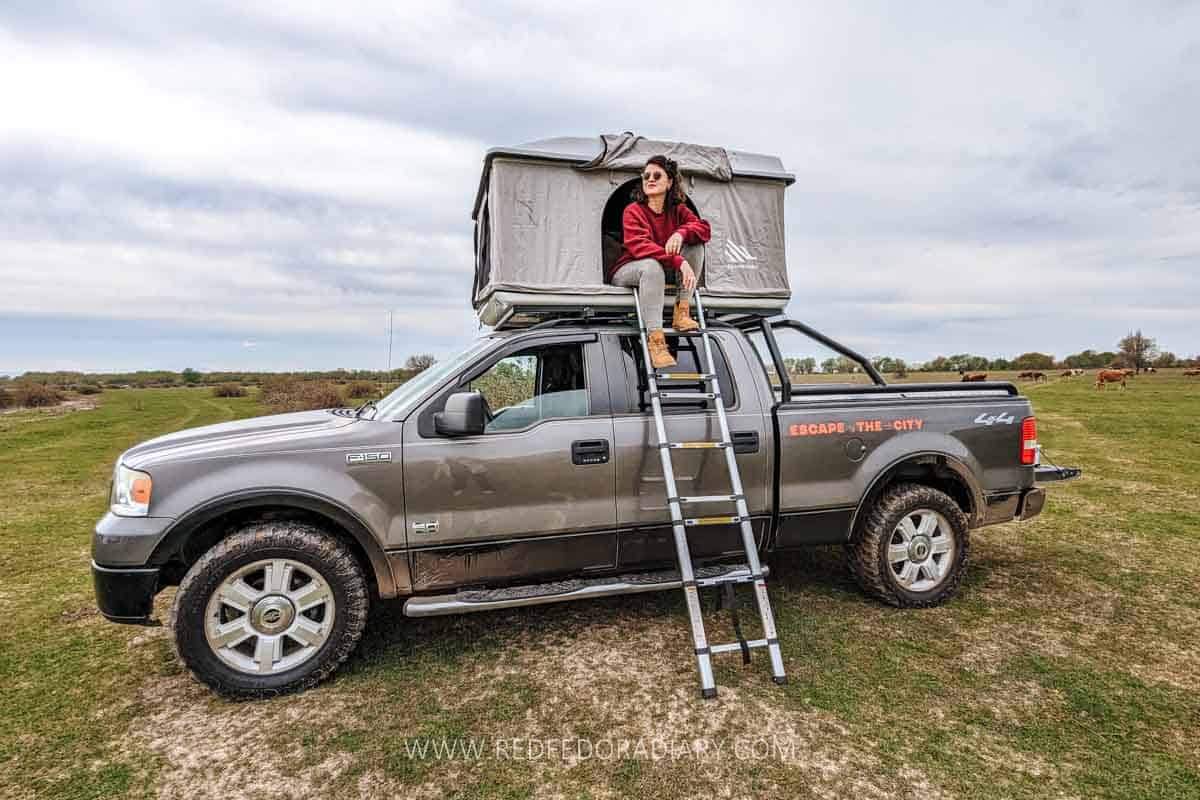
I understand that driving in Georgia may not be everyone’s preference, so I want to highlight an exceptional service called GoTrip.ge . This car rental service provides a skilled driver who can take you from point A to point B throughout the country while allowing unlimited stops along the way. It’s a convenient option that ensures a hassle-free journey. Moreover, the prices are very reasonable, making it an attractive choice for travelers.
Georgia travel tips: How to travel around Georgia
You have several options when traveling around Georgia: marshrutkas, buses, trains, and renting a car.
Marshrutka
Marshrutkas are the most frequent and preferred transportation when traveling to other cities in Georgia. It is fast and drives to remote areas, but they are the least comfortable ones with short leg space and uncomfortable chairs.
Vehicles depart from Didube and Navtlughi bus stations. Depending on the destination, marshrutkas run daily and hourly. There is no need to buy tickets before the departure – show up and ask where to find the one to your desired destination. You pay directly to the driver, or he will direct you to the ticket office.
Sadly, Georgia doesn’t have an organized bus system. The coach bus Metro Georgia, a Turkish company, operates mainly on the Georgia-Turkey route with stopovers to the major cities along the way, including Kutaisi and Batumi.
Omnibus is another option for traveling from Tbilisi to Batumi and Zugdidi (and vice versa) departing from Ortachala bus station.
Train
Georgia does have a moderately organized train system. However, the majority are of Soviet times, meaning that they are slower than buses and marshrutkas. We have the only somewhat fast train, Stadler, on the Tbilisi-Batumi route, which also stops at Kutaisi International Airport stop.
How to buy train tickets
Unfortunately, the website of the Georgia Railway is not very user-friendly. The best way to find the timetable is to Google your destinations, for instance, Tbilisi to Batumi train, and look for the railway.ge website.
Here’s the general timetable . Note that the second Departure column means that the train departs FROM the end destination, not the starting point.
You can buy tickets online by registering on the website and choosing the preferred option. The website will charge you a 1-2% commission when purchasing online. Another downside of Georgian Railway trains is that you can’t choose the seat when buying online or in the station itself.
Alternatively, Tkt.ge offers a more user-friendly experience for buying train tickets in Georgia. Unlike the official Railway website, you can only choose seats on Tbilisi-Batumi trains here. Sadly, for other destinations, the system automatically assigns you the seats. However, they charge extra for selecting seats and commissions using their website.
Other practical Georgia travel tips to know
Tap water is safe to drink .
Due to its proximity to the Caucasus Mountains, Georgia boasts many freshwater sources; therefore, tap water is safe to drink anywhere. Bottled water is cheap to buy as well. I recommend adjusting your tummy to Georgian water for the first two days and buying a bottled one to stay safe.
Then you can use your reusable water bottle to keep you hydrated on your travels. I have Stojo collapsible water bottle .
Electricity plugs
We have standard European plugs with 230 V, so there is no need for a travel adapter if you are coming from Europe. In other cases, you’ll definitely need a universal one .
ATMs and Money Withdrawal
ATMs are almost anywhere, no matter if it’s a big or a small city. The only problem you might see is finding them in remote villages. ATMs are safe to use here and even let you withdraw USD. Some even have EUR. Then you can exchange USD or EUR at exchange booths for a better rate than banks .
You can pay with cards almost everywhere, starting from cafes to small convenient shops. However, do carry cash just in case. And if traveling to remote mountainous villages, always have cash with you.
Georgia has three leading network provider companies, Magti, Silknet, and Beeline, now rebranding themselves as Celfie. They all have 4G or 4.5G internet service and various MB and GB packages.
Magti has the best coverage in Georgia, even in the mountain areas, so if you spend more time in the highlands, I suggest getting a Magti Card.
I have been a Silknet user for years because I love their low-cost local call package bundles. Their internet service is also alright but not as best as Magti’s. I use Silknet for calls and Magti eSIM for the internet.
Beeline (Celfie) is a Russian company with the lowest calls and internet bundle prices. However, their Internet service is relatively slow even though it’s 4G, and the coverage is very poor.
The best way to buy sim cards is to visit their service centers scattered across the city. The staff will help you set it up and choose the right bundle or package that suits your needs. The sim card prices vary by the company and start from 5 GEL.
I don’t recommend buying sim cards or tourist packages at airports. If you need to have a connection the moment you arrive in Georgia and before you get to the city center.
Instead, I recommend the Airalo app – it provides local eSIMs for a more affordable internet connection when traveling.
Tip: I use the Airalo app , which provides local eSIMs for a more affordable internet connection when traveling. Get 3 USD with code: BAIA2592 .
How to top up the sim card
If you run out of credit on your phone, the easiest way to top up a Georgian SIM card is via self-service payment machines. There are several different company machines all over the country, and every single of them is the same when it comes to topping up the sim card. Do note that they take a 4% commission. I usually top up through my internet bank with no extra fee.
Georgia travel tips: Local cuisine and drinks
Georgian cuisine is a delightful fusion of regional dishes shaped by numerous historical influences from invaders over the centuries. As a result, Georgian food exhibits traces of Mongolian, Turkish, Mediterranean, and Persian culinary traditions, resulting in a genuinely diverse culinary experience.

The local cuisine predominantly emphasizes meat, walnuts, dough, and spices. However, vegetarian visitors also have plenty of tasty vegetable and plant-based options.
Here’s a detailed guide to the best and my favorite restaurants in Tbilisi to try different Georgian food.
What to drink in Georgia:
- Georgian tea – tea industry here is slowly reviving, so you can try artisanal loose-leaf teas and have a tea-tasting ceremony.
- Wine – Georgia has broken the GUINNESS World Records for being the first winemaking country globally, producing the beverage for at least 8,000 years.
- Chacha – A strong local spirit made from the leftovers from wine production. However, today there are fruit versions as well.
- Sparkling waters – Georgia has plenty of mineral water sources, out of which Borjomi and Nabeghlavi are the absolute favorites of many locals.
- Lemonade – several companies that make lemonades in bottles are sweet, sparkly, and in different flavors. Tarragon and pear are local favorites. However, I love Laghidze Water’s lemonade, the original company I used to drink as a kid. It’s not bottled, so the best place to try them is at the following cafes: Puri Guliani, Stamba, Bazari Orbelianze, and Laghidze Water itself.
Georgia travel tips: Do’s and don’ts in Georgia
Georgians are recognized as a hospitable nation, where a guest is “a gift from God.” Therefore, Georgians pay a particular interest whether you are a local or a foreigner.
When you meet a Georgian and engage in a friendly conversation, don’t be surprised if they invite you to a family dinner. You can accept or kindly reject, and if you decide to go, make sure to go hungry ; the host will insist on eating every dish on the table and drinking as much wine as you can stomach.
The country is still a bit conservative regarding dressing and behavior etiquette. Avoid wearing short skirts/dresses or see-through clothes; you won’t be punished but will attract a staring eye.
Females should wear a headscarf to cover their heads and shoulders when entering churches and monasteries. Ideally, wear an up-to-knee skirt or a dress. Some churches provide scarves at the entrance, but having your own is better. Men can wear regular t-shirts and pants in churches; no strict rule applies here. Ideally, avoid shorts and tank tops . Do note that these rules are stern in monasteries outside the major cities.
- Don’t blow your nose and French kiss in public.
- Don’t start discussing politics and religion with a Georgian you just met.
- Do leave a tip if there is no extra service fee included in your bill
- Do take the usual safety precautions
- Avoid petting or encountering stray dogs. Some could be vaccinated, but most in remote areas and small towns may not.
My Favorite Travel Resources
To ease your travel planning, check out all the posts about Georgia travel . Additionally, here are some of the websites and services I use when preparing for my next adventure anywhere in the world.
✈ Book affordable flights on WayAway , a platform that shows the best flight deals, tours, and hotels. With a WayAway Plus membership, you can earn cashback . Get 10% off with code: RFD10
🚫 Get compensation for up to 700$ with Airhelp if your flight was canceled or delayed within the last 3 years.
🚗 Rent a car at Local Rent for affordable prices and convenient service.
❣ Pre-book a private car transfer with GoTrip from Tbilisi Airport to your hotel or any other city across Georgia.
💻 Get a VPN from Surfshark to protect your devices from hackers when using public Wi-Fi when traveling.
📱 Install the Airalo app , which provides local eSIMs for a more affordable internet connection when traveling. Get 3 USD with code: BAIA2592 .
💸 Use Wise to withdraw money in local currency without hidden fees and avoid high exchange rates. On top, you might get a Visa or Mastercard debit card .
🍷 For some of the best, expat-designed wine tours check out Eat!ThisTours . Get a 5% discount with code RFD5 .
🏨 Find budget-friendly deals on all sorts of accommodation types on Booking.com .
🩺 Buy the most flexible and budget-friendly travel insurance, SafetyWing , covering COVID .
☀ Book in advance some of the best city walks, cultural experiences, and day tours to maximize your stay and experience here.
Spread the word!
Very good review of Georgia for the visitors. All information is correct, just e-visa platform was closed unfortunatelly.
Thank you for notifing! Will update accordingly
Leave a Reply Cancel reply
Your email address will not be published. Required fields are marked *
This site uses Akismet to reduce spam. Learn how your comment data is processed .

The Complete Georgia Travel Guide: 19 Useful Things you should know for backpacking in Georgia in 2024
Are you an independent traveler and planning to travel to Georgia country soon? Then this is the Georgia Travel Guide you’re looking for! Here is everything you need to know about traveling and backpacking in Georgia in 2023!
Georgia is a small country right at the intersection between Europe and Asia, sandwiched between Russia in the north and Turkey in the South.
It’s an ancient country tugged away in the Caucasus Mountains and home to very determined people who, despite a tough history of war and conquerings, still strongly value their unique religion, culture, and centuries-old traditions!
Georgia, or Sakartvelo as the citizens call it, is slowly becoming a very popular touristic destination. After living there for almost one year, I understand why travelers are drawn to this magnificent and wild country!
With this Georgia travel guide, I want to help you prepare for your trip to Georgia. I cover everything from visas, entry requirements and safety to transport, accommodation, food, useful apps and cultural etiquette so you’ll have a great time traveling in Georgia, the country!
Discover Georgia’s Highlights or go on a unique Georgia Trekking Adventure to Tusheti , Racha , Vardzia , Katskhi and Chiatura on one of my Georgia Adventure Tours !
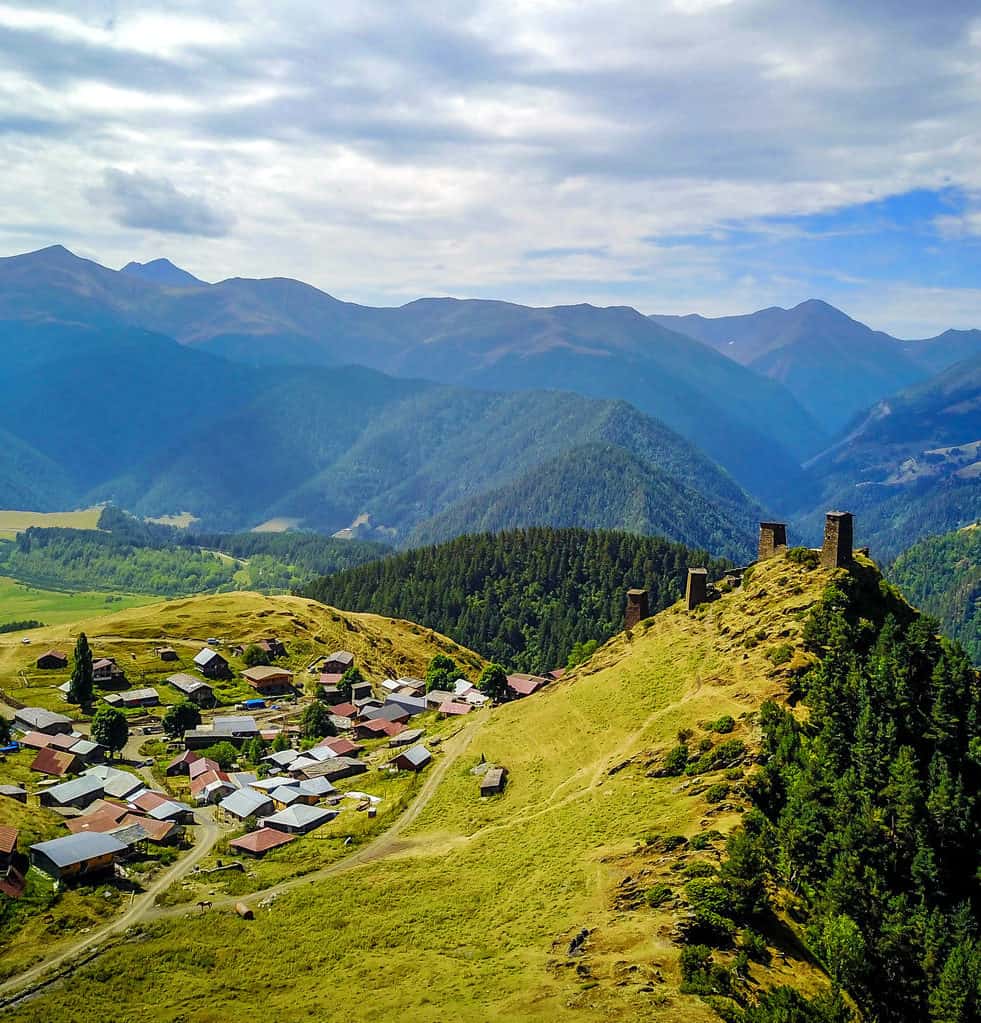
Disclaimer: This posts might contain affiliate links, meaning that if you make a purchase through these links, I may earn an affiliate commission. Thank you for helping to support this website!
Plan your trip to Georgia
- 19 important things to know before traveling to Georgia
- 15 Best Places to visit in Georgia
3 Fantastic Georgia Travel Itineraries
- Tours & Experiences: Adventure Tours in Georgia – Georgia City Tours
- Rent a car in Georgia
- Travel insurance for Georgia
- Book your stay in Georgia
TABLE OF CONTENTS
1. Traveling to Georgia country in 2024 – Georgia Entry Requirements
Georgia is open for tourism and has opened its borders to all international travelers (see visa section).
1.1 Georgia entry requirements Covid-19
Foreign citizens taking any mode of travel by air, land or sea, no longer need to present proof of Covid-vaccination or a negative PCR test result.
1.2 Georgia vaccination requirements
You don’t need any compulsory vaccinations to go backpacking in Georgia.
Vaccinations for Hepatitis A and Rabies are recommended. Rabies can be found in dogs, bats and other mammals in the country of Georgia.
I wasn’t vaccinated for Rabies when I traveled and lived in Georgia and even though there are a lot of stray dogs in the country, I never dealt with aggressive ones. In case you get bit, just go immediately to a doctor for a check-up.

2. Georgia Visa Requirements
2.1 do i need a visa to go to georgia.
If you want to visit Georgia, I have good news: Georgia is very generous with its tourist visa regulations!
Citizens from the European Union, North America, Australia, and the countries on this list can enter Georgia visa-free for 365 days !
This means that you can just show up at the airport of Tbilisi, Kutaisi and Batumi or at any land border and you’ll be allowed to enter Georgia.
If your country of residency is not on that list, you’ll have to apply for an e-visa , which will allow you to stay for 30 or 90 days , depending on your home country. You can check that out here .
2.2 How to get a Georgia e-visa?
What do i need to apply for a georgia e-visa.
- Document proving the purpose of travel (if it’s tourism, just provide your itinerary with proof of accommodation)
- Proof of accommodation
- Travel and health insurance
- A bank statement or document proving sufficient financial means to cover your travel expenses in Georgia
- Vaccination document/PCR test
Where to apply for a Georgia e-visa?
You don’t need to go to an embassy or consulate. You can apply online on this website .
All you need is a credit or debit card and scanned copies of your documents . Fill in the online application, upload the scans of your documents and pay. That’s it!
After 5 working days, you receive your e-visa. Print it out and bring it with you on the day you enter Georgia.
→ Important: You can apply for an e-visa only if you are NOT in the territory of Georgia.
How much does an e-visa for Georgia cost?
A standard tourist visa for Georgia costs 20USD + 2% service fee.
→ Important: You can’t enter Abkhazia or South Ossetia, two Russian-occupied regions of Georgia, on a Georgian visa. It’s currently not even possible to visit South Ossetia from Georgia. You can enter Abkhazia but only on foot and with a special visa. Read more about it in this travel guide to Abkhazia
2.3 How to renew or extend the Georgia e-visa
You can’t extend your visa for Georgia but you can easily renew it.
If you’re a citizen of a country that gets a free visa on arrival, you can simply renew this visa by crossing the border into one of Georgia’s neighboring countries, staying there for a few days and coming back. You’ll receive a new (free) visa upon your return.
If you entered Georgia with an e-visa, you can apply for a new one.
However, if you have an e-visa for 90 days, you’re allowed to stay in the country for 90 days within 180 days so you can only apply for a new visa every 6 months.
If you have an e-visa for 30 days (you can stay 30 days within 120 days), you can re-apply every 3 months.
2.4 What happens if I overstay my Georgia visa?
If you are not able to leave Georgia, you must apply to a territorial office of the Public Service Development Agency or to the branch of the Public Service Hall. It takes the 3 calendar days to make a decision after submitting the request.
If your term of legal stay in Georgia has expired, you will have to pay the administrative fine before or after leaving Georgia.
The fine for staying for 3 months after the expiry of the term of legal stay is 180 Georgian Lari (around US$60), for staying longer than 3 months the fine is 360 Georgian Lari (around US$120).
You will be denied entry and not be issued a new visa for Georgia until you’ve paid the administrative fine for overstaying. In addition to the fine, you might get banned from entering Georgia for 2 to 5 years.

3. When is the best time to visit Georgia?
You can visit Georgia the whole year round, depending on what you want to see and do during your trip.
If you want to do some hiking, then the period between May and September would be the best time. All the roads to the mountains are open and the temperature is pleasant for camping.
It’s also the only period in the year that you can visit Tusheti, Georgia’s most remote region and Khevsureti. The landscapes there are absolutely breathtaking and you’ll find some very unique and ancient settlements.

How to visit Tusheti, one of Georgia’s most remote regions

Svaneti , another breathtaking mountain region of Georgia, is accessible all around the year though and you can enjoy hiking in summertime, skiing in winter, and immerse yourself in culture and traditions, or learning about ancient legends during fall and spring.

21 Top Things to do in Svaneti, the Wild Heart of the Caucasus

If you love skiing and you don’t mind the cold and snowy weather, then you should visit Georgia between the months of December and March.

Georgia is just magical during the winter! It might be cold but everything turns into a beautiful winter wonderland.
Even Batumi , Georgia’s most extravagant city on the Black Sea coast, isn’t spared by the snow.

No matter at what time of the year you visit Georgia, you’re in for a beautiful treat!
3.1 Is Georgia good in summer?
The period between May and mid-September is the warmest time in Georgia. This is probably when most people prefer to travel.
Packing light clothes, camping outside, swimming in lakes and rivers, jumping in the sea, and chasing waterfalls,… The roads are also open to the country’s remote regions and villages.
Summer is the best time for wild camping and hiking . The hiking trails in Svaneti, Tusheti, Khevsureti, and the Tobovarchkhli Lakes trail – which is probably one of the hardest routes – can only be covered in the summertime.

Though in July and August, Tbilisi – the capital – gets too hot. Temperatures can be between 35°C and 42°C. Most locals move in August to the mountains and seaside.
Some vendors, shops, cafes, and even dance studios close in Tbilisi and pop up in Batumi for a month.

Top Things to do in Batumi – The Complete City Guide to Georgia’s Las Vegas

3.2 Is spring or autumn a good time to go backpacking in Georgia?
Spring or autumn is absolutely a good time to travel to Georgia!
One big reason for visiting Georgia in the fall is to explore the 8000 years of winemaking tradition .
The wine harvest in Georgia starts from the end of August (in Kartli and Kakheti) and lasts till early or mid-October (in Imereti, Racha, etc ) depending on the weather that year.
Springtime is when winemakers open the Qvevri , a clay pot where Georgians traditionally keep wine. Opening Qvevri is a sacred ritual during which they lit candles, say a prayer or a toast, and taste the first sips of the wine from the previous year’s harvest.

Oh Georgia, Sweet Motherland of Wine!

Spring and fall is the best time for generally exploring the country without getting hit by the suffocating heat or getting frozen.
It’s also a great time for photography-vast fields covered with flowers, trees blooming, or leaves turning into many colors in the forests.
3.3 Is Georgia nice in the winter?
Winter in Georgia is a paradise for winter sports lovers!
Georgia has several ski resorts. Gudauri is a 3 hours drive from Tbilisi and probably the most popular due to its closer location to the capital Tbilisi.
Svaneti has 2 ski resorts in Mestia and Tetnuldi . This is the best option for more advanced and adventurous skiers and snowboarders.
Bakuriani ski resort is good for professionals and is also child-friendly. Accommodation is generally cheaper compared to Gudauri. This is where most locals enjoy their winter vacations.

From Bakuriani, you can take a snowmobile adventure trip to Tabatkhuri lake and pay a visit to the largest Paravani lake, both frozen enough in winter for people and animals to freely walk on them.
Local families drill a hole in the ice to catch fish and are happy to take visitors on that adventure.

Goderzi ski resort is located in the Adjara region. It’s slightly trickier to access but the journey is unforgettable.
There is no public transport going directly to the Goderdzi ski resort. It can be reached by taxi from Batumi or Akhaltsikhe, the nearest big cities to the Goderdzi Pass, or you can get to Khulo center by public transport from Batumi.
From the Tourist Information Center in Khulo transport departs every day from the Information Center on the following schedule: from Khulo to Goderdzi at 11:00 and from Goderdzi to Khulo: at 16:00.

A complete guide to skiing in Georgia including the best ski resorts.

4. Where should you go in Georgia?
Georgia is a small country so you might think it can easily be covered in a week. But the reality is that Georgia is very diverse and has so much to offer.
While the places and itinerary must resonate with your personal preferences and available time, here are some suggestions:
If you’re interested in medieval fortresses, century-old monasteries, ancient cave cities, and Unesco World Heritage Sites, you should definitely visit the monasteries in Mtskheta , the Gergeti Trinity Church , the Gelati Monastery , and the cave cities of Vardzia , David Gareja Lavra , and Uplistsikhe .

15 amazing and most beautiful places to visit in Georgia
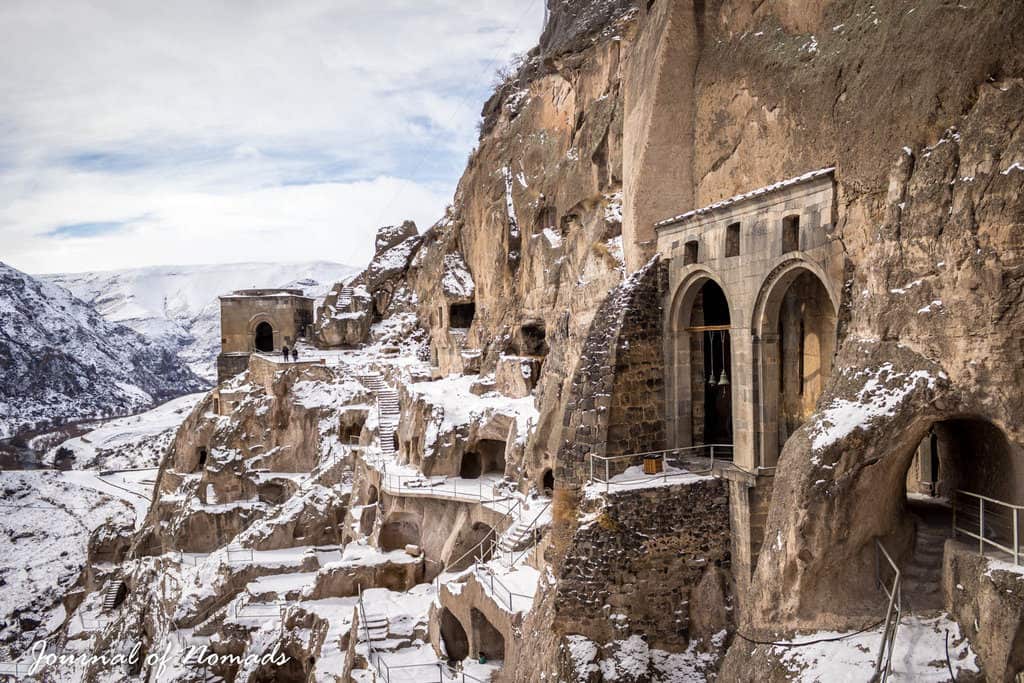
If you like unique and unusual places, don’t skip the Katskhi Pillar , the cable car city of Chiatura , and the Chronicle of Georgia in Tbilisi.

Tbilisi and Batumi are some of the many great cities to visit in Georgia and if you’re more an outdoorsy person, you’ll love the regions of Kazbegi , Svaneti , Borjomi , and Tusheti .
These are just a few of the beautiful places to visit while backpacking in Georgia !

5. Fun and unique things to do in Georgia
Georgia offers a wide variety of cultural and outdoor activities. Try to put at least one of the following in your itinerary to get the best experience in Georgia:
- Wine tasting/ harvesting/ qvevri making :
Georgia is the homeland of wine , so it comes as no surprise that any activities related to wine are a must-try.
Starting from making qvevri (a clay pot where Georgians traditionally keep wine) and putting them in the ground to simple wine tasting and making churchkhela with grape juice, these activities will give you an insight into the Georgian culture, which is so different from everything else you’ve experienced before!
If you’re traveling in Georgia in the fall, try to participate in the wine harvest. If you happen to be around in spring, you should join the qvevri opening ritual during which you get to taste the first taste of the previous harvest!

- Hiking in Georgia:
Georgia is a top hiking destination. If you like conquering high picks, the Caucasus mountains are here to challenge you.
If you enjoy less hardcore walks but still want to immerse yourself in nature, hundreds of lakes, waterfalls, easy day hikes, and camping spots are waiting for you.
A great resource for hiking in Georgia is Caucasus Trekking on which you’ll find an overview of all the hikes and treks in the country!

7 Beautiful Hikes in Georgia
- Join one of the traditional folk festivals in the mountains:
The highlands of Georgia are fascinating! Not only because of the beautiful nature, but they’re also rich in culture.
The “highlanders” of Georgia organize yearly traditional folk festivals. Such festivals often have thousands of years of history.
If you have the chance, don’t miss out on the early spring festival Lamproba in Svaneti and the Atengenoba festivals in Tusheti in the summer.
During these festivals, locals first pay a visit to their chappels and sacred places. Then they brew beer (which is considered a sacred drink in Tusheti), participate in horse races, have local dances, and sing traditional songs.
The festivals end with the blessing by the Ukhutsesi , the eldest and most respected member of the community.
Read more about the traditional festivals unique to Georgia .
- Discover Georgian folklore:
There’s nothing like Georgian folklore and nobody knows it better than Levan , member of the renowned folk band Adilei .
Levan is a singing coach and runs folk tours. He can take you to rural Georgia and unfold the 5000 years old melodies with you.
- Explore Soviet leftovers:
While locals confusingly cringe at that, westerners can’t hide their excitement exploring post-soviet architecture and other leftovers in Georgia.
There are people visiting Georgia just to discover whatever has been preserved from the soviet past. Starting from residency buildings to Soviet sanatoriums in Tkhaltubo and abandoned factories, there is so much to explore.

Tip: To better understand the consequences of the soviet past in Georgia, visit the Ergneti home museum of war by Lia Chlachidze.
Lia Chlachidze decided to turn her bombed house- that was nothing but 4 walls after the 2008 Russian invasion of Georgia – into a museum.
She renovated the house and collected all the memorabilia from her neighbors to display in her impromptu museum to raise awareness about the issue and struggles of the locals.
While this place is often neglected by most tour guides, it is visited by many individual adventurers, ambassadors, and other officials from all over the world.
The museum is completely free for visitors. Listening to Lia’s stories is a whole new experience. If you have a chance, bring a Georgian or Russian-speaking person with you to better communicate with Lia.
6. Georgia Travel Insurance
While some websites state that it’s mandatory to have travel insurance when traveling to Georgia, I’ve never been asked about it.
Traveling without insurance is a risk so I highly recommend getting one, especially when planning on hiking , skiing or horseback riding in the mountains.
An accident can happen fast and it’s better to be fully insured to avoid expensive medical costs.
I highly recommend the travel insurance provided by IATI . If you’re planning on doing adventurous activities and trekking in the mountains at high altitudes, I recommend the Backpacker Insurance by IATI .
The IATI Backpacker Insurance also covers Covid-19 and offers good long-term plans.

The 3 best budget-friendly travel insurances for travelers.

7. How to get to Georgia country
7.1 what airport do you fly into for georgia country.
There are 3 international airports in Georgia to which you can fly to.
1) Tbilisi International Airport
Tbilisi is the capital city of Georgia and this is the country’s main international airport. The airport is about 17km from the city center.
How to get from Tbilisi airport to the city center and back?
- By taxi:
There will be plenty of taxi drivers at the airport who will be very happy driving you to the city center! The journey to the city center takes about 20-30 min and costs 30-60 Gel .
If you don’t want to bargain for the price, download taxi apps such as Bolt , Yandex or Maxim in advance and order a taxi on the app. This way you will be aware of the price prior to the trip.
There’s a minibus (#37) that runs 24/7 from the airport to the metro Station Square. It can take up to 45 minutes to reach the city center as it stops everywhere along the way. You can learn all about Tbilisi municipality transportation here .
You can take a train from the airport to the main train station in Tbilisi, however, it only runs at 8.45 am and 6.05 pm.
2) Batumi International Airport
Batumi airport is the second biggest international airport in Georgia and is located 2km south of the city of Batumi .
How to get from Batumi airport to the city center and back?
You’ll have to bargain for the price but a taxi to and from the airport should cost between 15 and 20 GEL .
This is why the best is to order a taxi through apps such as Bolt , Maxim or Yandex . Your trip will cost only 5-6 Gel if you are staying in the new part of the town.
Just keep in mind that Batumi is a resort town and during the high season in July and August prices double or triple and that includes taxi fares as well. From September on, things slowly go back to normal.
There’s one bus (#10) that runs regularly from the airport to Batumi center and back.
The bus stop is in front of the terminal and it takes about 20 minutes to get to the city center. It costs 0.30 GEL and you pay on the bus itself.
3) David the Builder Kutaisi International Airport
This airport is about 14km west of the city of Kutaisi.
How to get from Kutaisi airport to the city center and back?
A taxi between the airport and the city center of Kutaisi costs around 20 GEL.
- By bus:
There are buses going from Kutaisi airport to the city center of Kutaisi ( 5GEL) . You can purchase tickets for these buses at the Georgian bus counter right near the exit of the terminal.
Airport Transfers in Georgia
If you are arriving in either the Tbilisi, Kutaisi or Batumi international airports and you immediately would like to travel to other destinations, airport transfers are provided by the following companies where you can book your tickets online:
- Georgian Bus

7.2 How to travel to Georgia country By road
You can enter Georiga overland from Turkey, Russia, Armenia, and Azerbaijan (read our border crossing report here ) .
For more info about the different border crossings, go to this page on Caravanistan.

How to travel from Europe to Asia by road
7.3 How to travel to Georgia by ferry
It is possible to travel to Georgia by ferry as Romania, Bulgaria, Turkey , Russia and Ukraine are bordering the Black Sea from where you can take ferries to the ports of Batumi and Poti in Georgia.
It is very hard to get any reliable information online regarding scheduling, so the best is to visit the closest port in the country you’re in and ask there.
8. Is it safe to travel to Georgia country?
Georgia is one of the safest countries I’ve been to! You can walk around with an expensive camera late at night and nobody will try to rob you. The Georgians are very respectful and genuinely nice people!
The Patruli – Georgian Police – is really helpful. Their cars are patrolling streets 24/7.
If you have an emergency and see a police car passing you, just wave a hand and they’ll stop for you. Or you can dial 112 , it’s the Georgian 911.
There are just a couple of things you should be careful about:
As a woman alone it is safe to travel or hitchhike in Georgia but … men will stare at you. A lot!
Some guys will try to hit on you and – even though it’s their full right to try to seduce a girl – they don’t easily take no for an answer. Don’t be afraid to be rude if they don’t leave you alone. It’s the only way to keep the guys at a distance.
You can always make up a story about your “husband”, who works in the embassy or is a wrestling champion. As ridiculous and heartbreaking as it sounds, having a strong male patron works miracles in masculine cultures.

Be careful on the road . The Georgian drivers often have dangerous driving behavior ! ALWAYS buckle up whenever you get in a car and be VERY careful whenever you cross a street.
There aren’t many pedestrian crossings and even if there is one, the cars might not stop for you, not even when there’s a stop sign or when the traffic light is red … They like to ignore the traffic rules.
Even though the situation is improving every year, it is still better to be careful than sorry. How many drivers obey traffic rules can also vary from city to village.

9 months of hitchhiking in Georgia: the good, the bad and the untold stories
Never go hiking in the mountains without proper equipment, and preferably, don’t go alone .
The mountain regions are sparsely populated, there are wild animals and stray dogs and if something happens, there’s no one around to help you. Be adventurous but don’t be stupid!

9. Money and currency in Georgia
9.1 what currency do they use in georgia.
The official currency of Georgia is the Georgian Lari , abbreviated to GEL .
I always use the Xe.com app to convert and stay up-to-date with the current exchange rates. At this time of writing, the current exchange rates are:
- $1 USD = 3.08 GEL
- €1 Euro = 3.35 GEL
- £1 British Pound = 4.02 GEL
9.2 ATMs and payment methods in Georgia
ATMs are almost around every corner and you can withdraw GEL and USD everywhere. Many ATMs offer EURO too.
For other currencies, it’s better to withdraw GEL, USD or EURO and exchange at exchange boxes, banks and microfinance companies.
Most of the shops, except small vendors, have POS terminals so you can pay both in cash and by card.
You need to bring cash money when visiting remote villages and regions, such as Tusheti, Svaneti and so on.
9.3 What credit cards are accepted in Georgia country?
Visa and Mastercard are the common cards in Georgia, as well as Amex, though the latter might not be accepted in small shops due to its higher charges.
Other than the mentioned above, major US, UK and Australian cards are also accepted here.
Before you use an ATM, check the logos on it to make sure they match your card.
9.4 Where to exchange money in Georgia
Exchanging money is easy in Georgia. There are exchange offices in every town and city. You will pass many of them as you walk around.
If you want an easy way to find them, just go to the biggest marketplace/bazaar and you will surely see one. Some close at 6 pm, others remain open until late at night.
Exchanging money is also possible at banks but they usually offer worse rates than exchange offices. Most bank branches open at 9 or 10 am and close at 6 or 7 pm. Some branches work until 8 pm. Almost every big bank has at least one branch that is open 24/7, usually at airports.
There are also several microfinance companies where you can exchange money. Rico Credit has many 24/7 branches around Georgia and they offer good exchange rates.
9.5 How much money do you need in Georgia?
If you are coming from a western country, Georgia will feel cheap for you.
City transport, taxis, and street food are relatively cheap. For the price of a pint in London, you can have a 3-course meal in Georgia, if you dine in a modest restaurant. In supermarkets, while prices on most products will surprise you, some might cost you more than in your home country.
Overall, traveling in Georgia is still really affordable, even though prices up every year.

How much does it cost to travel and live in Georgia?
9.6 Tipping in Georgia
Tipping in Georgia is not mandatory. Be aware that most restaurants include a 10% or 15% service charge in the bill.
Most people get confused and think that the service charge are tips for the waiters in reality, the money goes to the restaurant owners and hardly ever fills the pockets of waiters who are notoriously overworked and underpaid.
While you have no obligation or cultural pressure to tip, if you are happy with the service and giving away an extra couple of dollars won’t damage your budget, leaving a tip might make a big difference for the waiter(s).

10. How to get around Georgia
10.1 getting around tbilisi.
Getting around Tbilisi by public transport is quite convenient, cheap and easy. Local public transport includes metro, bus, minibus, and 3 ropeways around Tbilisi.
The first step is to purchase a “Metromoney” card , a universal card used to pay for public transport and minibusses in Tbilisi. Owners of this card benefit from a discount system .
The “Metromoney” card costs 2 GEL and you can buy it at the metro stations and at the Rike-Narikala ropeway. The card isn’t personal so if you’re in Tbilisi for only a short time, keep the receipt and you will be able to return the card within a month.
You can top up the card at any metro station, at both stations of the Rike-Narikala ropeway, via the express payment machines of “Bank of Georgia” and at service-centers.
Since 2022, the Tbilisi Transport Company offers following subscription fares for public transport (metro, bus, minibus, Bagebi-University ropeway):
- 1 GEL: 90 minutes unlimited free travel – payment is possible with ” Metromoney” card, as well as with different bank cards.
- 3 GEL: 1-day unlimited travel – package purchase is possible only with a subscription card.
- 20 GEL: 1-week unlimited travel – package purchase is possible only with a subscription card.
- 40 GEL: 1-month unlimited travel – package purchase is possible only with a subscription card.
- 100 GEL: 3-months unlimited travel – package purchase is possible only with a subscription card.
- 150 GEL: 6-months unlimited travel – package purchase is possible only with a subscription card.
- 250 GEL: 1-year unlimited travel – package purchase is possible only with a subscription card.
- Rike-Narikala ropeway fare:one-way fare is 2.5 GEL.
- Turtle Lake (Kus tba) ropeway: one-way fare is 1 GEL
It was hard to figure out the specific routes and schedules of the buses, but after a couple of months I found out that you can use Google Maps .
Just type your current location and the address or area you want to go to and dear Google will give you the time and number of the bus, metro or minibus you have to take!
You can also use the Journey Planner on the Tbilisi Transport Company website or download their app on your phone.

10.2 Getting around Georgia by mashrutka (minibus), minivan or taxi
If you want to travel like a local, you should travel around Georgia by mashrutka or minivan.
Taking a mashrutka is the cheapest way to get around in Georgia. It’s the main public transport for the locals to travel in and around cities and across the country.
Some marshrutkas have a fixed schedule, some depart when they are full. You’ll find them at bus stations of any city and town.
For short distances, you pay the driver once you get off. If you’re going on a long journey by mashrutka, you pay upfront at the ticket office (in case you’re at a bus station) or the driver himself.
Lately, shared taxis and minivans became popular alternatives to marshrutkas. They may cost a couple of GEL more, they have no fixed schedule, they depart as they are full but have way fewer seats than marshrutkas so they don’t take long to bring you to your destination. They are a bit more comfortable as well!
You’ll also find them at bus stations of any city and town.
When taking a taxi within a city, be aware that some drivers like to take advantage of unwary foreigners. Before you get in the taxi, make also sure you agree on the price! Some taxis have a meter but there are a few cheeky drivers who will turn it off if they see you’re a foreigner.
That’s why it’s a good idea to order a taxi on apps such as Bolt , Yandex or Maxim . This way you will be aware of the price prior to the trip.

10.3 Travel around Georgia by train
There aren’t that many train lines in Georgia and some of the trains are very slow but it’s quite an experience! Check the website of Georgian Railways for routes and timetables.
The fastest and most straightforward train ride is the one between Tbilisi and Batumi. You pay 24 GEL for a seat in economy class and you can comfortably sit back, relax and look out the window to watch the marvelous views passing by.
You can buy tickets at the train station or online, on the website of Georgian Railways where you’ll first have to register. If you’re having a hard time navigating the website, ask for help in the hostel/ hotel you’re staying.

10.4 Taking domestic flights in Georgia
Georgia isn’t a big country to travel in but if you want to save some time, you can always opt to take a domestic flight.
Vanilla Sky offers regular domestic flights to Batumi, Mestia and Ambrolauri from and to Natakhtari airport, which is located 32km from Tbilisi. The company offers free transfers from Tbilisi to Natakhtari.
You can buy the tickets online exclusively in the office or on their website .
Vanilla Sky also offers Air Taxi service, which means that you can rent an aircraft for any period and any purpose (passenger transportation, air trips, air shooting).
10.5 Driving in Georgia
You can travel around by driving your own car or by rental car . They drive on the right side of the road in Georgia. Here’s a useful checklist with all the requirements and driving rules.
The state of the roads is generally ok although I would recommend you to rent a 4WD if you’re planning on driving in the mountains.
Be careful! They say that if you want to stay safe on Georgian roads, forget the rules that apply in your country and understand (if you can) how they function in Georgia. Expect the unexpected!
I really love the Georgian people but they can be crazy drivers! Up until now, it’s the only country where I haven’t felt safe on the roads! They love overtaking on blind bends and speeding like crazy while simultaneously checking their phone.
Petrol stations and convenience stores are situated within a reasonable distance from each other on the main roads. You can find them in small towns and on village roads too. Though if you are going to remote areas, it might be a good idea to store fuel.
Be aware that there are different types of fuel available in Georgia so go to official-looking gas stations and make sure you get the right petrol for your car!
In case you’re renting a car , ask the rental company to write down in Georgian which fuel you need so you can show this at the gas station.
If you’re an experienced and confident driver, then going on a road trip through Georgia will definitely be worth it! You’ll be able to get to very remote places and camp under the stars!

10.6 Hitchhiking in Georgia
I mainly traveled around Georgia by hitchhiking and it was an adventure on its own! Although I nearly peed my pants a few times, due to the recklessness of the drivers, I had a great time hitchhiking!
In 2017, my average waiting time before getting a ride was 5 to10 minutes, which is pretty good! Even during the pandemic and now in 2022 traveling in Georgia by hitchhiking is still easy.
If you want to hitchhike, I’d recommend learning some basic Georgian. Even though it can seem difficult at first, it’s always possible to remember very simple words such as Hello (gamarjoba), Bye (kargad), Thank you (madloba) and Sorry (bodishi).
Locals truly appreciate your effort and failing attempts to nail difficult Georgian sounds can be a great ice-breaker and ends with good laughter and bonding.
If you want to build deeper connections and have more insightful conversations, English is mainly useful with the younger generation (-35) and Russian with the older one.
Though, before starting speaking in Russian with Georgians straight away, please ask them if it’s their preferred language.

11 tips to learn Russian quickly and effectively

It’s not unusual in Georgia to end up with a gallon of homemade wine while you’re hitchhiking (a gift from one of our drivers)
11. Where to stay in Georgia – Accommodation in Georgia
Whether you want to camp (in the wild) or stay in a hostel, guesthouse, or luxurious hotel, Georgia has it all!
11.1 Hostels, hotels and guesthouses in Georgia
There are plenty of hostels, hotels, and guesthouses in nearly every city, town and village in Georgia.
Hostels are the cheapest option, starting from $5 per night for a bed in a dorm. You can also find a nice private room, starting from 15 USD per night.
There are also some really nice hotels and boutique guesthouses in Tbilisi, Batumi, Kutaisi, and major towns, from mid-range to luxury. The average price for a room in a mid-range hotel is usually around $40 per night.
I always use booking.com to find the best hostel and hotel deals.
11.2 Glamping in Georgia
In the last few years, several glamping places have emerged in Georgia.
One of the most distinguished is Glamping Tago in Khulo municipality.
“I really believe that people are more lonely now than ever before. I think this is in large part due to social media, people being addicted to their smartphones that they kinda think they are connected with others but in reality, they are not.
Glamping Tago is a social place, first of all, where people can immerse in nature and connect with it, with themselves and each other.” , says Jonas, the young Belgian who turned a rural Adjarian village Tago into travelers’ beloved sanctuary in just one season.
Glamping Tago is a vegan/vegetarian/pet/kid-friendly place. They buy all products from local farmers and employ locals to run the place.
Other honorable mentions for glamping are Wine Space , Glamping Georgia , and Jewelberry Glamping .

11.3 Camping in Georgia
There are a few designated camping areas in Georgia but nobody will tell you off if you pitch your tent somewhere in a meadow or a forest. Just be aware of wild dogs and animals.
Don’t keep your food in the tent, but hang it in a sealed bag in a tree, at a small distance from your campsite.
If you’re planning on camping in the mountains, keep in mind that it can get cold at night.

12. Georgia food and drinks
The food in Georgia is finger-licking delicious! It doesn’t matter whether you’re a meat-eater, a vegetarian, or a vegan, you’ll enjoy the Georgian cuisine!
12.1 What is the most popular food in Georgia country?
The most popular dish in Georgia is khachapuri . It’s a gooey cheese-filled bread that looks a little like pizza. Rich in carbohydrates and dairy, it could cause a lot of trouble to lactose-intolerants but they might find the cramps worth it!
Almost every region in Georgia has its own version of khachapuri .

12.2 Georgian dishes you have to try
Georgia is a small country and nobody expects to discover such a variety of dishes and flavors in such a small territory, but Georgian cuisine amazes visitors.
A whole blog post can be dedicated to the food of each region of Georgia, but here I will give a short review and include as much as I can.
- Pastries: Georgian bread- Tonis or Shotis Puri – is a treat itself. Aside from khachapuri, there’s also osuri khachapuri (bread with potato and cheese mix), mchadi (cornbread), chishtari (cornbread and cheese), lobiani (bread with beans), chakhrakina (bread with spinach or beetroot leaves ), etc…
- Soups: kharcho, chakhokhbili, chashushuli, khashi, matsoni soup, chikirtma etc…
- Meat dishes : mtsvadi (Georgian barbeque), kuchmachi, kashlama, tabaka (whole chicken), kupati (spicy sausage), apkhazura,…

10 dishes from the G eorgian cuisine that you absolutely have to try

12.3 IS vegan and vegetarian food available in Georgia country?
it’s a common misconception that Georgia is not a vegan/vegetarian-friendly country. To debunk the meat, I will tell you that ¼ of the year Georgians are fasting, which means that they go vegan.
Generally, Georgians tend to love meat and consider vegan food as side dishes, this is why amazing vegan dishes are a little underrated but let me name some of them here: Lobio (beans) and Green Lobio, Badrijani Nigvzit (eggplants with walnuts), different kinds of Pkhali, Ajapsandali, Gebzhalia, Gomi with sulguni, Elarji.
You definitely won’t starve as a vegan/ vegetarian in Georgia, on the contrary!
12.4 What is the most popular drink in Georgia?
Alcohol flows freely in Georgia. From Georgian craft beer to homemade wine to the notorious chacha (a Georgian pomace brandy, ranging between 40% to 65% alcohol…). You’ve got to try it all but please, consume in moderation!
The most beloved is wine. No wonder because Georgia is after all the homeland of wine !
Georgians love a good toast and they drink wine with abundance but as a foreigner, it’s often hard to keep up with all these toasts and drinks. I’m talking out of experience…
Read more about the drinking traditions in Oh Georgia, sweet mother of wine . You’ll also find tips on how to prevent a hangover…

13. What should you pack for a trip to Georgia?
13.1 what should i wear in georgia.
Georgia has all the climate zones, from subtropical to semi-desert and alpine.
The climate along the coast of the Black Sea is rainy and mild, with average temperatures of 20°C in summer (June – September) and 5°C in winter (December – March).
The climate in the central and eastern areas of Georgia is arider, with average temperatures of +25°C in summer and 0°C in winter.
The mountains have an alpine climate, with heavy snowfall in winter. The average temperature in the mountains in summer is +20°C and -20°C in winter.
Pack appropriate clothes for the period in which you’re traveling. If you’re planning on doing some hiking and camping in the mountains, bring warm clothing, even during summer as it can become cold at night.
As a woman, it’s okay to wear miniskirts, short shorts, and tops (if you don’t mind being stared at by some men). Only if you want to visit a church, you’ll have to cover your legs and arms and you’ll also have to cover your head with a scarf.

13.2 Travel essentials for Georgia
Here’s an overview of all the essentials you should pack for your Georgia travel trip:
- Water Filter Bottle : There are several water supply companies in Georgia whose main job is to filter and control the water quality. However, the water in Tbilisi sometimes tasted like chlorine and in some buildings, the water pipes are pretty old and rusty. If you don’t want to take risks, you can always filter the water using a Lifestraw Water Filter Bottle . I highly recommend this reusable bottle with a microfiltration device. It allows you to safely drink the tap water and fresh mountain water from rivers and streams without becoming sick. When you drink water using a bottle like this, any dirt, bacteria, or parasites will be trapped in the fibers of the filter, while the clean water passes through.
- Power bank : you might not always have electricity available to charge your electronic devices, especially not when you’re planning on spending time in the mountains. I use and recommend Anker Power Bank as it has a 20,000mAh cell capacity providing at least 5 full charges for my phone. I can even charge my camera batteries with it!
- International travel adaptor : the power sockets in Georgia are of type C and F (the same as in the rest of Europe). The standard voltage is 220 V and the standard frequency is 50 Hz. In case you need an adaptor, I use and recommend this all-in-one Universal Travel Adaptor as you can use it worldwide.
- Biodegradable toilet paper : you sometimes have to be comfortable using a squat toilet in Georgia. Sometimes there’s toilet paper but you should definitely bring biodegradable toilet paper with you. I mention biodegradable as the toilet paper disappears into the ground so we can keep it environment-friendly! It’s also really bad to flush the paper into the toilet as the drains block easily so use the small bin provided.
14. Can I fly a drone in Georgia country?
Yes, flying drones is allowed in Georgia as long as your drone doesn’t weigh more than 25 kg, doesn’t fly faster than 54km/h and you have liability insurance.
You can fly your drone everywhere in Georgia, except near airports, border areas, military, and governmental buildings, high tension power lines and crowded areas.

My photography essentials and cameras for travel photographers

15. How is the internet in Georgia country?
15.1 what is the best sim card in georgia and how to get one.
It’s very easy and cheap to get mobile internet in Georgia. I suggest the mobile operator called Magticom .
You can buy a sim card for about 5 GEL at any Magticom shop (you’ll see them everywhere in the big cities). Bring your passport as you’ll have to get registered.
Once you’ve got your sim card, install the Magticom app on your phone. Once it’s installed, you can set up the app in English. Enter your phone number, add a password and you’re ready to buy credit at any moment of the day.
I used to buy 4000 MB for only 10 GEL per month. You can also get unlimited internet for 150 GEL per month.
In case you’re a digital nomad and you need to work online, you can count on the internet in the big cities. It might be a bit slower in some hostels but in general, it’s reliable and fast.
I rented a flat and had my own private connection (that came with the apartment). Just keep in mind that once or twice a month there might be a power cut, even in Tbilisi or in Batumi, but they usually never last longer than 4 hours.
16.2 Recommended apps and websites for Georgia Travel
- Maps.M e : This is one of the most practical apps you could use to navigate in Georgia. You download the map of the country so you can use it offline. It gives you very accurate directions and shows you where you can find the nearest restaurants, bus stations, ATM, hotels, places with wi-fi, points of interest, etc. This is also a great app to use while hiking as it shows most of the trails.
- Booking.com : You’ll need internet to use this app but it’s a great tool to find (last-minute) accommodation in the country.
- Google Translate : Translates written and spoken Georgian or Russian. Only Russian is available to download for offline usage.
- Xe currency: very handy to check exchange rates, also works offline.
- Metrogeorgia.ge: for buses between Georgian cities and Turkey
- Georgian Bus and Omnibus : for airport transfers between cities of Georgia
- TTC : official public transport application for Tbilisi bus and metro
- Railway.ge : for domestic and international train tickets and 1331 if you want to call them.
- Vanillasky.ge – for domestic flights
- Taxi Tbilisi
- scootscoot.ge
- tkt.ge : Tickets for events, train and bus trips, football matches and more
- Safe You : a safety app for emergency situations. A great SOS call app that works for iOS and Android. The application has an SOS button that a woman can use if she is in danger and needs protection. For installing the application, follow these instructions.
- 112: the unified emergency number in Georgia. The 112 service is free of charge from all fixed-line and mobile networks even if the number is disconnected from both sides or there is no SIM card in the mobile phone.
- USA2Georgia and Postalon.ge : for international shipping services.

16. Culture and etiquette in Georgia
Despite repeated periods of foreign occupation, the country’s rich and ancient historical roots date back thousands of years.
Georgia’s monumental architecture, unique traditional music, colorful dances and art combine to give the country, and its hospitable and gracious citizens, a strong sense of national identity.
Georgians call themselves Kartveli and their land is called Sakartvelo. These names were taken from Kartlos, who was a descendant of Noah.
The foreign name of Georgia has been used all over Western Europe, and it is believed to come from the country’s patron saint, St. George or the Greek word “ Georgios” which translates as farmers/people who work on land. The latter makes the best sense as Georgians have been renowned as people who worked on land and Georgia has always been famous as an agricultural country.
Georgians are one of the most hospitable people I encountered. They truly believe that guests are a gift from God so you can expect many invitations for a meal when you visit small towns and villages.
This meal will probably turn out to be a supra, a large dinner party involving many toasts with wine. Beer was traditionally used to toast to the enemy so it’s an outdated tradition to never toast with beer, which some people still follow.
If you get invited, bring flowers, sweets or chocolate for the hosts. Make sure that you give an odd number of flowers since even numbers are given at funerals.
The common greeting is a handshake while saying ‘Gamarjoba’ (which means ‘hello’). Once a person knows you better, you might get greeted with a kiss on the cheek.

17. What is the religion in Georgia country
Orthodox Christianity is the main religion in Georgia and there are many centuries-old churches and monasteries that you can visit all over the country.
The Georgians are religious but most of them are not church-goers. People merged religion into traditions and practice it vaguely.
You might see Georgians making a cross while passing churches and for many that’s the biggest act of practicing their religion. Yet, you’ll see a lot of icons of the different saints in households, cars, and mini-buses.
One of the most important saints in the country is Saint Nino, known as the Enlightener of Georgia. Many girls are named after her (Nino, Nini, Nina). She’s the woman who preached Christianity in Georgia and the reason why this religion was adopted as the state religion in the year 330.
Saint Nino’s cousin, Saint George, is considered the patron of Georgia. They say there are 360 churches in Saint George’s name, so people could pray to him in a different church every day of the year.
There is a big Muslim community in Georgia as well as Jewish, Catholic and other religions.
Georgia has always been at the crossroads of cultures and religions. The fact that there are an Orthodox Christian church, Armenian church, Mosque and Synagogue on the main square in Tbilisi speak for itself.

18. Is English spoken in Georgia country
The younger generation in Georgia speaks English while for the generations that got education during soviet times, Russian is their second language.
Both languages can be really useful when traveling in Georgia, but I would not recommend learning Russian solely for traveling in Georgia. Most young people in Georgia don’t or even prefer not to speak Russian.
Georgian is the official language of the country. It’s a Kartvelian language that is over 2000 years old (!). It’s one of the oldest spoken languages in the world and probably the hardest one to learn with its complicated grammar rules and peculiar throat sounds. The language has very little in common with any other spoken languages. Georgian also has its own alphabet.

Georgians are fully aware that their language is difficult and spoken only in their small country. They don’t expect tourists or even foreigners living here to be nearly fluent, but you can definitely brighten up their faces with smiles with simple “Gamarjoba” (which means “hello”).
The Georgian people had to fight hard for centuries to preserve their language. Even nowadays, many people mistake Georgia for the state in the USA or even with Russia, due to Georgia’s Soviet past.
It’s extremely important for Georgian people to let the world know who they are and even the slightest interest you express in their language and culture is greatly welcomed and appreciated.

19. Recommended books about Georgia

Bradt’s Unique Travel Guide to Georgia is the ideal companion for all travellers, from serious hikers to wine buffs, high-end culture lovers to backpackers of all ages.

In Culture Smart! Georgia , you’ll be guided through the past and present-day realities of Georgia, explaining what makes people tick, how they live and feel, and how to get on with them. You will discover that the Georgians will not let you down. Learn with this book how to reach their hearts, and they will charm you back.

If you’re planning to visit all the countries in the Caucasus, then Lonely Planet’s Travel Guide to Georgia, Azerbaijan and Armenia will be a very useful book!
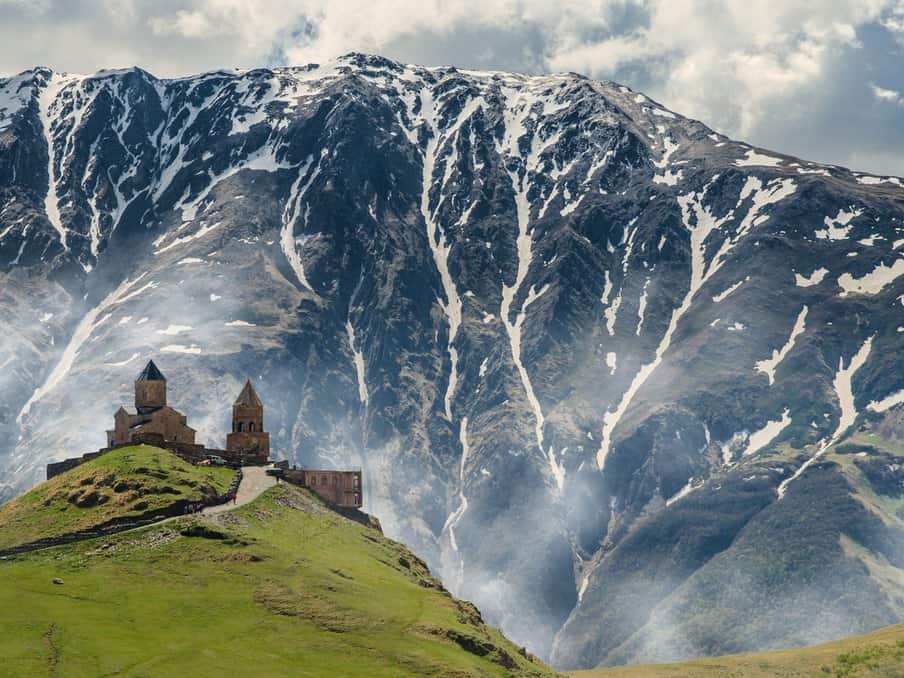
Georgia is a truly marvelous country waiting to be explored. I hope this post will guide you through your journey and that you’ll enjoy your time there as much as I did!
If you still have questions about your upcoming journey, let me know in the comments below or send me an email .
Related Posts

How to visit Tusheti National Park in 2024, Georgia’s most beautiful and remote region
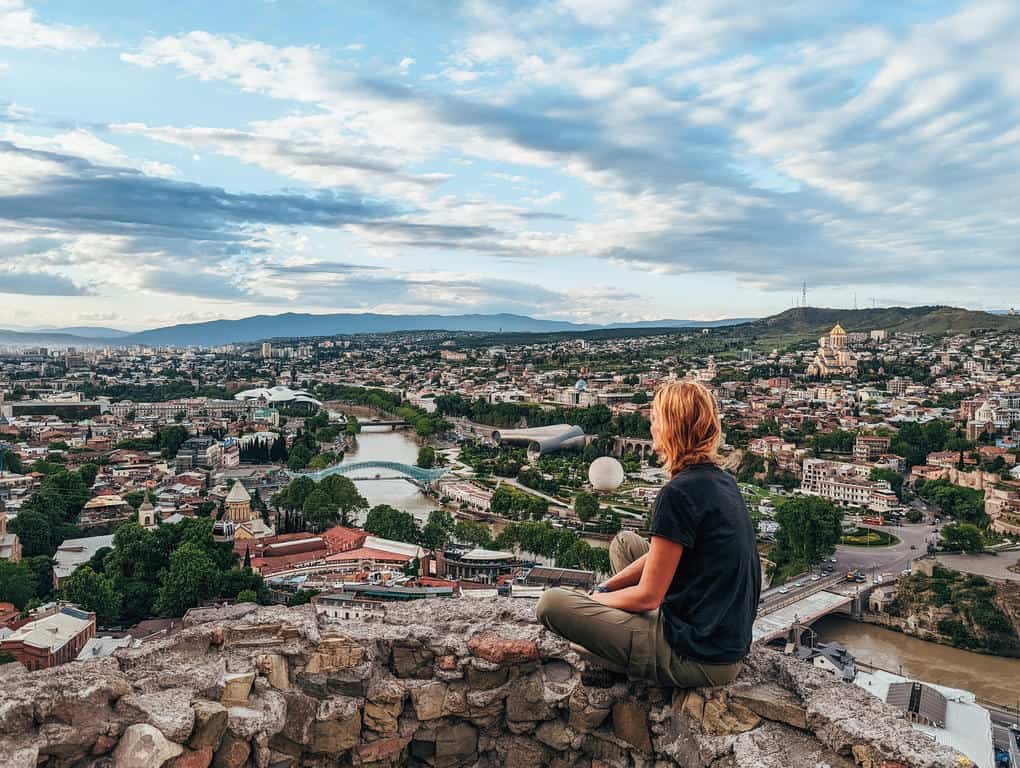
Georgia Itinerary – 3 Great Travel Itineraries to see the best of Georgia (country) in 2024
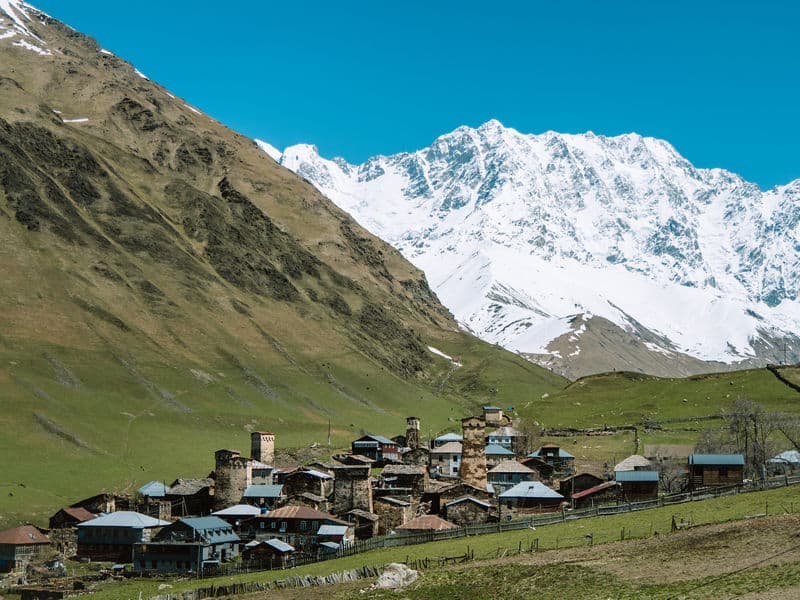
The Complete Svaneti Georgia Travel Guide – 21 Things to do in the Wild Heart of the Caucasus Mountains
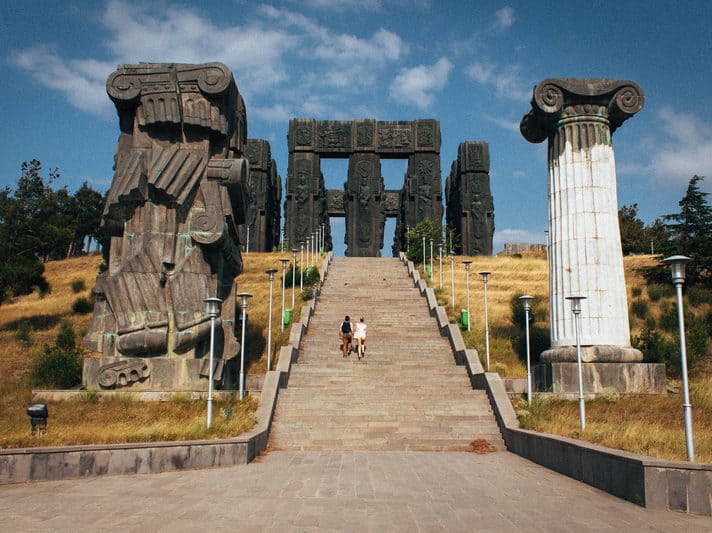
How to get to the Chronicles of Georgia in Tbilisi

15 Amazing and Unique Places to Visit in Georgia

10 Beautiful Historical Places in Georgia (country)
More georgia travel resources.
- Guide to Tbilisi , Georgia’s capital city
- Visit the 15 most beautiful and unique places in Georgia
- Plan your trip with these 3 awesome Georgia travel itineraries
- Discover the Chronicle of Georgia , Tbilisi’s hidden gem
- Guide to Batumi, Georgia’s most quirky beach city
- Hiking in Georgia: 7 beautiful off-the-beaten path hikes
- Visiting ghosts of the past in Chiatura, the cable car city of Georgia
- Visit Katskhi Pillar , the most incredible cliff church in the world
- Travel Guide to Vardzia , the ancient cave city of Georgia
- Visit Svaneti , the wild heart of Georgia
- Visit Tusheti , Georgia’s most remote region
- Visit these 10 beautiful historical places in Georgia
- Everything you need to know about skiing in Georgia
- 10 Georgian dishes you absolutely have to try
- Georgia, motherland of wine
- From Past to Present, a guide to Georgian Tea
15 thoughts on “The Complete Georgia Travel Guide: 19 Useful Things you should know for backpacking in Georgia in 2024”
What a informative webpage! Will definitely follow all blogs and social media. Thank you it helped to start planning a hiking solo trip to Georgia!
Hi Es, happy to hear this! Have fun with your preparations!
Never been so interested in reading out the entire vlog going line by line. All the information provided seems so detailed and hope it can make my georgia trip so easier. Keep up the good work!
Thank you Jazeel!! Wishing you a great time in Georgia!
Hey! I read this article to plan my trip to Georgia. And I must say I haven’t seen such an elaborate and well written travel guide ever! Pls keep on doing the great work. Helps all the travelers!
Thank you so much Manish!!
Thank you so much for all the information you shared! I am excited to explore Georgia and this is a great guide to get me started!
Hi Gina, that is so great to hear! Thank you! We wish you a beautiful trip to Georgia and let us know if you’d have more questions about traveling to this stunning country!
Thanks for sharing your insights! I’m heading to Svaneti in Sept by myself and plan to do the 5 day hike to the glacier. Do you think it’s safe for a solo female traveller? I can’t get a sense as to whether there are many people on the same hiking trails. Thanks!
Hi Camila, Svaneti is currently a popular place for hiking so you’ll meet other people on the trail. It’s also a safe place for a solo female traveller. If you’d like to have some company, you could always post a message in the Facebook group ” Georgian Wanderers”. But if you like to do it on your own, you should be fine as well. Wishing you great adventures in Georgia! Happy travels!
Thank you so much for such an informative blog. I´m trying to convince my family to go to Georgia this year and I thing your blog will be of great help for that. Just one question: do you think this is a safe/enjoyable country for kids? I have a 5 year old boy (very used to road trips) and I´ve been wandering if this would be also appropriate for him. Best regards and congratulations!
Hi Nuno, I’m so happy to hear that you enjoy reading our blog! I hope you can convince your family to go to Georgia as it’s such a beautiful country (we miss it there and are thinking about returning as soon as we can). Georgia is very safe for kids and for travelers in general. It’s honestly one of the safest countries I’ve visited during my +7 years of traveling! The Georgians also love children so you don’t have to worry about anything! Hope this will convince your family and if you have any more questions, I’ll be happy to answer them! Warmest wishes, Cynthia
Thank you for providing such an in depth guide to traveling in Georgia! This was very helpful. Georgia has been on our bucket list for quite a long time but we haven’t yet made it to that country. Now we want to travel there even more!
Hi Desiree, you’re very welcome! We spent 11 months in Georgia and really loved our time there. It’s a beautiful destination and I hope you can make it one day to visit it! Don’t hesitate to contact us if you would have more questions!
Oh, that is so great to hear!! Glad that our website provides you with good information!! You’ll enjoy your trip, both countries are very beautiful and special! Do you already have an idea which places you want to visit?
Leave a Comment Cancel Reply
Your email address will not be published. Required fields are marked *
Save my name, email, and website in this browser for the next time I comment.
- Arts & Events
- Great Reads
- Atlanta 500
- Block by Block: Stories from the streets that connect us
- Women Making a Mark
- Pride Guide 2022
- Restaurant Reviews
- 75 Best Restaurants in Atlanta
- Best Barbecue
- 50 Best Tacos
- 123 Things to Eat on Buford Highway
- 50 Best Bars
- Best Breakfast
- The TOUR Championship Cocktail Contest
- Atlanta Magazine’s HOME Digital Editions
- Artists & Galleries
- Design Advice
- Design News
- Real Estate
- Neighborhoods
- Real Estate All-Stars
- Sponsored: Preferred HOME Partner
- Kitchens for a Cause
- Georgia Design Awards 2023
- School Guide
- Health & Wellness
- Top Doctors
- Top Dentists
- Sponsored: Physician & Dentist Profiles
- Buckhead Guidebook
- Southbound Magazine
- Southbound Digital Editions
- Southbound Newsletter
- 50 Best Things to Do in Georgia
- Hidden Georgia
- North Georgia Mountains
- Great Georgia Hikes
Jekyll Island
- Georgia Travel Guide
- Gilmer: Ellijay Visitors Guide 2022
- Alabama Vacation Guide 2023
- Readers’ Choice
- Subscription Center
- Purchase Single Issues
- Newsletters
- Digital Editions
- Custom Media
- Give Atlanta
- Internships
- Where to Find
- Georgia Design Awards 2024
- GrillFest 2024
- Whiskey Festival 2023
- Upcoming Events
- Atlanta Magazine Whiskey Festival 2022
- 2020 Atlanta Symphony Orchestra Designer Showhouse
- Atlanta Baby and Beyond
- Atlanta Magazine Whiskey Festival 2019
- DINES: A Taste of the City’s Best Restaurants
- 2019 Modern Style Showhome
- Best Burger Battle
- Pinewood Forest Idea Home
- 2018 Modern Style Showhouses
- Event Photos
- Issue Archive
- GaBiz Magazine
- Vote for the Best of Atlanta Reader’s Choice 2023

Your guide to Georgia’s resort islands

What to do, what to eat, and where to stay on five islands
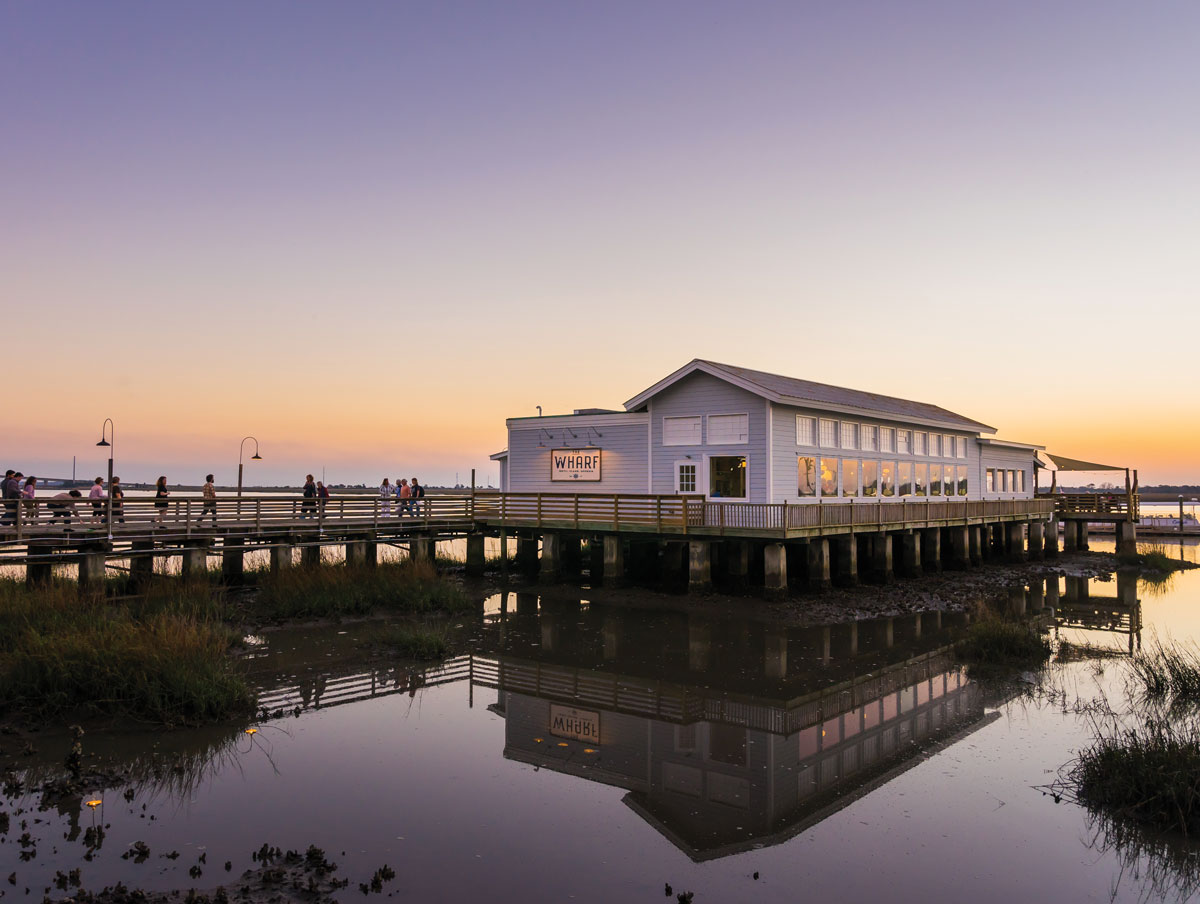
Courtesy of Jekyll Island Authority
Cresting the Sidney Lanier Bridge reveals a panoramic view of Jekyll Island’s otherworldly terrain. The drive from Atlanta feels endless, but this glimpse of what’s to come feels rewarding. On Jekyll, luxury is juxtaposed with nature. Once a Gilded Age vacation haven for the wealthy, the island was sold to Georgia in 1947 and became a state park, with much of its natural beauty preserved ever since.For those seeking a getaway that balances plush poolside and beach relaxation with exploration of a landscape of marshland and driftwood, Jekyll is the place to go.
How to get there To reach Jekyll Island, you’ll need to drive about five hours southeast of Atlanta. Break up the trip with a lunch stop in Darien at Skipper’s Fish Camp for fried shrimp and possible alligator sightings. Alternatively, Brunswick Golden Isles Airport is about 30 minutes away, and Jacksonville’s airport is only about an hour’s drive. To access the island, you’ll need to pay a nominal daily parking fee (even if you pay for parking at your resort). You’ll get a receipt to scan, which allows you back on the island if you drive off.
Where to stay It’s hard to beat the Jekyll Island Club (from $249). The expansive property, with its iconic live oak–lined driveway, croquet field, and views of the river, offers 200 guest rooms and suites across five buildings. It originally opened in 1888 as a club for high society (described by one magazine as “the richest, the most exclusive, the most inaccessible club in the world”), and today maintains that Victorian charm alongside modern amenities. The clubhouse interior recently got a facelift, and the Grand Dining Room underwent a renovation, boosting the resort’s sparkle.
Those who wish to stay beachside can do so at the resort’s sister property, the Jekyll Ocean Club (from $379) built in 2017. The laid-back yet still upscale vibe makes for a comfortable landing pad after a day of biking or boating (two popular island activities). The pool sits near the beach.
Guests staying at either the Island Club or the Ocean Club can take a shuttle and enjoy the amenities of either property.
What to eat The dining options are streamlined on Jekyll, but it’s hard to complain with choices this delightful. Zachry’s Riverhouse is that quintessential seafood shack for diners seeking locally caught shrimp, blackened mahi-mahi sandwiches, and fried oysters in a no-frills environment by the water. The Wharf , located on the river at the Jekyll Island Club, has a large, covered outdoor seating area with optimal sunset views and plenty of window-side tables for those who prefer air conditioning. Savor classics like seafood tacos with blackened catfish or the whole fried flounder with hush puppies. Whether you stay at the Island Club or not, the Pantry ’s worth visiting for a morning cup of coffee and breakfast pastry enjoyed on the shaded veranda.
What to do Explore the salt marsh on a kayak, take a shrimp boat excursion, or go on a dolphin sighting tour to fully appreciate this barrier island’s beauty. Several bike paths make cycling around Jekyll easy. Families will appreciate offerings like mini golf, located across from the island’s public beach, and Summer Waves, a water park with twisty slides and a lazy river. Take a hammock over to Driftwood Beach and enjoy the sculptural beauty of gnarly fallen trees.
Insider tip Sea turtles lay their eggs on Jekyll’s beaches in the late spring. By August, the hatchlings are ready to head to the ocean . Try to catch a glimpse by participating in the Georgia Sea Turtle Center ’s Dawn Patrol program, which monitors the turtles’ nests. Or visit the center itself to see turtles recovering from injuries and ailments. —Lia Picard

Courtesy of Sea Island
This gated, private island is open only to residents, members, and guests at the swanky Sea Island resort. To appreciate just how exclusive this place is, check out its memorabilia from hosting the G8 Summit in 2008. Since the original inn opened in 1928, visiting world leaders have planted commemorative live oaks (Georgia’s state tree). Look for those planted by Presidents Coolidge, Eisenhower, Carter, Clinton, and both Bushes, as well as British Prime Ministers Margaret Thatcher and Tony Blair.
How to get there Sea Island is roughly 300 miles from Atlanta, connected by a causeway to St. Simons Island.
It is near three public airports: Jacksonville International Airport (60-minute drive), Savannah International Airport (75 minutes), and Brunswick Golden Isles Airport (20 minutes).
Where to stay Rebuilt in 2006, the Cloister (from $869) is a Mediterranean-style riverfront hotel originally designed by the legendary Palm Beach architect Addison Mizner in 1928. It was reconstructed with lavish, pre-Recession extravagance—reportedly entire Turkish villages were commissioned to weave rugs—which has now made it the world’s only resort to win five Forbes stars for 15 consecutive years. The links are a short drive away, so golfers often opt for the adjacent five-star Lodge at Sea Ialsnd (from $729), which also offers an oceanfront pool and 18-hole putting course. Other overnight options are a sporting club, cottage rentals, and, on St. Simons Island, a more affordable inn.
What to eat Dinner at the Cloister’s formal dining room has long been a bucket-list item for Georgia foodies. Unfortunately, it’s closed for renovations until later this year. When it reopens—as several distinct spaces, known collectively as the Georgian Rooms—perhaps it will regain its former title as the state’s only Forbes Five Star restaurant. Currently available dining options include family-friendly Italian fare overlooking the river, along with clubby and poolside restaurants throughout the resort.
What to do Home to the PGA Tour’s RSM Classic in November, Sea Island offers three championship golf courses and a state-of-the-art golf performance center. There is also tennis, pickleball, squash, the Forbes Five Star spa, a beach club, a shooting school, horseback riding, falconry, boating, sailing, fishing, kayaking, bowling, and guided nature excursions such as sea turtle watching, birding, coastal habitat exploration, and shelling. Not to mention children’s programming and two Topgolf simulators.
Insider tip Each evening at sunset, a resident bagpiper officially closes the golf courses. Grab a cocktail at the Lodge, settle into an Adirondack chair to listen, and plan your trip to St Andrews. —Betsy Riley
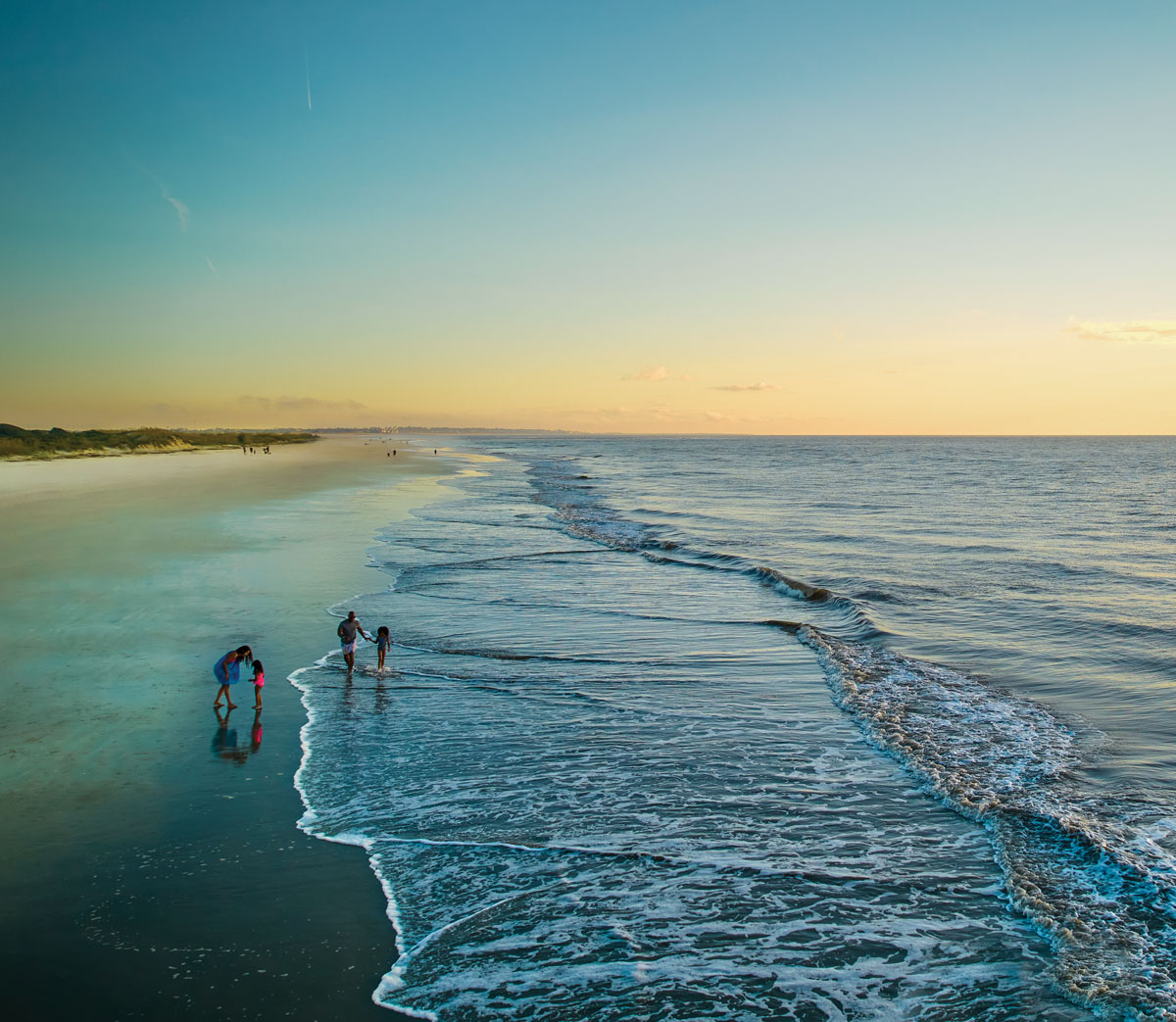
Photograph courtesy of Goldenisles.com
St. Simons Island
St. Simons moves at a quicker pace than its Golden Isle neighbors and calls to those who crave a little luxury. Historical sites like the St. Simons Lighthouse Museum and Fort Frederica add an interesting element to the island, while dining and shopping options abound, not to mention miles of sandy beaches.
How to get there The drive takes a little less than five hours from Atlanta, all along major highways. If you’re flying, the Savannah/Hilton Head International Airport is about 90 minutes north of St. Simons.
Where to stay The historic King and Prince Beach & Golf Resort (from $233) is well-suited for family vacations or romantic getaways. Built in 1935, the stately property is the island’s only beachfront hotel. There are about 200 rooms, many with spectacular ocean views, as well as villas for those traveling in large groups and guests who want the comforts of home. The resort has five spacious pools adjacent to the beach and an off-property golf course with a shuttle provided by the hotel.
What to eat With a relaxed atmosphere and sweeping views of the ocean, the resort’s restaurant Echo invites you to take your time. Breakfast, lunch, and dinner are served here, but dinner stands out, with dishes like jumbo lump crab cakes, refreshing salads, and spaghettini with Sapelo clams. Afterwards, stroll over to the resort’s treat shop, the Cottage Custard + Coffee .
What to do In addition to the resort amenities, St. Simons Island is home to historical destinations like a lighthouse museum and the World War II Home Front Museum . The town itself offers plenty of shopping and dining opportunities.
Insider tip According to Roland Biron, the resort’s director of sales and marketing, the cooler months are a great time to visit the property, especially with the help of lower rates. “November weather is traditionally mild in the Golden Isles—and, better yet, our pool is heated. We host beautiful Thanksgiving and Christmas Day brunch buffets each year and have a variety of festive, family-friendly holiday programming throughout the month of December.” —Lia Picard

Photograph by Phillip Murdaco
Little St. Simons Island
People are drawn to the Lodge on Little St. Simons Island (LSSI) to savor the surrounding 11,000 acres of wilderness and seven miles of beaches, not far but oh so different from its neighbor St. Simons Island. LSSI is a wildlife refuge with the vibe of an upscale summer camp, since visitors stay in rustic lodges and eat meals family-style in the main inn.
How to get there A ferry on St. Simons Island is dedicated to guests of LSSI, so part of the fun is the windswept ride from dock to dock.
Where to stay No more than 32 guests can be accommodated in the cottages dotted around the wooded property, so stays here offer a quiet escape from regular life. A historic barn serves as a gathering spot, and makes the island popular for family reunions, weddings, and company retreats, where the entire place is rented out. (From $675, double occupancy, all-inclusive).
Where to eat The island’s original structure, a 1917-built hunting lodge, is home base for breakfast, lunch, and dinner, as well as snacks throughout the day. Guests can get to know each other at family-style meals, while they dig into big platters of locally sourced food and hear about activities for the next day.
What to do Guests can grab a bike or kayak and wander off on their own, or participate in twice-daily activities. LSSI general manager Jamie Pazur recommends some specifics: truck safaris with a resident naturalist, walks through the ancient maritime forests, or just looking for sand dollars on the (empty) beaches. Birders can borrow a set of binoculars and expect to see dozens of species—from roseate spoonbills to painted buntings. “We also have special events throughout the year, such as Shark Days, where guests can tag along and participate with shark researchers,” says Pazur.
Insider tip LSSI offers day trips (by reservation, includes picnic lunch, $200 per person) with similar activities minus the dinners and overnight accommodations. “A day trip is all about being immersed in nature, learning about barrier island ecology, and discovering the beauty of this special island,” says Pazur. —Lisa Mowry
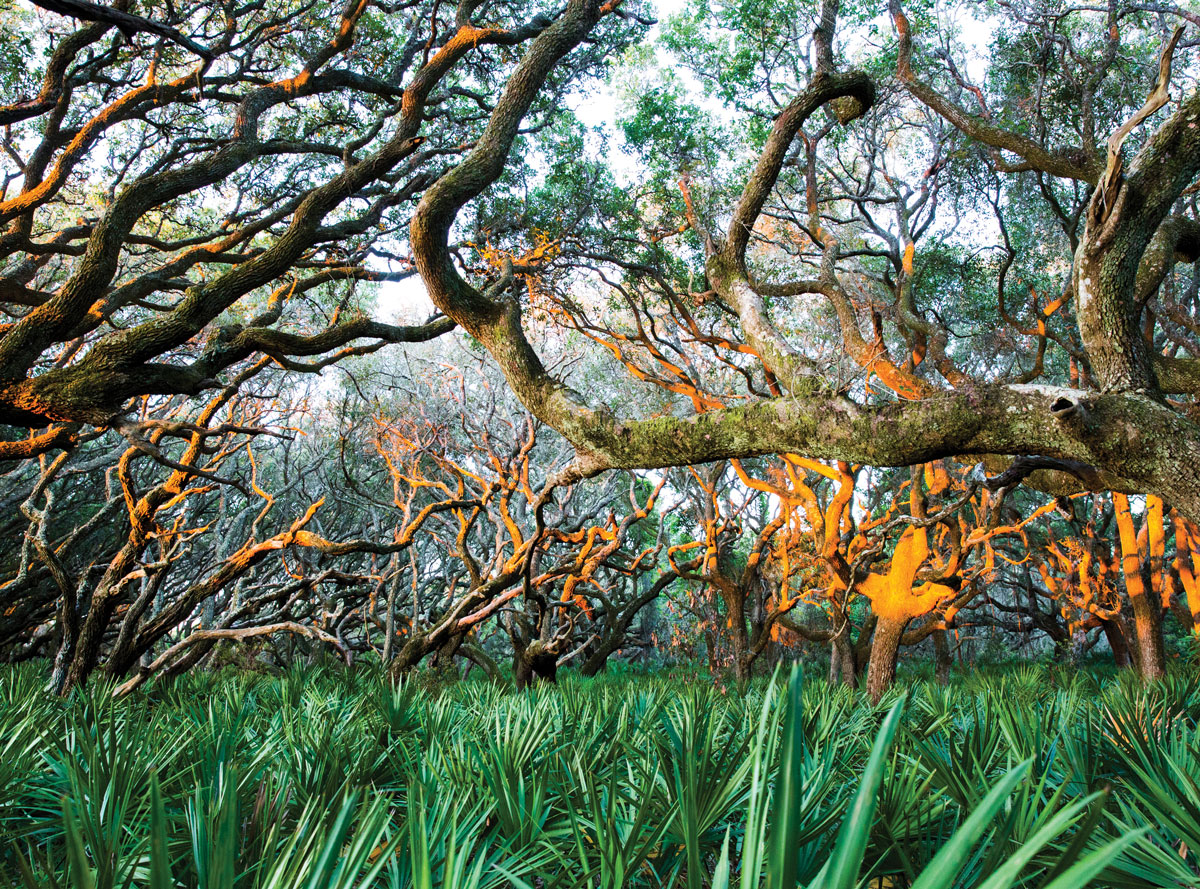
Photograph by Gabriel Hanway
Cumberland Island
As if the island itself isn’t enough—enchanting and mysterious Cumberland Island, with its majestic live oak trees, wild horses, and 18 miles of beachfront—the Greyfield Inn (from $745, all-inclusive) mixes in a bit of Gilded Age glamour. Although people can ferry over and camp at other parts of Cumberland island, a Greyfield stay merges creature comforts with nature.
How to get there Greyfield Inn has its own private ferry from Fernandina Beach on Amelia Island , and the 45-minute ride is a primer on the ecology of the island.
Where to stay This grand country estate was built in 1890 for the Carnegie family, so staying here feels like you’re a private guest at a monied estate. The colonial revival house has a wide, welcoming staircase, paneled library, and spacious porches. Guests can stay in the inn itself or small cottages on the property. Despite the opulence, the overall vibe is relaxed, with plenty of time to ride bikes and explore other parts of the island. In the evening, guests usually dress up a bit for cocktails and dinner in the main house.
Where to eat At around 7 p.m., the dinner bell is rung, and a seated meal begins in one of the dining areas. Menus often include vegetables and herbs grown in the gardens on-site, as well as locally caught fish and Southern specialties. For lunch, guests pick up a picnic basket to enjoy anywhere they’d like, while breakfast is a hearty Southern-style treat.
What to do In addition to enjoying all the outdoor offerings—naturalist tours, kayaking, and bird-watching—guests can visit the haunting ruins of Dungeness, another former Carnegie mansion, and the intact, period-perfect Plum Orchard Mansion, with its 22,000 square feet of Edwardian interior furnishings that provide a glimpse into the 19th century.
Insider tip The First African Baptist Church, built in 1893, is only a five-mile bicycle ride from Greyfield Inn. It was here at this modest, one-room church that John F. Kennedy Jr. and Carolyn Bessette secretly married in 1996 (requiring caterers and other staff to sign confidentiality agreements). —Lisa Mowry
Many resorts now use dynamic pricing. Rates cited were the cheapest available online in August at press time.
Back to Exploring Georgia’s Enchanted Islands
This article appears in our August 2023 issue.
RELATED ARTICLES MORE FROM AUTHOR

What to know about Georgia’s remote islands

Author Mary Kay Andrews’s guide to Tybee Island

The staying power of the Gullah Geechee community
Newsletters.

Most recent

Fans ate 550,000 hot dogs at Truist Park last year—and 8 other interesting facts about the Braves ballpark

Where to eat and drink at the Battery and Truist Park

Catching up with James Beard Award finalists, chefs Parnass Savang and Rod Lassiter
Great reads.

Ronald Acuña Jr. takes flight

The Dining Diva: Christiane Lauterbach dishes on her 40 years as Atlanta magazine’s dining critic

The ancestors of Nettie Washington Douglass still have stories to teach us. She just hopes we are ready to listen.
- Business Forum
- Privacy and Cookies Policy
- Terms of Use
- General Contest Rules

IMAGES
VIDEO
COMMENTS
Find trip ideas, attractions, dining, events, activities, accommodations, map travel resources and much more. Read Features & Play Games. About the Covers. The 2024 Georgia Official State Travel Guide has four versions of the cover: Centennial Olympic Park in Atlanta, Downtown Bainbridge, Bell Mountain in Hiawassee and Tybee Island Pier & Pavilion.
Georgia's best sights and local secrets from travel experts you can trust. Lonely Planet. Destinations. Planning. Inspiration. Shop. Search. Saves ... A first-timer's guide to Georgia, gateway to the Caucasus. Feb 17, 2022 • 9 min read. Georgia is the gateway to the Caucasus, a nation of rich culture, dense history and thrilling terrain. ...
2022 EXPLORE GEORGIA OFFICIAL STATE TRAVEL GUIDE FAQ Q: When does the 2022 Travel Guide come out? A: The guide will launch in February with delivery of printed guides scheduled for early-mid February to Bobby Dodd warehouse and to advertisers. Q: How is the 2022 Travel Guide being promoted to consumers? A: Explore Georgia is promoting the guide ...
Days 1 & 2: Tbilisi. Every good Georgia itinerary begins in Tbilisi. Tbilisi - the coolest city in the Caucasus and one of Europe's most talked about up-and-comers - is the logical place to begin your Georgia itinerary. This is where you'll find some of the country's best museums, restaurants and wine bars.
Visa requirements for Georgia. Visiting Georgia is usually easy for travelers from most countries. Citizens of 98 nations - including the member states of the EU, Australia, New Zealand, USA, Canada, South Africa, Turkey, Russia and many nations in the Middle East, Central America and Central and Southeast Asia - can visit and stay in Georgia visa-free for 365 days.
Take a sip of history and discover the variety of flavors of Georgian wine. With a winemaking tradition that dates back over 8,000 years, Georgia is home to some of the oldest and most authentically made wines in the world. Sample the local varieties and discover the unique terroirs of this ancient country. Pour me a glass.
Everything you need to know to visit Georgia in 2024, including up-to-date city and regional guides, insider tips, and a wealth of resources collected from my Georgia travel blog. Last updated: January 2024. If Georgia (the country) features on your travel wish list, then I have good news for you: There has never been a better time to visit ...
Georgia has a pretty liberal visa policy. There is a long list of countries that are able to enter and stay visa-free for up to 12 months. This includes the EU, Australia, New Zealand, Japan, Canada, US and UK. Otherwise, e-visas can be obtained online before arriving for other country citizens.
Discover essential Georgia travel tips from a local and insider advice on best time to visit, public transportation, and other practical tips for first-timers. ... 21 Georgia Travel Tips: Local's Guide to First-Timers. Georgia. June 15, 2023 October 11, ... followed by the Russo-Ukraine war in 2022. The conflict resulted in an influx of ...
Then this is the Georgia Travel Guide you're looking for! Here is everything. ... via the express payment machines of "Bank of Georgia" and at service-centers. Since 2022, the Tbilisi Transport Company offers following subscription fares for public transport (metro, bus, minibus, Bagebi-University ropeway): ...
As part of this visitor-centered approach, Explore Georgia increased circulation of the 2023 Explore Georgia Official State Travel Guide by 50 percent compared to 2022 to meet increased travel and consumer demand. The 750,000 guides are distributed to consumers online at the Explore Georgia website, by phone at 1-800-VISIT-GA, on-site at the ...
Georgia Republic of Georgia Travel Guide. Top places to visit in Georgia (the country) — and everything you should know before you go. 1 week in Georgia. 1 week in Georgia; 2 weeks or more; ... Methinks a visit is definitely on for 2022. Mike says: June 30, 2020 at 7:19 PM. Cool information for the next journey! Pricebye says: April 21, 2020 ...
Your complete guide to what to do, where to stay and where to eat in Savannah, GA. Plan a charming, Southern escape, where quirkiness materializes through art and period architecture houses trendy boutiques, where ghost stories are set under a veil of Spanish moss and where local cuisine comes straight from the coast.
Cherry blossom trees lining the streets of Macon. Courtesy of Visit Macon. DO. More than 350,000 Yoshino cherry trees hit peak bloom in late March, and the city celebrates with 10 days of food ...
50 Best Things to Do in Georgia; Hidden Georgia; North Georgia Mountains; Great Georgia Hikes; Jekyll Island; Georgia Travel Guide; Gilmer: Ellijay Visitors Guide 2022; Alabama Vacation Guide 2023 ...
As part of this visitor-centered approach, Explore Georgia increased circulation of the 2023 Explore Georgia Official State Travel Guide by 50 percent compared to 2022 to meet increased travel and consumer demand. The 750,000 guides are distributed to consumers online at the Explore Georgia website, by phone at 1-800-VISIT-GA, on-site at the ...
The 2022 Explore Georgia Official Travel Guide is now available! Designed to inspire travel throughout the state, the guide showcases beautiful imagery and engaging stories about unique attractions, things to do and places to stay in a wide range of destinations across Georgia. How to Order & View Travelers can get copies by: Ordering online Viewing online Visiting a Georgia Visitor ...